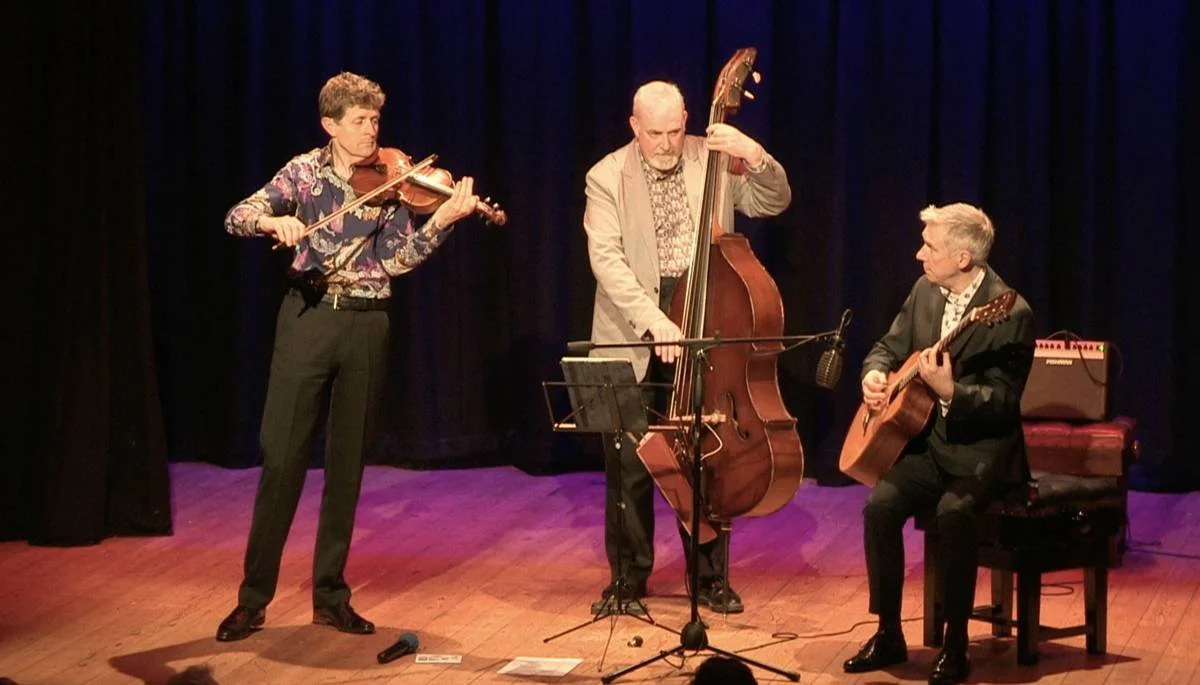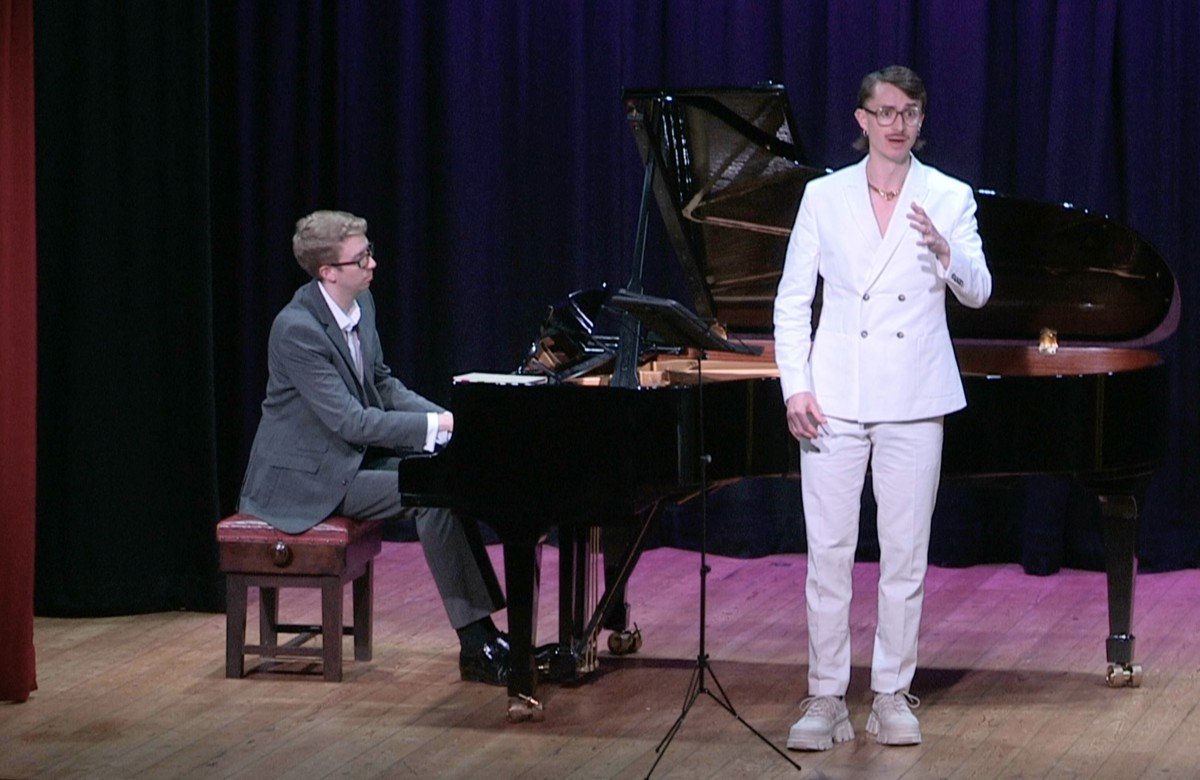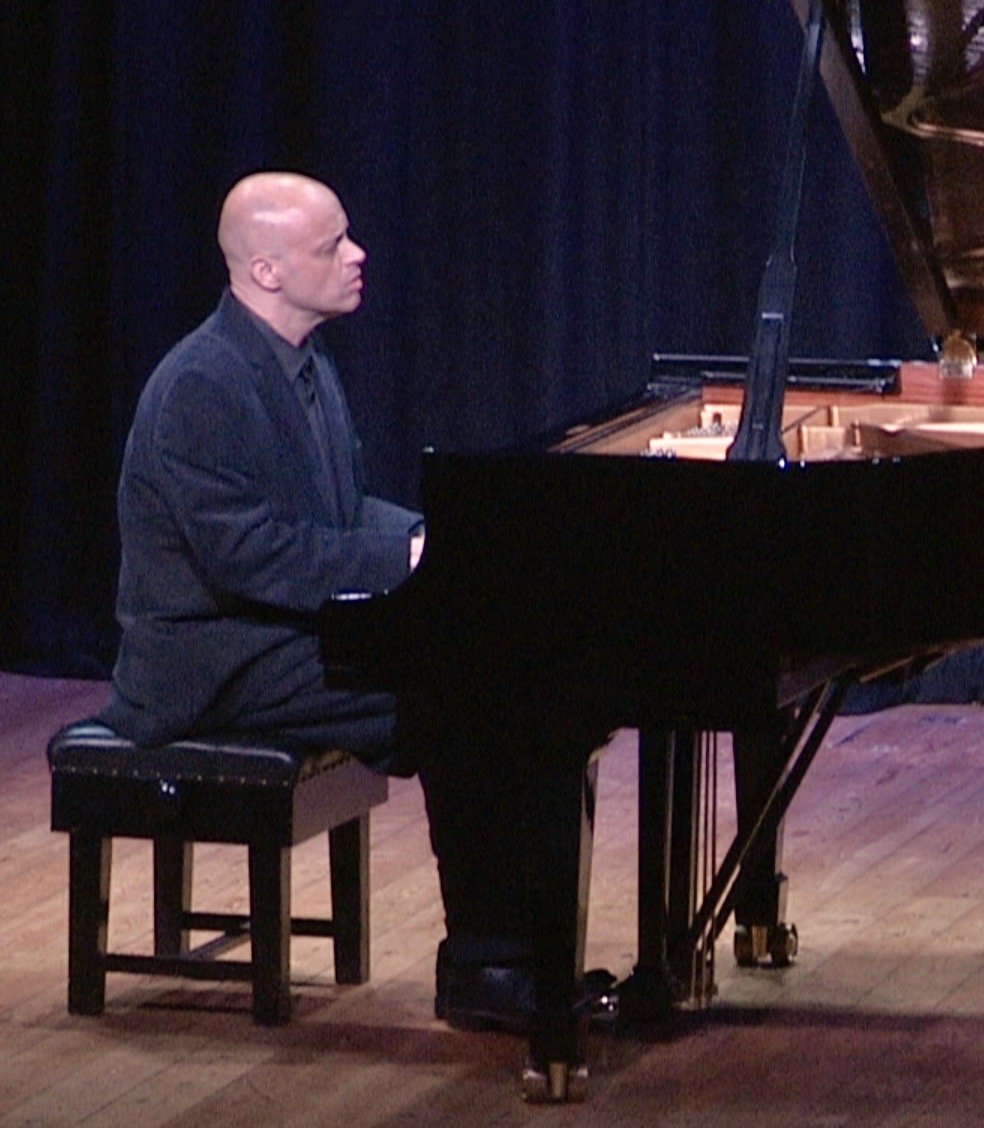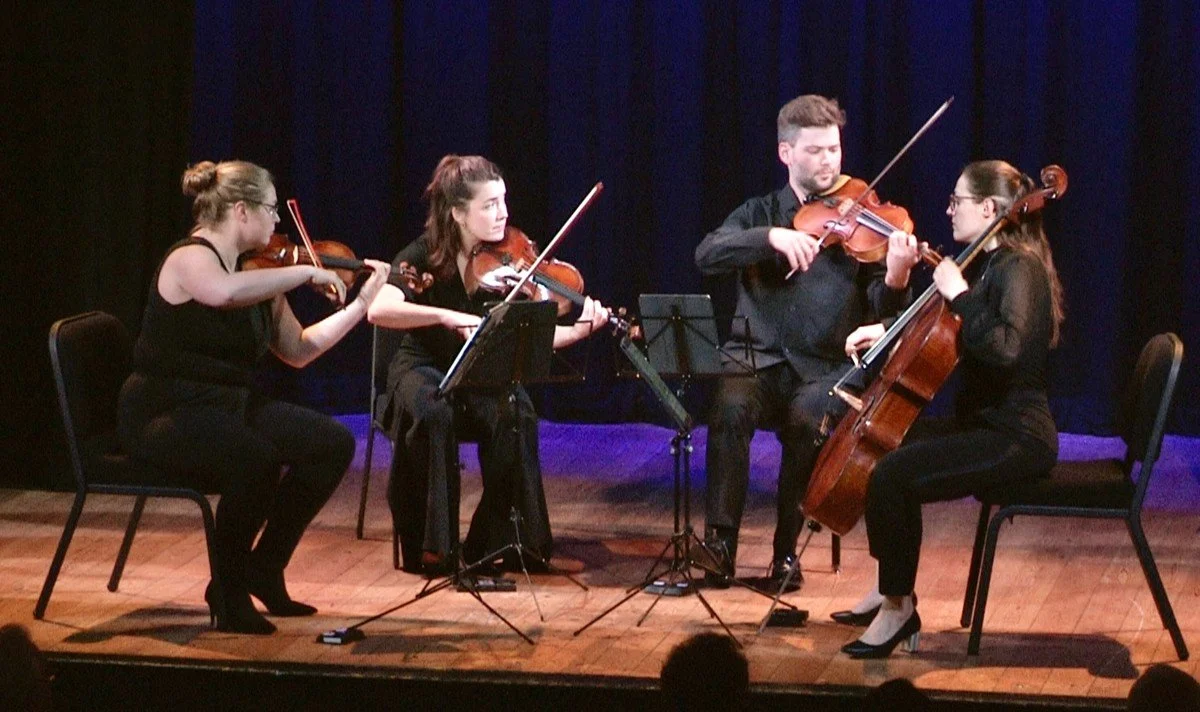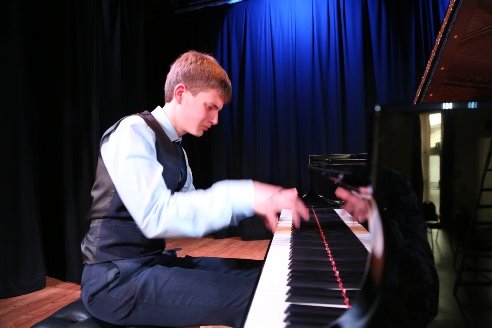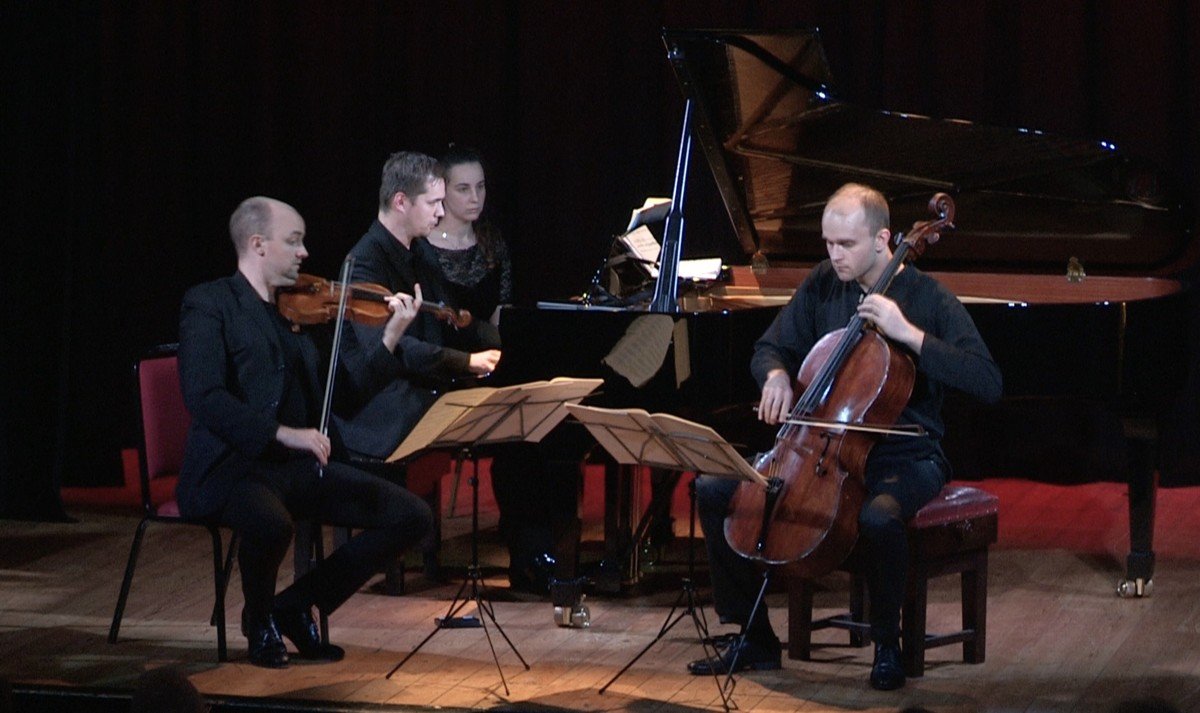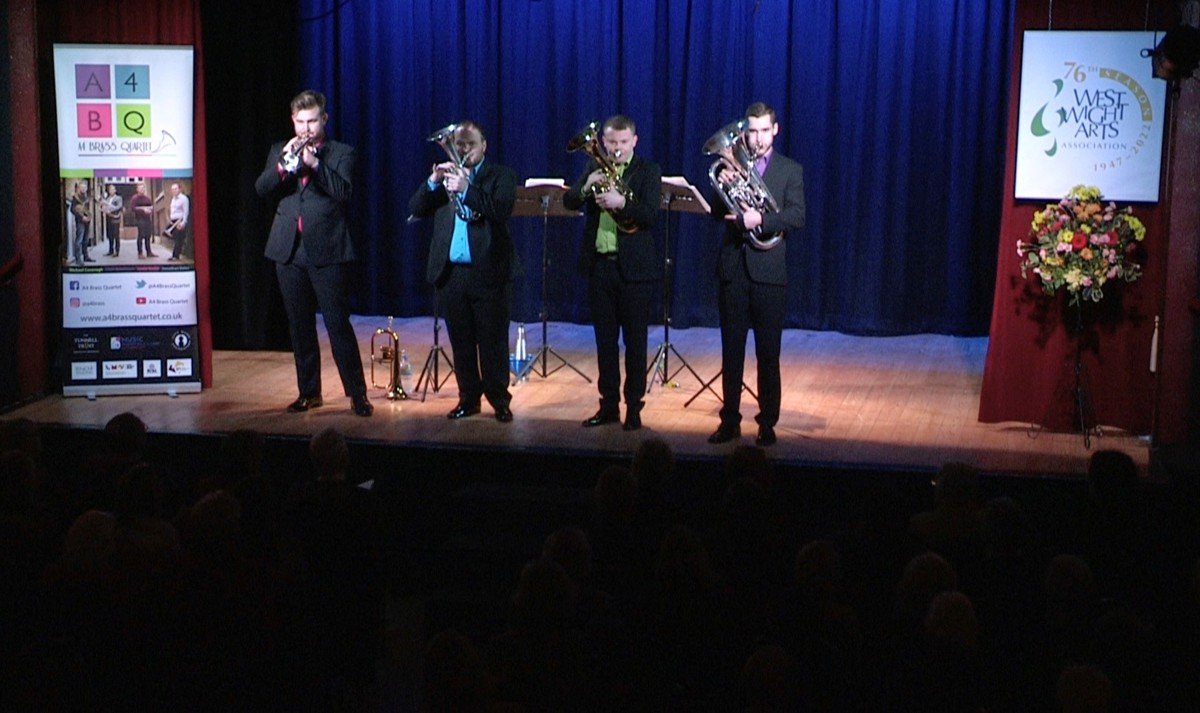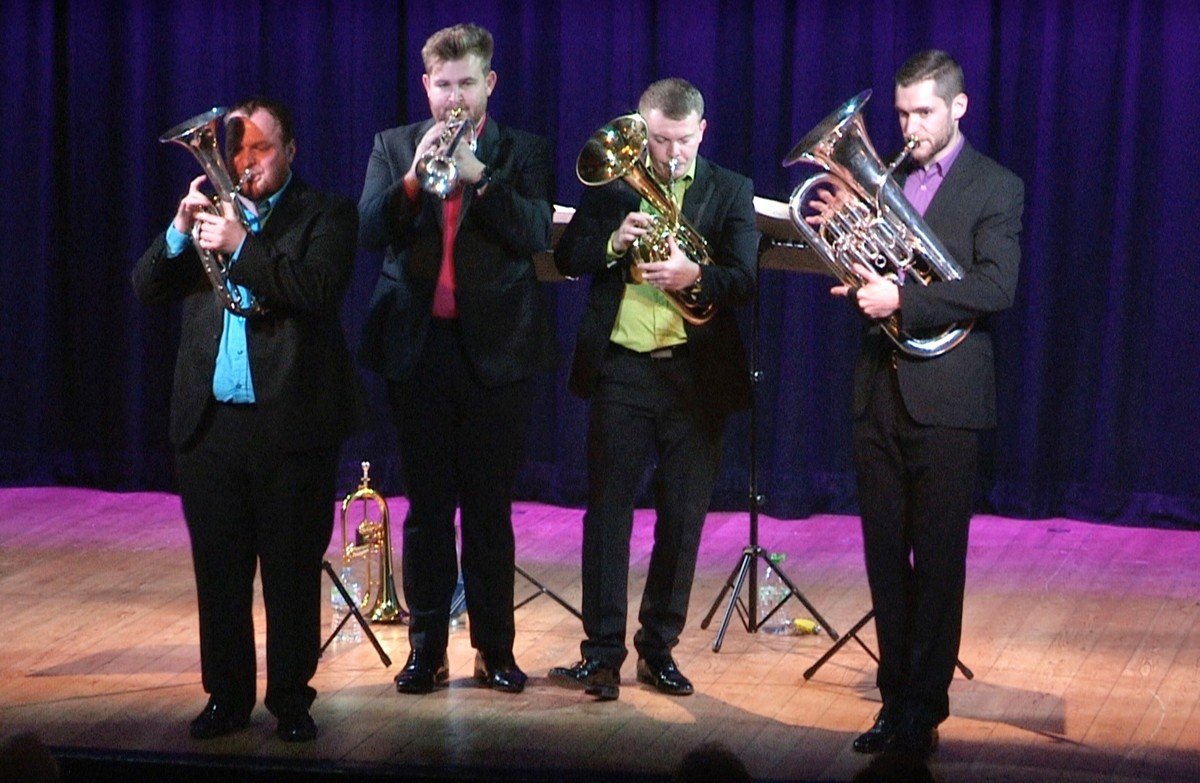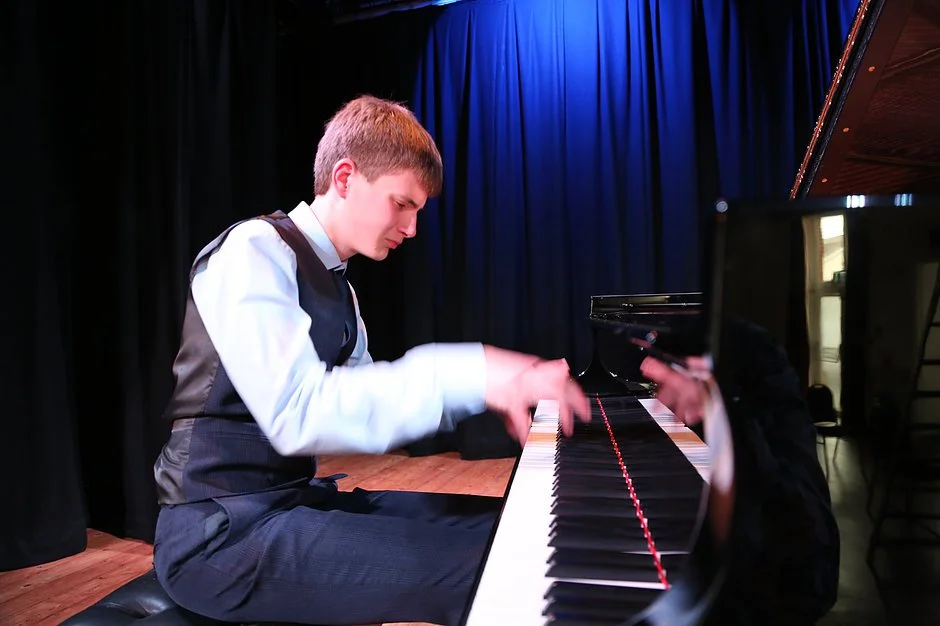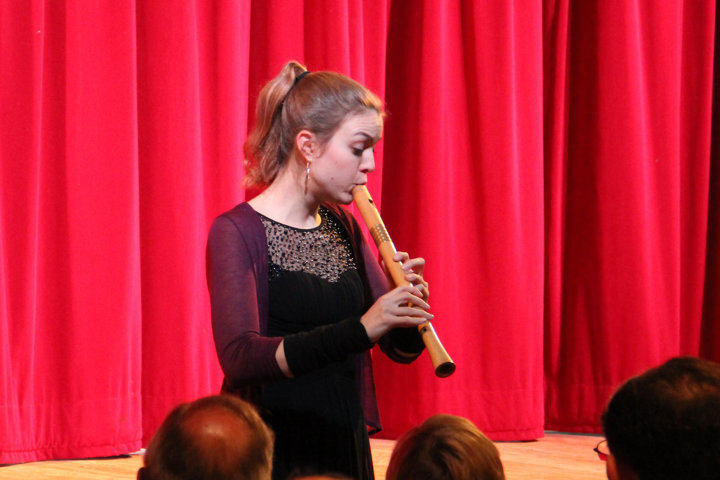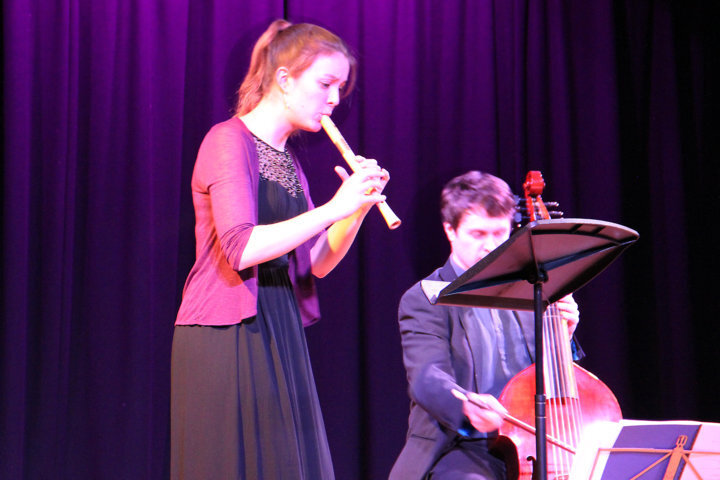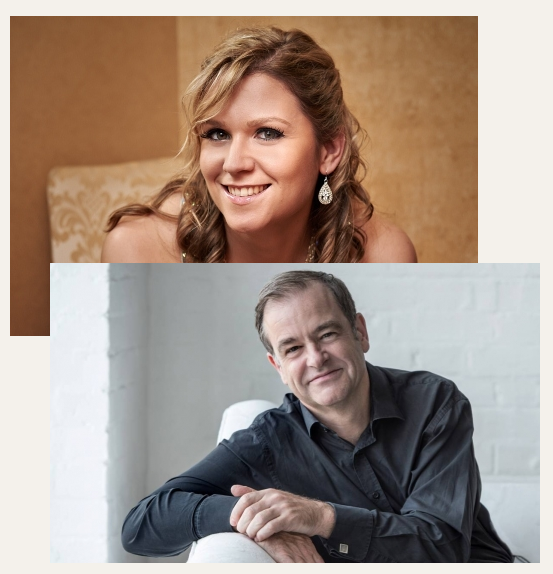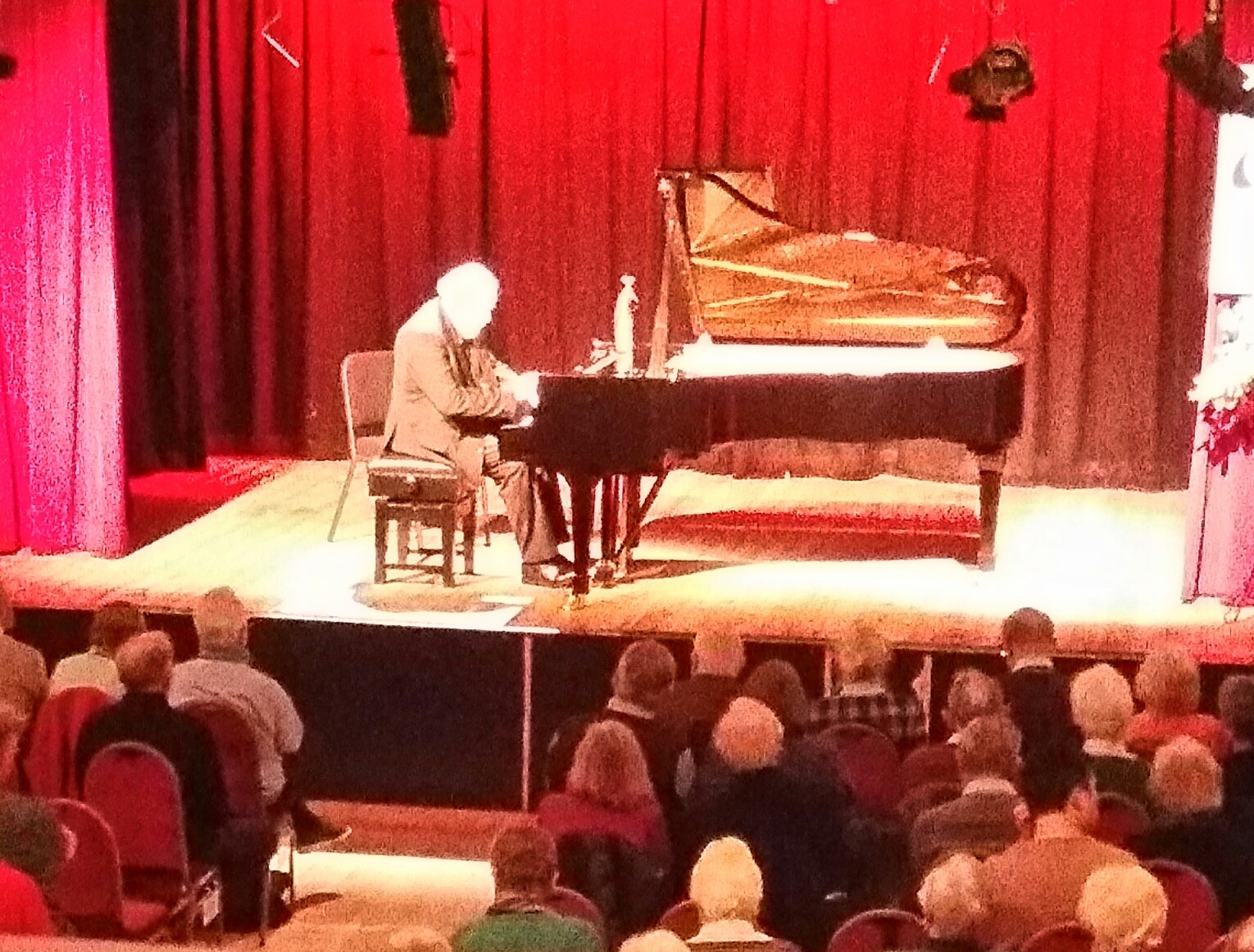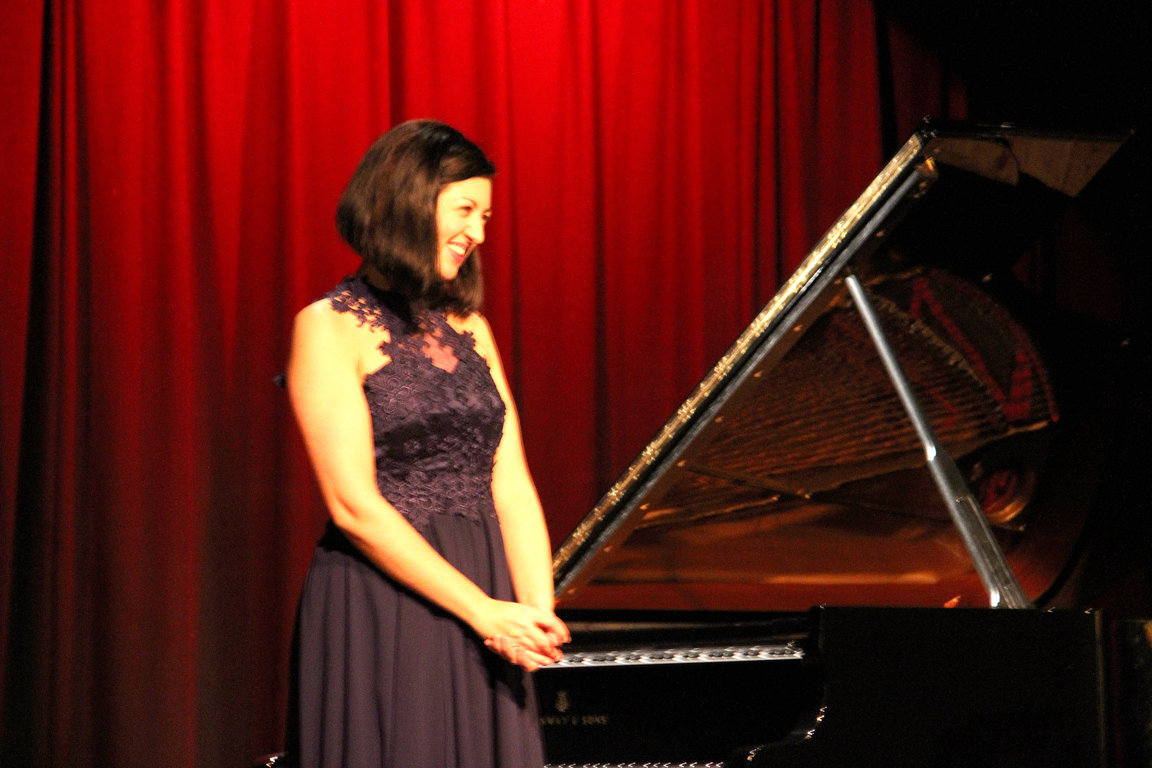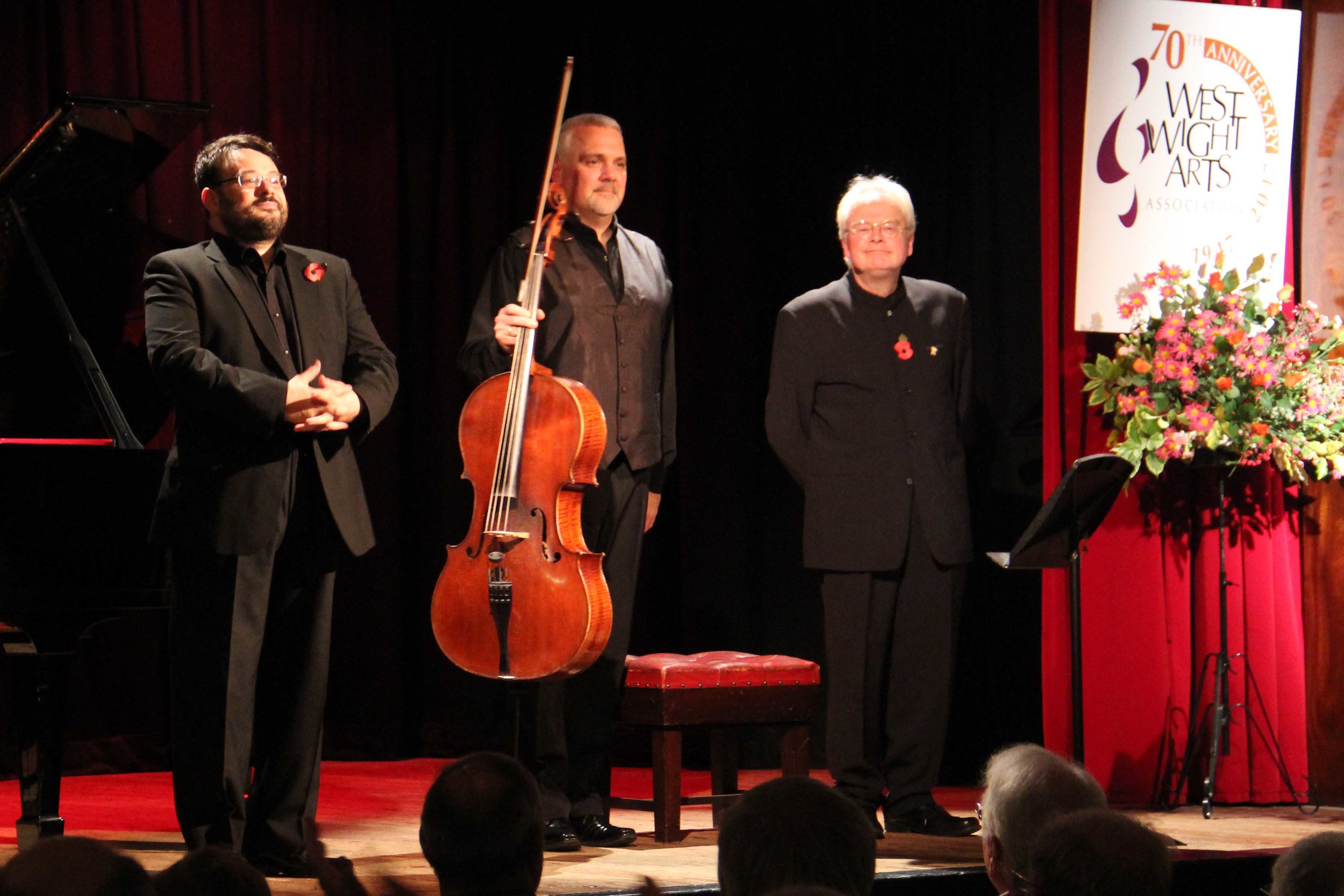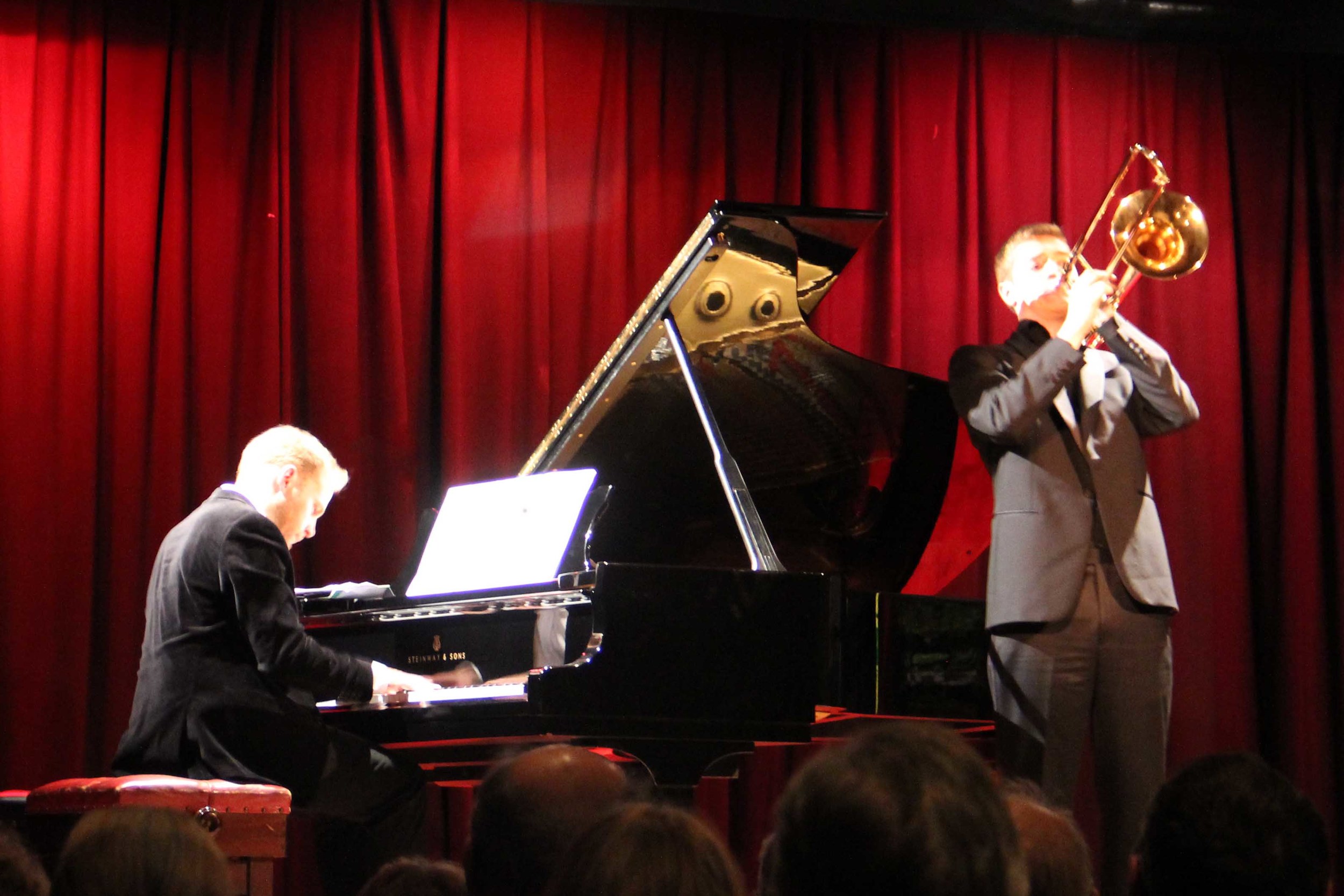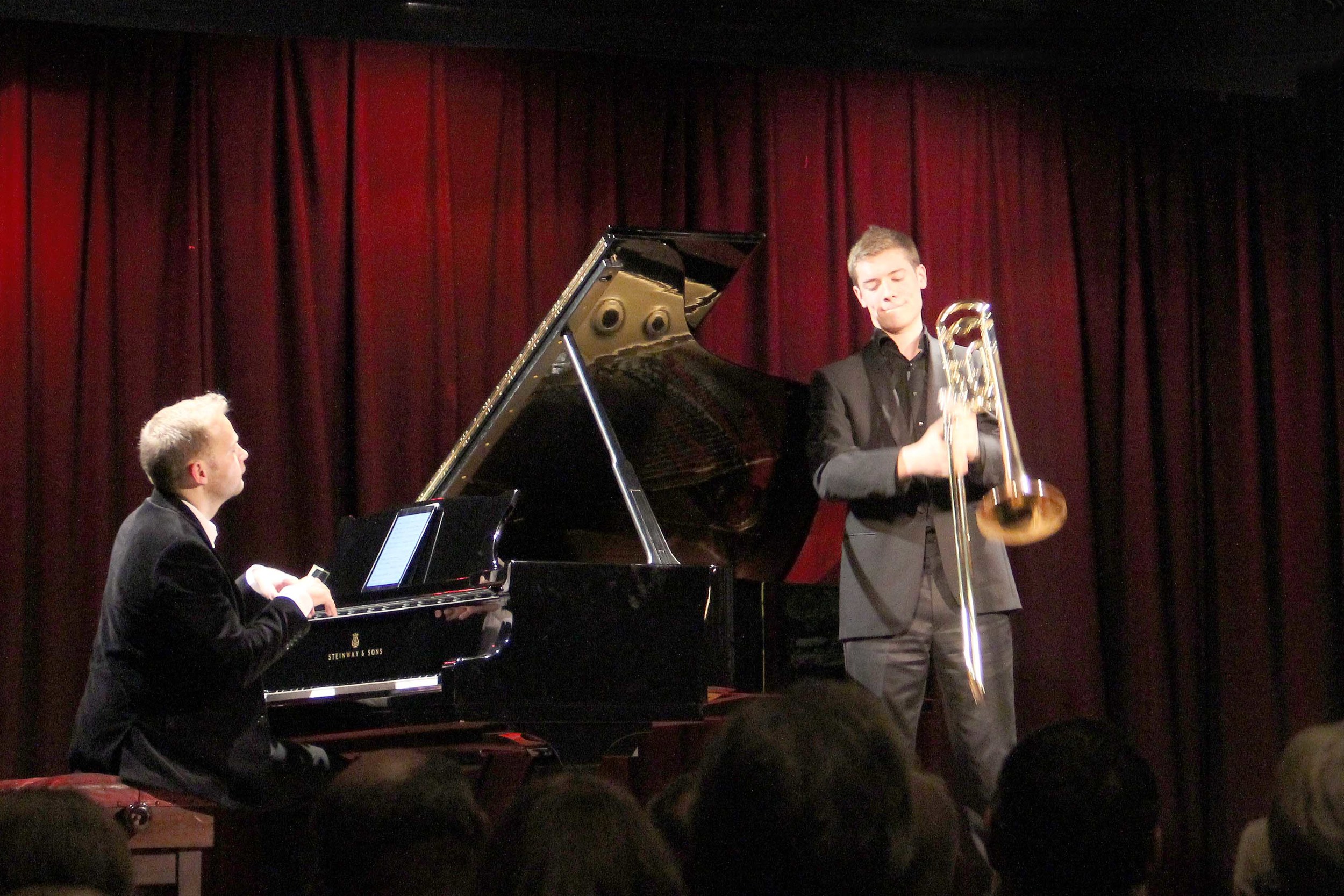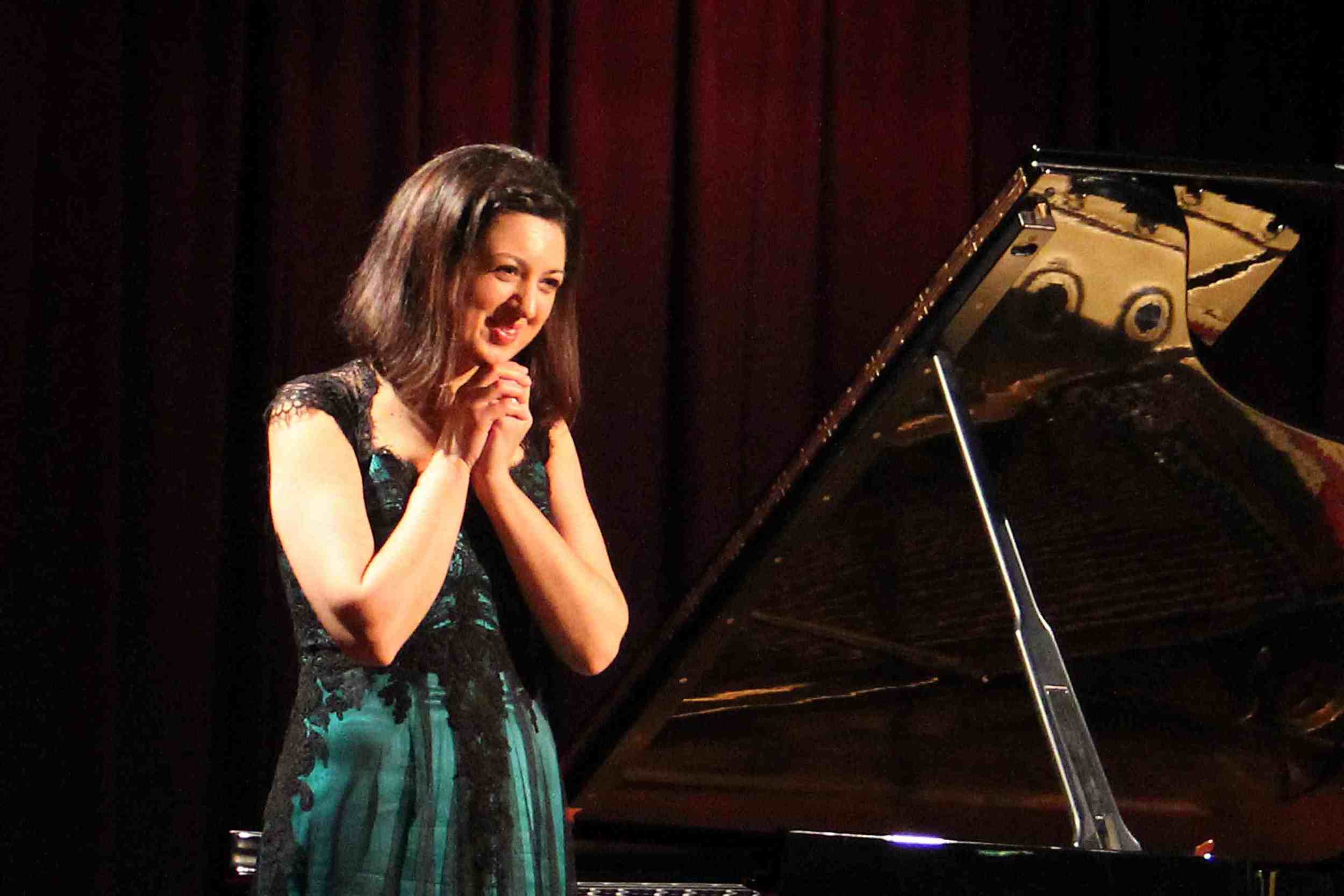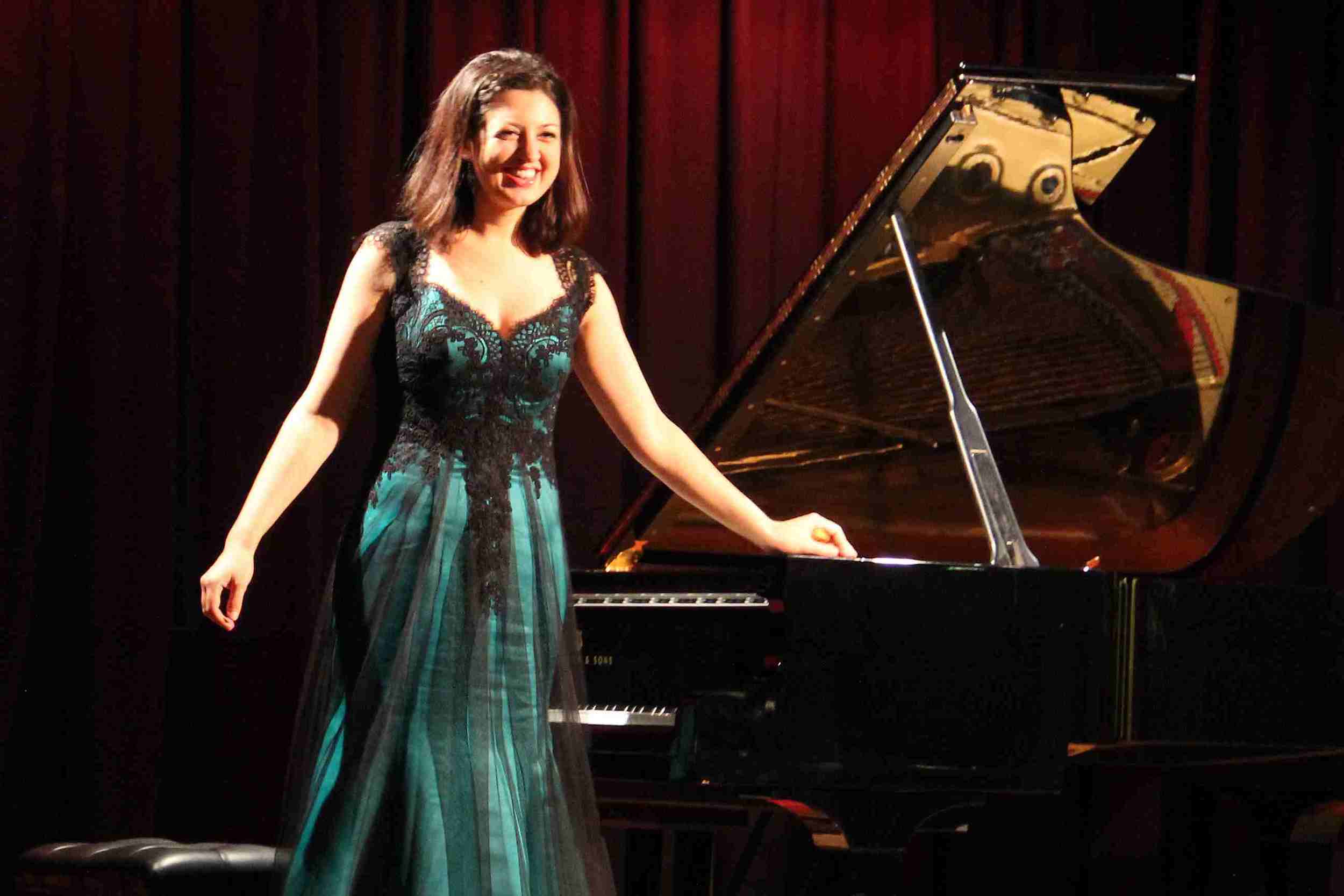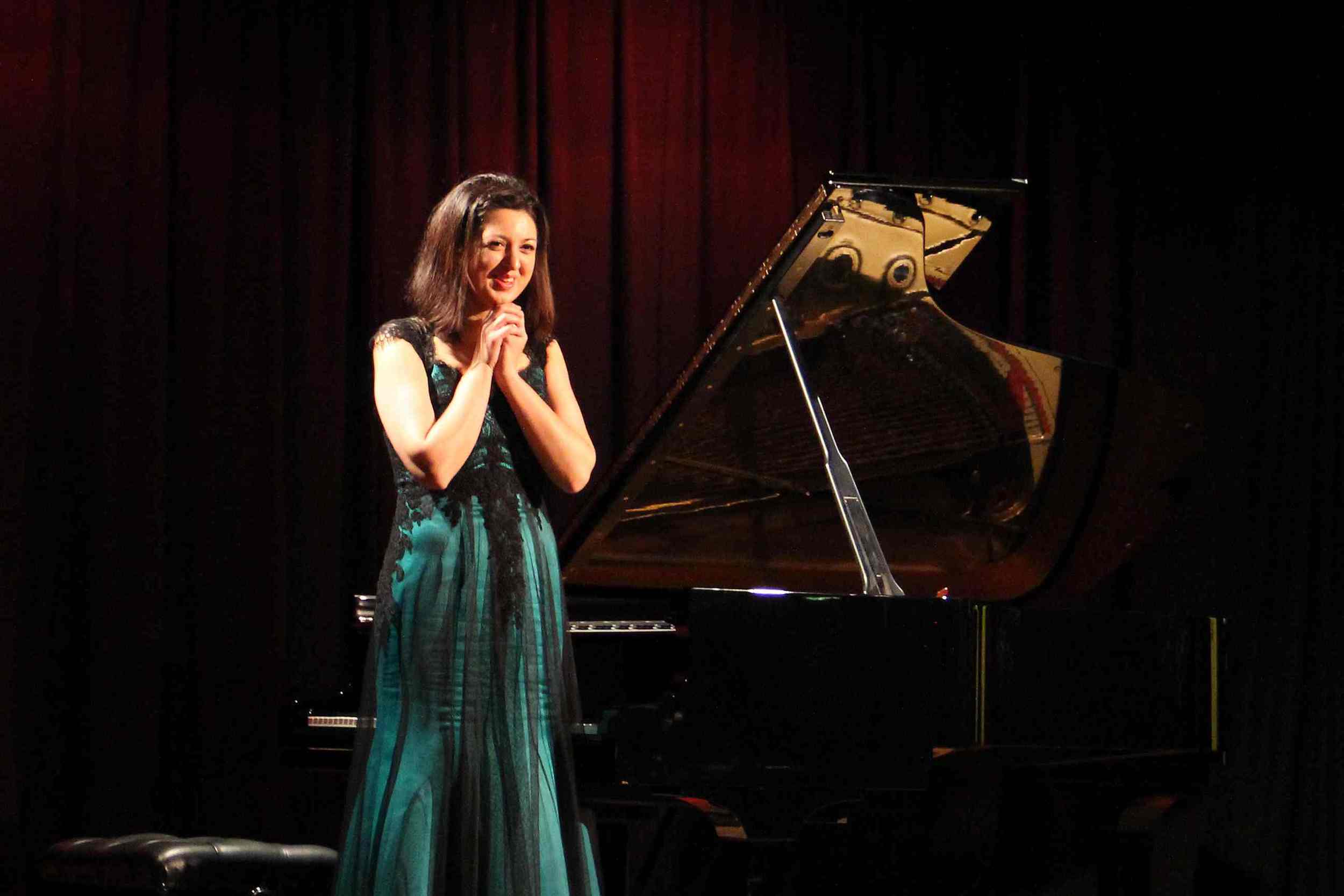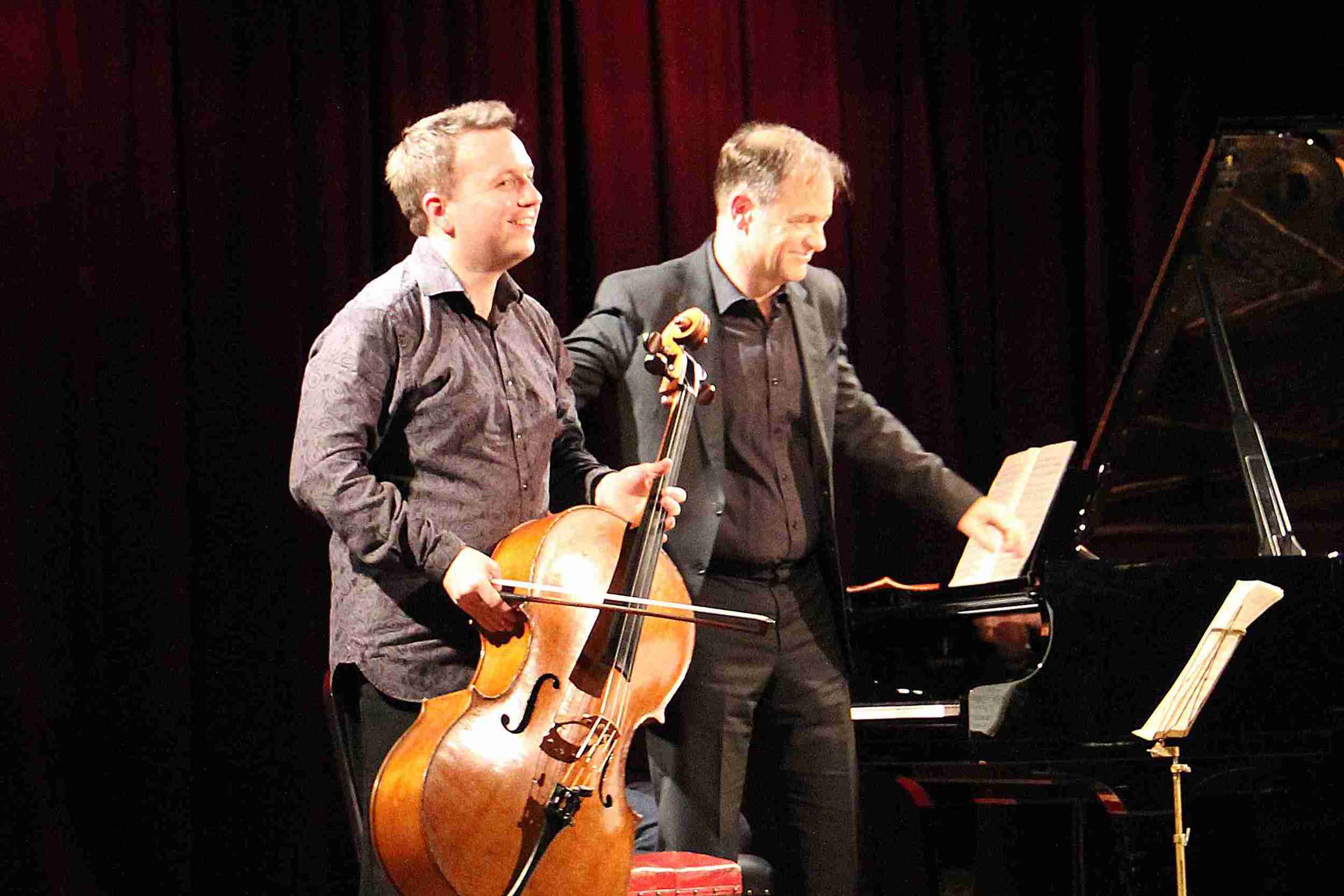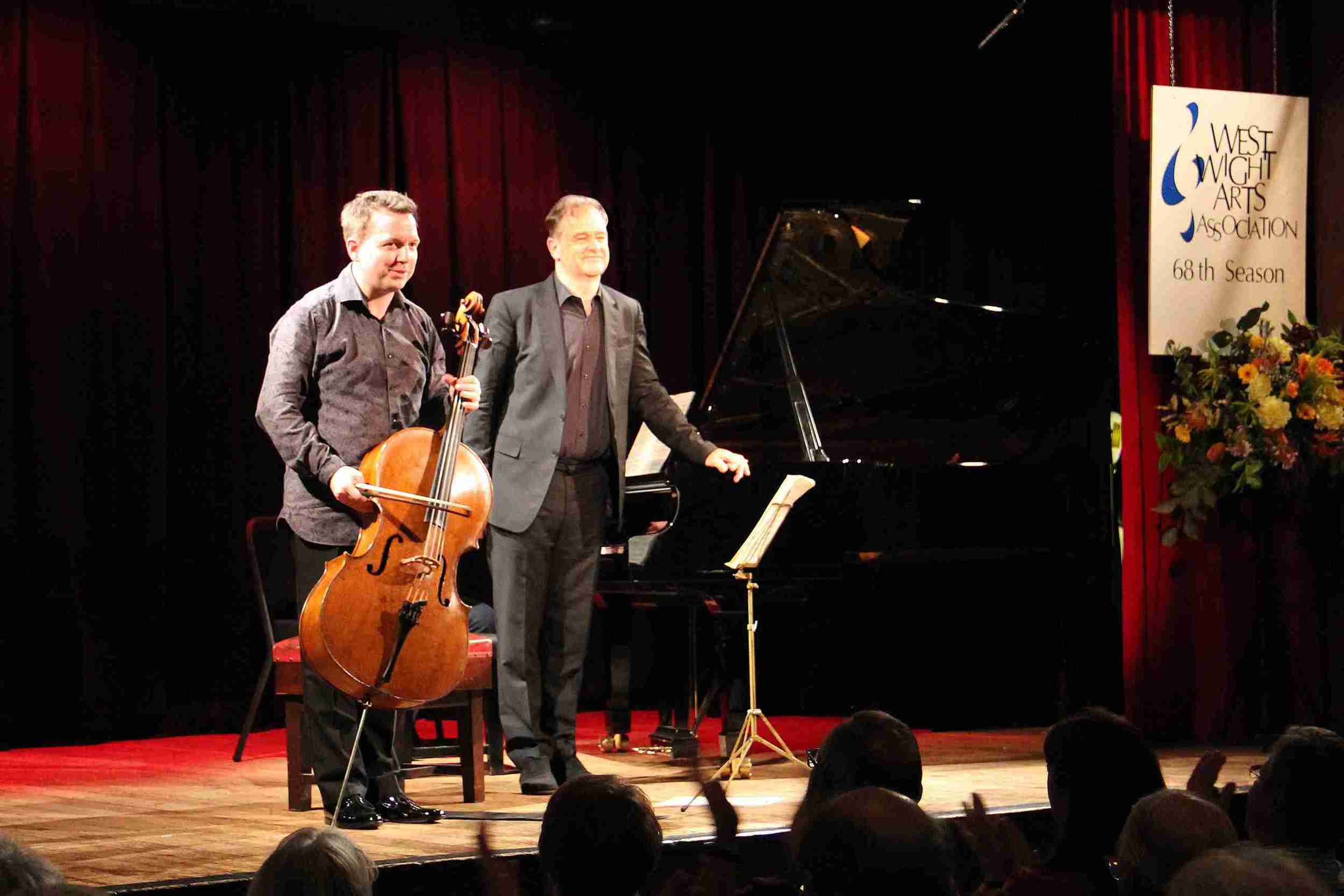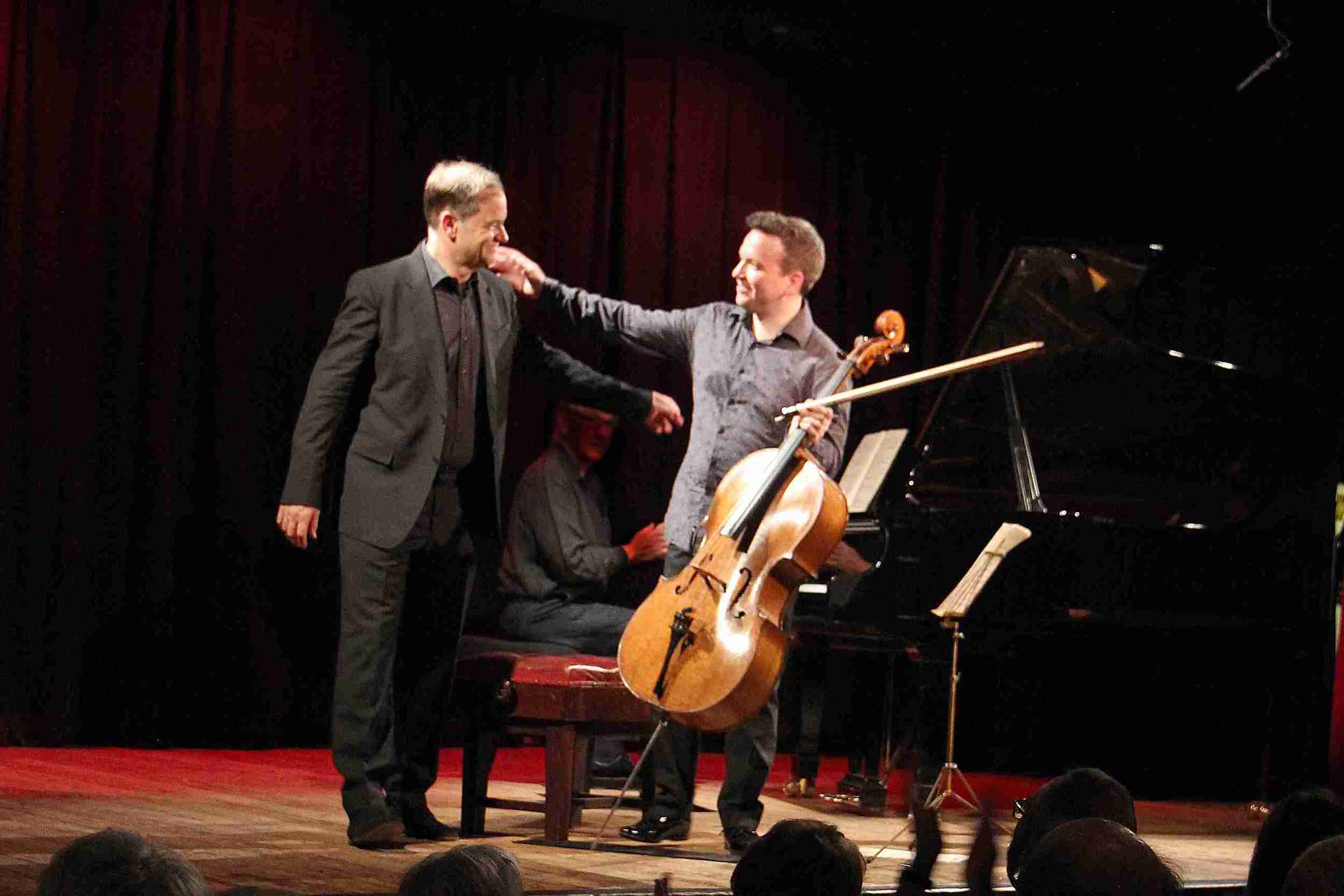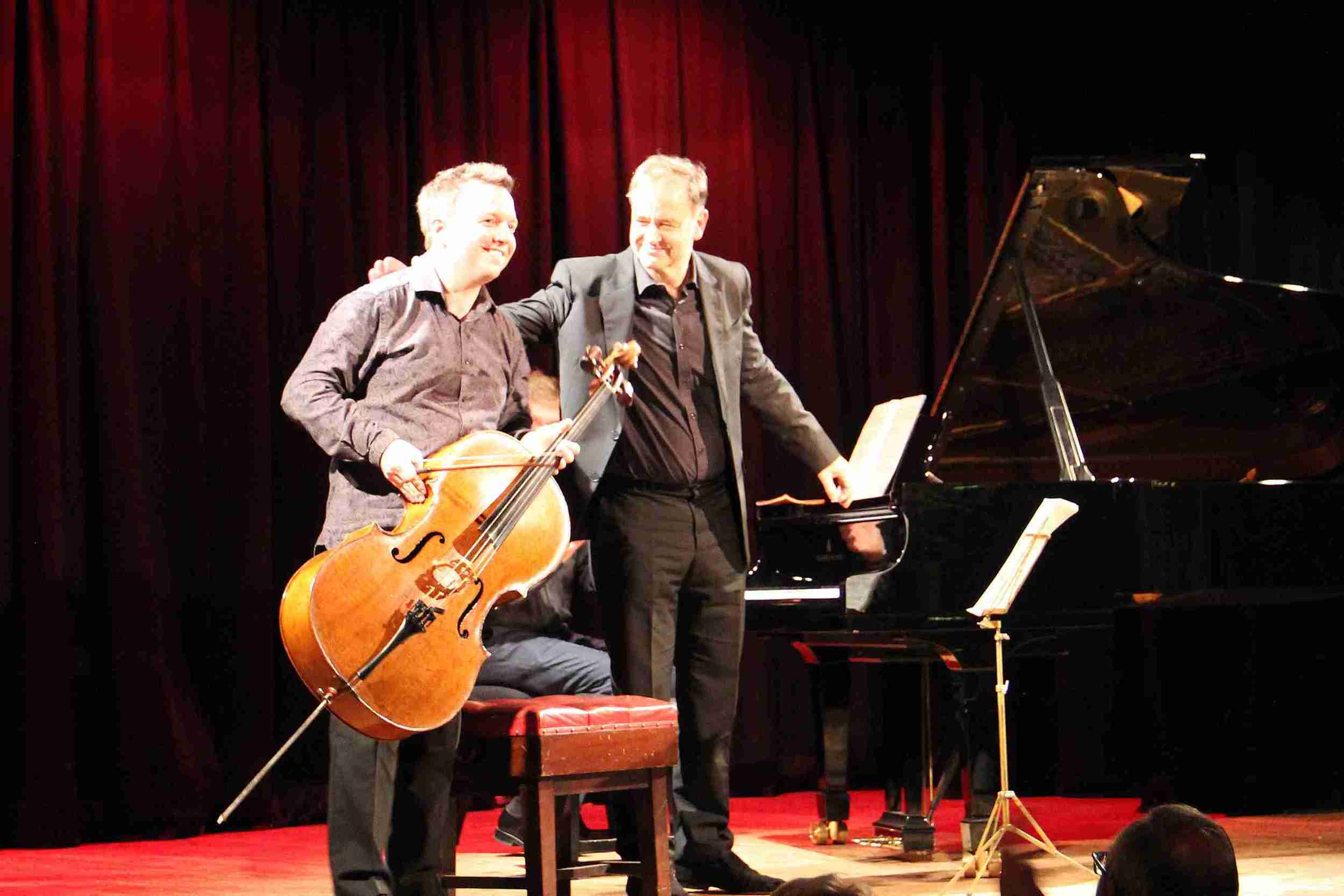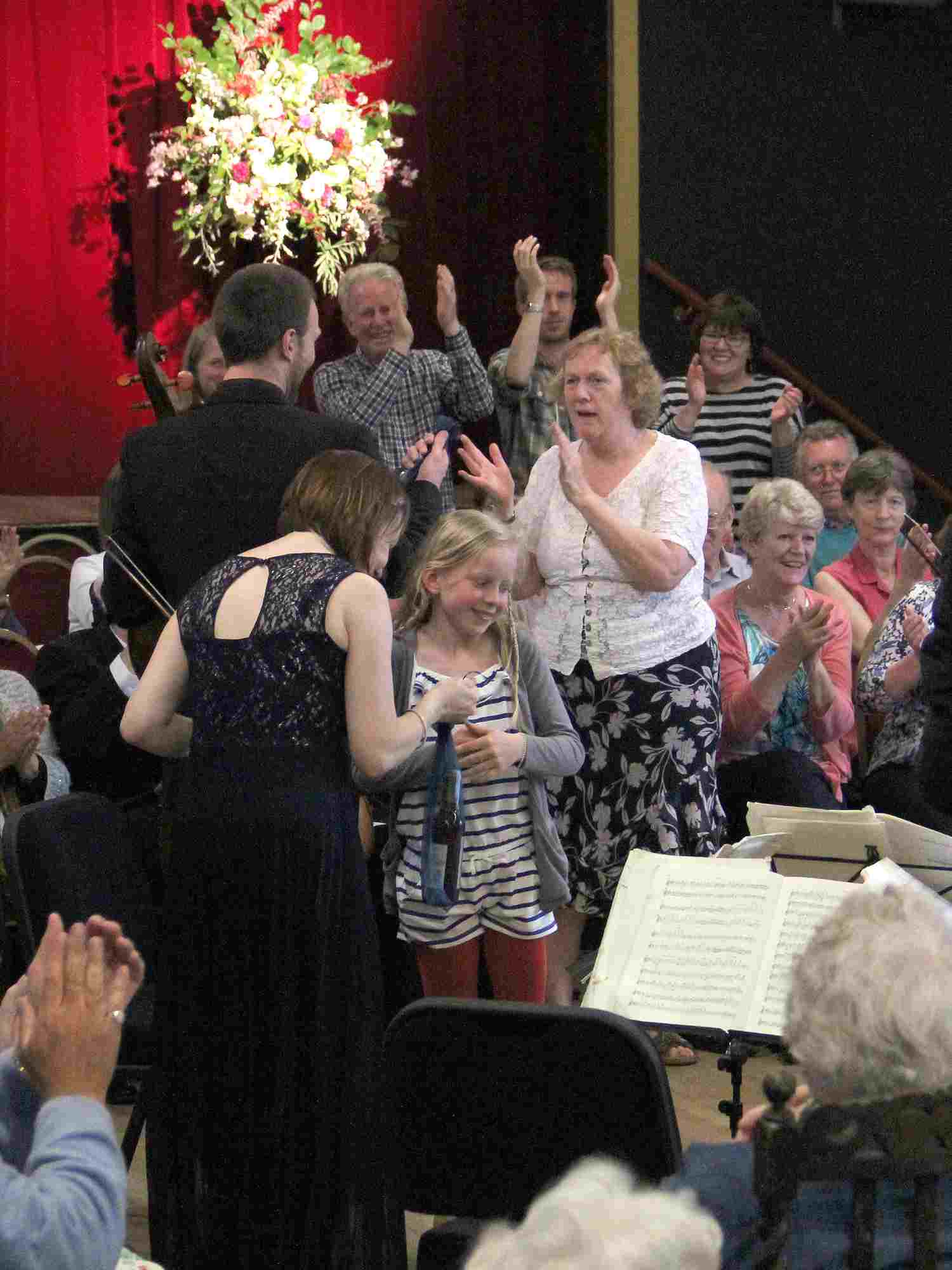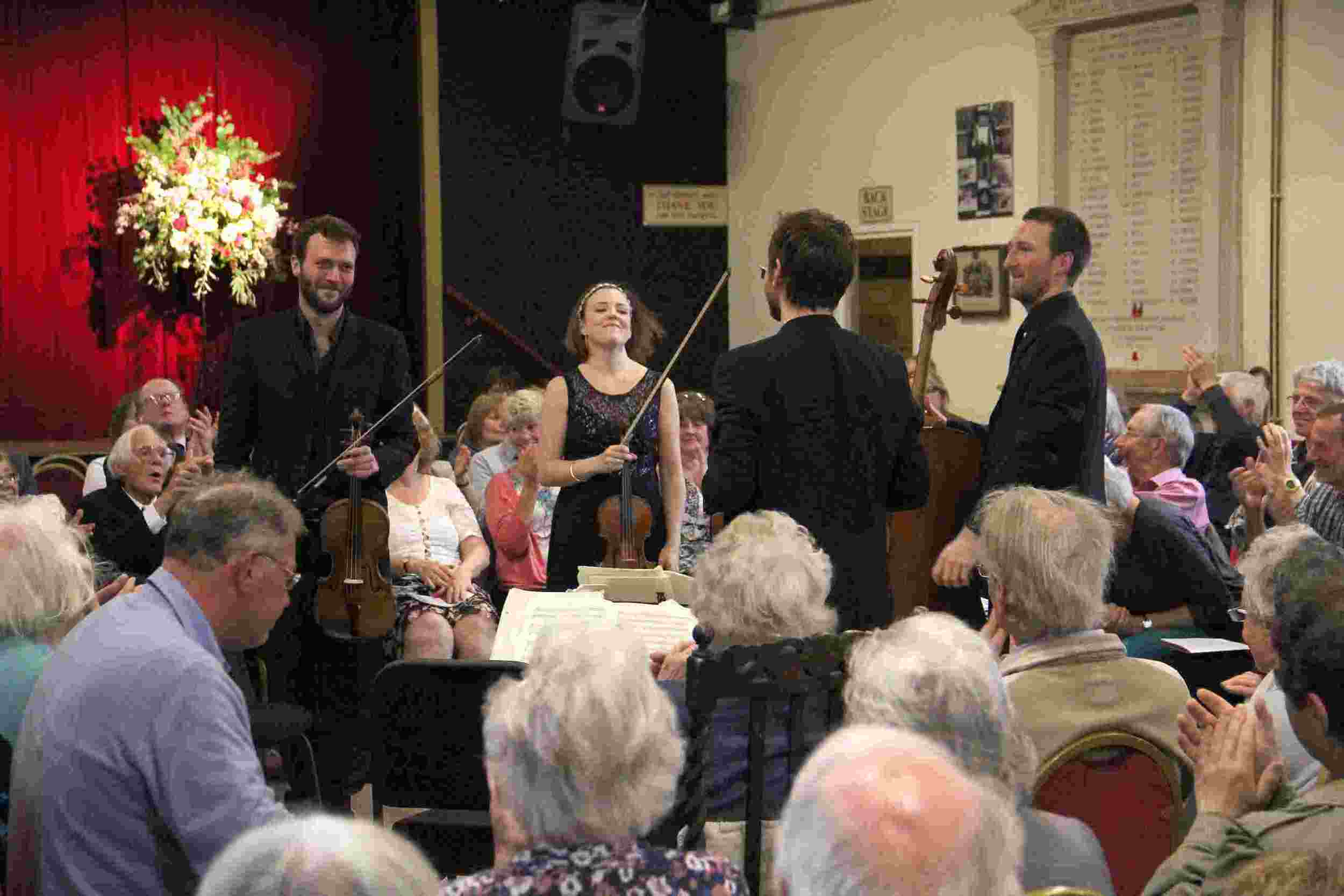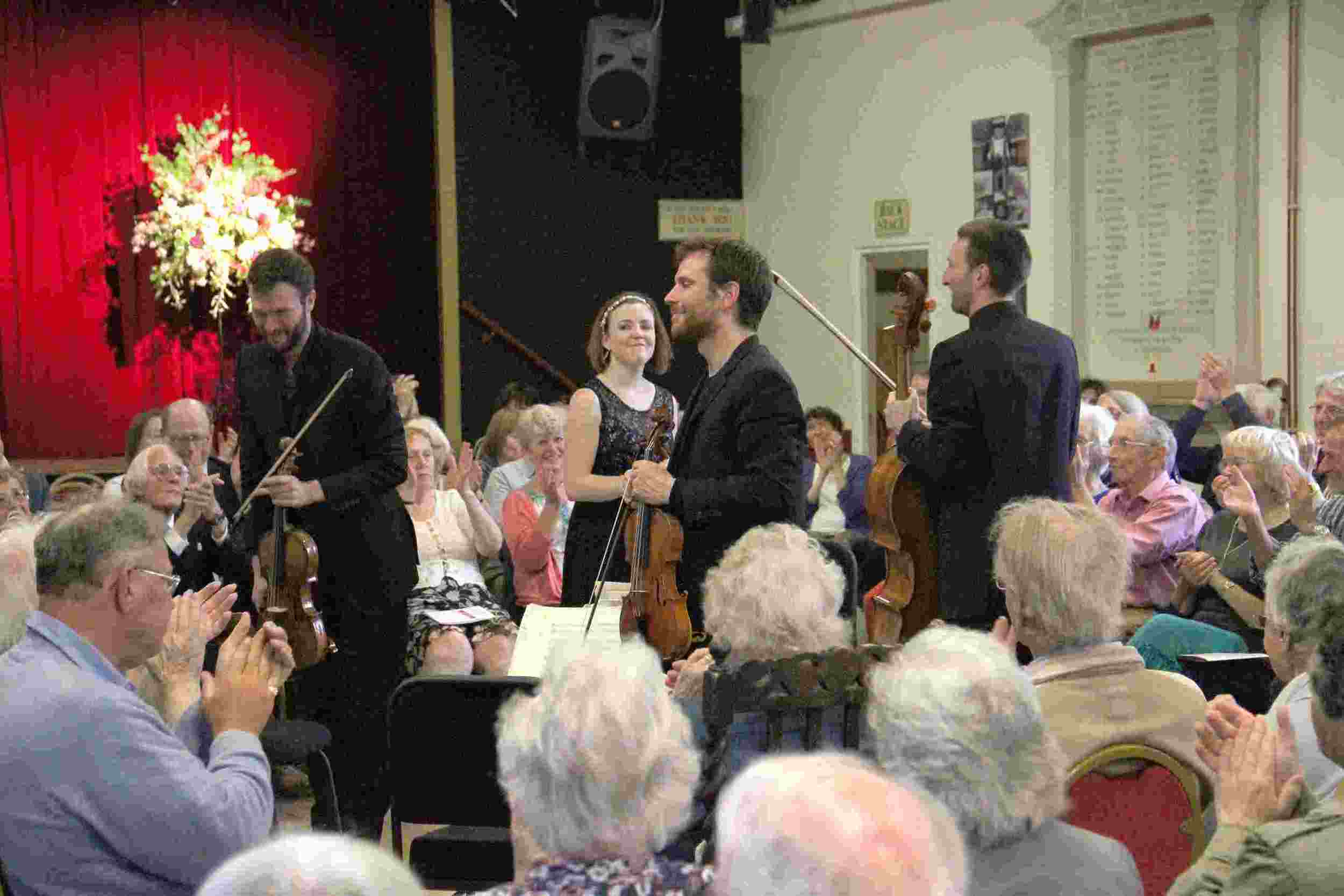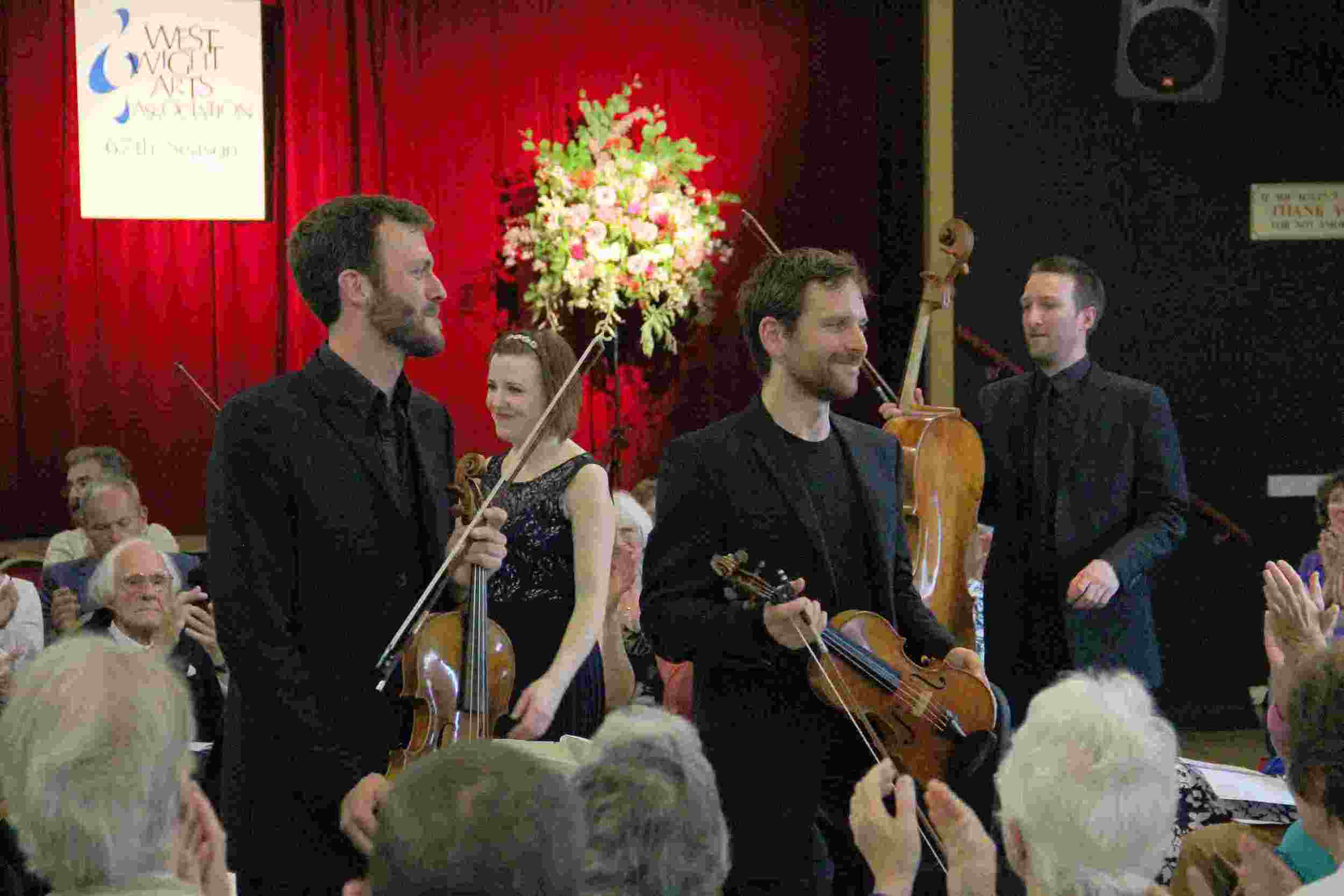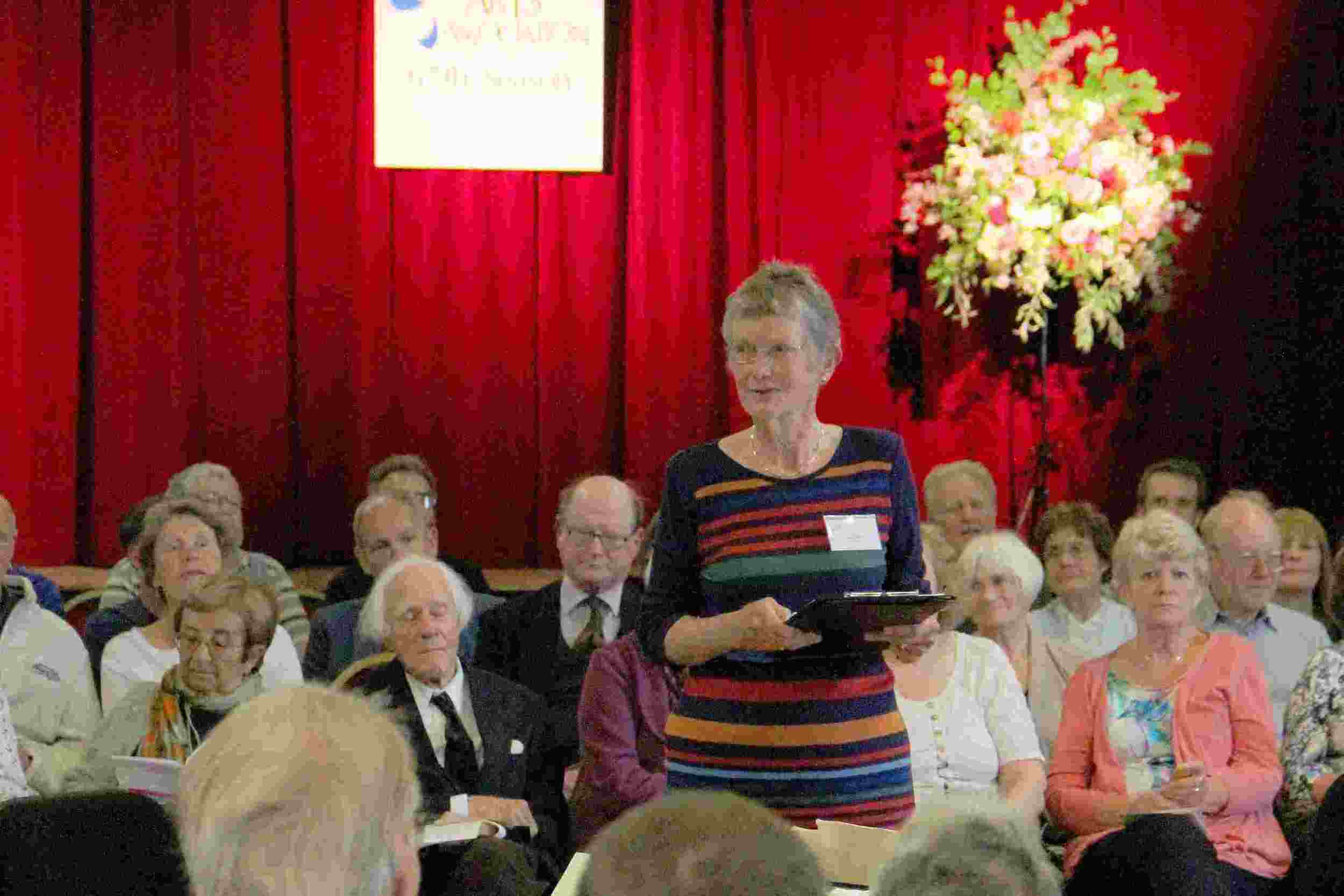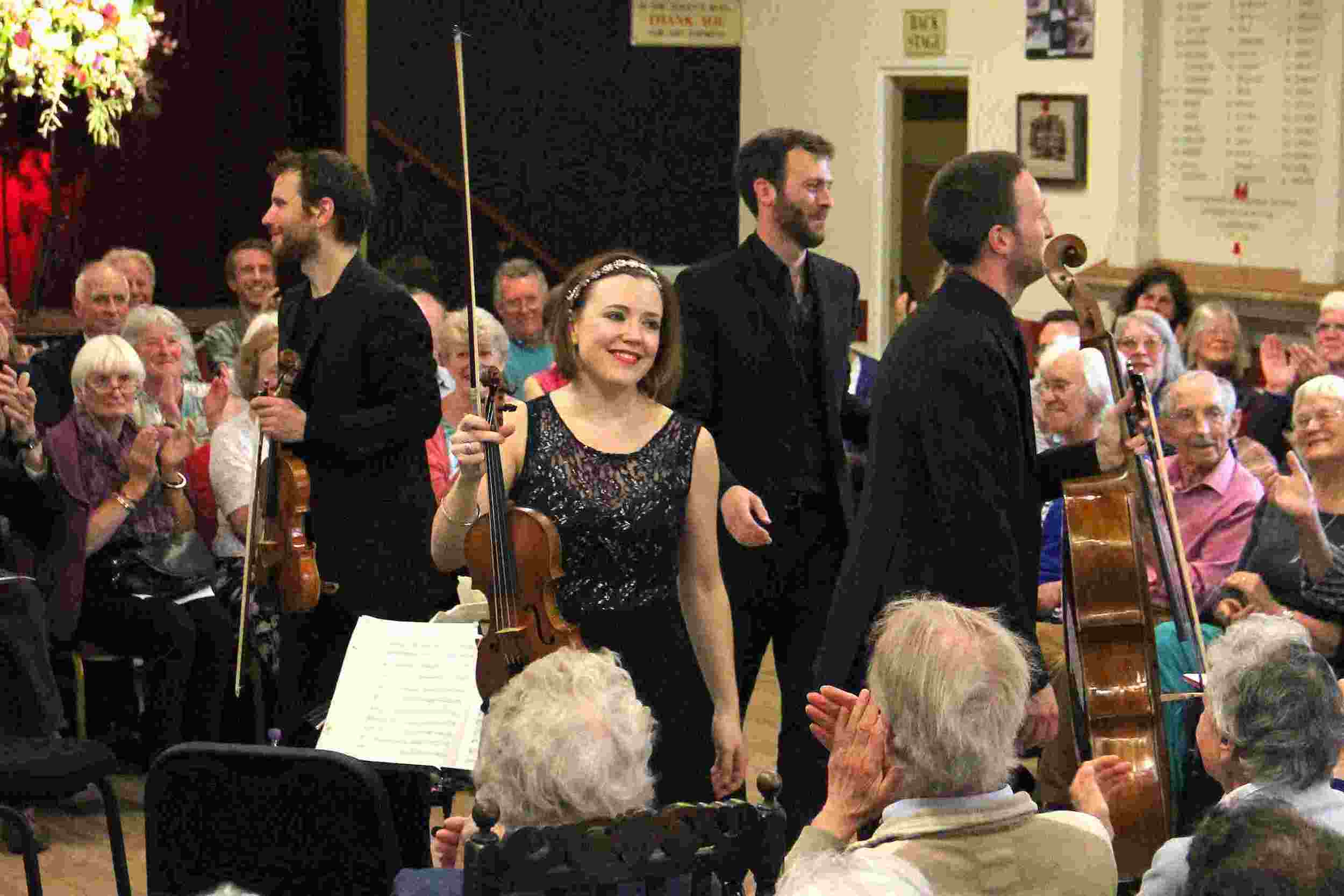West Wight Arts Association - Concert Reviews
Thomas Luke - April 2025
It would be hard to find a more fitting way to end the West Wight Arts Association 2024-25 concert season on Saturday evening at Freshwater Memorial Hall than with a recital given by home-grown talent and recent international prize winner, pianist Thomas Luke.
In what was clearly a deeply personal choice of programming - including one of his own heartfelt compositions, “ All the things I’ve learnt without you “, Thomas began the evening by inviting the audience to enjoy interpreting the pieces and theme of the evening, ‘ Transcendence ,’ in their own individual way. He explained how he had taken four of J S Bach’s Preludes and Fugues from The Well Tempered Clavier and segued each one with a work from another composer which he considered to be an emotional match.
The first pairing was an innocently joyful marriage of BWV 854 in E major and Mendelssohn’s Song Without Words, op 19, no 1, which Thomas followed with a sensitive performance of Schumann’s “ Gesange der Fruhe “, before the second two-piece offering, BWV 849 in C sharp minor and Beethoven’s Sonata op 109. As with all four Bach Preludes and Fugues, Thomas played with exquisite clarity, while his Beethoven interpretation shone with emotional intensity and commanding technique.
The two post-interval Bach pairings, BWV 872 and BWV 878 gave Thomas free reign to display a kaleidescope of colour and improvisational style with Lizst’s Transcendental Etude no 11, and to then round off the evening with the daring, challenging and technically demanding Scriabin Sonata no 5.
A transcendental night to remember and cherish.
Finn Mannion and Ke Ma - March 2025
The spotlight was centred firmly on the cello and piano duo of Finn Mannion and Ke Ma at the penultimate concert of the West Wight Arts Association’s season on Saturday evening at Freshwater Memorial Hall. Although previously known to Isle of Wight audiences individually, it was a delight to hear them play together as an accomplished and seasoned musical pairing.
Unashamed romanticism interspersed with a touch of jollity was on the programme’s agenda as cellist Finn introduced the first half of the concert as a “ Schumann Sandwich “ . He clearly relished playing the soulful 3 Romances and Fantasiestucke with his perfectly formed sweet sound, whilst in between sharing some light-hearted infectious fun with the “ filling “, namely Beethoven”s Variations on “Bei Mannern welche Liebe Fuhlen.
More romance followed in the second half with Poulenc’s wistful ‘ Souvenirs ‘, which preceded a little taste of Iberian style in the Intermezzo by Granados - all played with the same, almost yearning sound which characterised Finn’s beautiful cello tone.
Then to the final piece of the evening, and the only work specifically written for the cello, Poulenc’s Sonata, FP 143. Not only did it give a chance to show off the cello’s more technical challenges, but it also gave the piano equal status in terms of tune- sharing and dynamic matching, which pianist Ke Ma executed flawlessly. It was a mellow evening of music making, in the safe hands of two sublime musicians.
Fibonacci string quartet - February 2025
Following the last two impeccable concerts from much- loved returning artists, it was time for West Wight Arts Association to welcome some newcomers to Freshwater Memorial Hall on Saturday evening, namely the Fibonacci string quartet.
With their youthful enthusiasm and seemingly endless energy, these award-winning musicians opened the concert with Haydn’s “ Sunrise “ quartet, opus 76, instantly transporting the audience away from the gloomy weather outside and into a happy world of beautifully crafted, yet light hearted playing, totally befitting Haydn’s style of composition.
An interesting introduction from violinist Krystof Kohout preceded the second work of the evening, Smetana’s quartet in Eminor. Krystof explained that the composer wrote this piece as an attempt to look back over his life, and here the players adopted a more contemplative style throughout the four movements, but equally with passion, joy and deep emotion as and when required. The dynamic range that they were able to muster in order to illustrate Smetana’s thoughts should be particularly mentioned as truly outstanding.
The mighty Beethoven quartet, op 131, took up the whole of the second half of the concert. Cellist Findlay Spence described it as a “Journey” for its players, given that all 7 movements are played without pause. Written after Beethoven had become profoundly deaf, the music makes huge demands of the musicians in terms of dynamic contrasts, emotional cohesion as a quartet and physical energy, to name but a few. The Fibonacci quartet rose to all these challenges as an outstanding group of players whose emotional connections as an ensemble was nigh-on perfect. We look forward to their return visit in April 2026 with great anticipation.
Giuseppe Guarrera - January 2025
There was another welcome return at last Saturday’s West Wight Arts concert by the young Italian pianist, Giuseppe Guarrera. It is almost impossible to find enough superlatives for his playing. His technique is so flawless and assured that he needs it only as a basis to then produce magnificent interpretative music of clarity, authority, sensitivity and panache.
His repertoire was epic ranging from Scarlatti to Liszt via Beethoven and Wagner. The stars must have aligned in the year 1685 as it was the birth year of Bach, Handel and Domenico Scarlatti. Giuseppe chose two of the 555 sonatas of Scarlatti and immediately showed both his technique and ability to play with speed and delicacy and also poignancy. He then played Handel’s Suite in F major which requires every pianistic dynamic.
His programme then moved on to even more dramatic and challenging works. First, Beethoven’s sonata Les Adieux written for his sponsor, friend and pupil Archduke Rudolph which moves from slow and introspective to very fast with lots of turns and trills. Another bravura performance by Giuseppe; the demands of his playing never seem to make him grow tired but instead they drive him on.
Schumann’s Phantasiestucke was next. This composer was a true romantic and his works require every ounce of technique available to the pianist. It is in eight pieces and although Schumann never saw it as a set it was fascinating to hear it as a whole. Giuseppe’s last two pieces were phenomenal. First Liszt’s transcription of his son in law Wagner’s Isoldes Liebestod. This was composed as a mighty orchestral work but under this pianist’s hands it lost none of its might or drama and only the truly virtuosic should attempt it. He concluded his concert with Liszt’s Mephisto Waltz No 1 and what an ending. Speed, drama, delicacy and every dynamic the piano could produce. It was a privilege to hear this artist.
A4 Brass - December 2024
It has almost become a tradition at West Wight Arts that if it is December it must be A4 Brass. They were eagerly awaited last Saturday and did not disappoint.
They are four consummate musicians who also have the gift of engaging the audience and being very amusing. They comprise principal players from some of the UK’s top brass bands, including Grimethorpe Colliery and Brighouse & Rastrick. The composition is Jamie Smith on cornet and flugelhorn, Jonathan Bates on tenor horn who also arranges many of the works they play, Michael Cavanagh on baritone horn and Chris Robertson on euphonium. They also have a serious and admirable side in that they play in hospitals and care homes as well as concert halls.
A full orchestra would undoubtedly describe the overture to Bernstein’s Candide as difficult but A4 gave a stunning rendition. Their close relationship and years of playing as one allows each performer to shine but never overpowering the others. Their long list of repertoire included Evelyn Glennie’s A Little Prayer, Autumn Leaves arranged by Jonathan Bates, Percy Grainger’s Shepherd’s Hey and classical pieces by Bach, Mendelssohn and Elgar. It is rare that a euphonium takes centre stage but so it did with John Hartmann’s La Belle Americaine which Chris Robertson had also arranged. They make this into an even greater bravura performance by forcing the pace at which it must be played but never by sacrificing their musicality.
They also had a festive theme and played Away in a Manger and ‘Wight’ Christmas and did encores, much insisted on by the audience, of the William Tell overture and ended with We Wish You a Merry Christmas. The audience left looking forward to next December when they return again to the Island.
Trio Concept - November 2024
Anyone in search of some much-needed rays of Italian sunshine to alleviate the November gloom on Saturday evening would have found it in abundance at Freshwater Memorial Hall, when Trio Concept ( formerly known as Trio Chagall ) arrived to play at this month’s West Wight Arts Association concert.
With a programme consisting of three works which pianist Lorenzo Nguyen described as “ A Schumann Sandwich “, he went on to explain that the idea - or concept - was to link the pieces of two composers and great friends, Schumann and Mendelssohn.
The opening work, Schumann’s Fantasiestucke opus 88, gave a foresight into this Trio’s captivating way of communicating with each other, all three players seeming to have a sixth sense of what each other was thinking musically, no doubt a result of the twelve years that they have been playing together.
Mendelssohn’s Trio in D minor op49 provided the ‘ filling’ to this musical sandwich, with the Trio’s ceaseless energy carrying the audience along throughout, from the urgency of the first movement, the heartfelt emotion of the Andante, the skittish Scherzo to the uplifting Finale.
The second half of the concert was devoted to Schumann’s own Trio in D minor op 63, written largely as a homage to his friend Mendelssohn. As throughout the evening, the balance between the three members of this high-calibre ensemble worked perfectly. The soulful cello playing of Francesco Massimino, the sweet-to-steely versatility of violinist Edoardo Greco and the effortless fluidity of pianist Lorenzo Nguyen gave the audience an evening of polished chamber music to warm the collective heart.
Carducci String Quartet - October 2024
It would be something of a struggle to recall a more joyous and thrilling occasion than the one on Saturday night when the Carducci String Quartet arrived to play for the second concert of West Wight Arts Association’s current season at Freshwater Memorial Hall.
This distinguished and long-standing ensemble opted for a programme of music written by composers in their formative years which proved a winning combination; musicians with two decades of experience of playing together approaching the music with a freshness and youthful energy which the pieces required.
Mozart’s quartet in B flat “ The Hunt “ opened the concert, and one was soon struck by just how much the musicians themselves were enjoying playing together, giving the 1st movement in particular a happy, light-hearted feel, and the balance of all four instruments in the Adagio movement was exquisite.
The Quartet no 13 by Mendelssohn followed, after a brief but amusing introduction by the 1st violinist, Matthew Denton. He explained that Mendelssohn composed it aged just 18 and was essentially a musical outpouring of unrequited love. The resulting emotional and urgent melodies were given full flow by these four consummate musicians.
The second half of this memorable evening was devoted to the majestic Ravel String Quartet. Here, the quartet completely immersed themselves in the sumptuous, almost decadent harmonies with breath-taking pianissimos, perfectly balanced melody sharing and an exciting build up to the thrilling finale.
An enthralling evening from start to finish.
Anna Huntley, Peter Moore and Michael McHale - September 2024
There was a welcome return for the West Wight Arts Association concerts last Saturday and what an opener to the season! Three international solo artists came together as a trio, a rather unusual one being the singer Anna Huntley, the trombonist Peter Moore and the pianist Michael McHale. They performed a long list of pieces many of which had been composed for voice and horn but translated beautifully to voice and the almost human sound of the trombone together with the sensitive accompaniment of the piano.
They started with Schumann’s So wahr die Sonne scheinet which is an emotional duet that unites two voices in close harmony with here the trombone being the second voice. This piece evoked the steadfast commitment between Robert and Clara Schumann, a true tale of love.
Liszt transcribed Schumann’s Widmung, a wedding gift to Clara and retitled it Liebeslied and it is considered one of the greatest piano transcriptions. Michael McHale played this solo piano piece beautifully and showed what a gifted pianist he is.
There followed more songs performed by all three artists on the subject of love including Massenet’s Amours benis which tells the journey of love and Luigi Denza’s J’ai peur de l’aimer admirably capturing the fear of falling love.
They then moved into a lighter theme for the remainder of their recital. Firstly, the evergreen A Nightingale Sang in Berkeley Square and then Kurt Weill’s The Saga of Jenny which was just the piano and singer. This showcased Anna Huntley’s marvellous acting ability as well as her beautiful, rich mellow voice and her humour.
Then it was Peter Moore’s turn to display his incredible technique and to dazzle the audience with Arthur Pryor’s Fantastic Polka.
They ended their concert with Eric Street’s Tonight I Can Fly but then gave a wonderful encore of the Irish folk tune The Lark in the Clear Air which was so moving and left the audience in contemplative mood for their journey home.
Piatti Quartet & Thomas Luke - May 2024
A programme of music ranging from contemporary composer Charlotte Harding, an emotionally-charged Mendelssohn to a Dvorak masterpiece was how the Piatti Quartet entertained the audience on Saturday evening at Freshwater Memorial Hall for the final concert of West Wight Arts Association’s current season.
These distinguished and wonderfully communicative players opened the concert with a trio of pieces by Charlotte Harding, the second two of which were world premieres, namely “ The Holy Isle “ and “ Kildonan “. The first of the three, “ Iorsa “ was a delicate, evocative description of a sparse and rather lonely landscape, followed by the haunting cello solo of “The Holy Isle” which provided a bridge to the intensely rhythmical “ Kildonan”
Mendelssohn’s Quartet in F minor, which concluded the first half of the concert, was a particularly grief-stricken composition, largely born of the composer’s devastation at the sudden death of his beloved sister Fanny. It was indeed moving to both watch and hear the commitment that this quartet put into expressing all the many aspects of bereavement which this music describes.
For the second half of the concert the Piatti Quartet were joined by one of the Isle of Wight’s musical jewels, pianist Thomas Luke, for the towering Dvorak Piano Quintet in A major. With his indomitable spirit and musical intelligence, Thomas proved to be a flawless part of this almost symphonic performance, such was the huge mental and physical cohesion of these five fine musicians. What an extraordinary finale to the season.
Tim Kliphuis Trio - April 2024
The hottest ticket in town this month has to have been one for Saturday’s West Wight Arts Association concert at Freshwater Memorial Hall, when the Tim Kliphuis Trio arrived to entertain a somewhat excited and filled-to-capacity audience. And entertain they certainly did.
This highly polished jazz trio are all leading players in their own fields, but over a collaboration period of some eighteen years they have devised a fascinating way of combining and bridging different musical genres, all the while building and working alongside each other’s exceptional improvisation skills.
Violinist Tim explained the stories and concepts behind their programme over the course of the concert, which involved taking well known pieces of classical music such as Mussorgsky’s “ Pictures at an Exhibition” and improvising on the themes of several “pictures” as well as injections of home made compositions inspired by other famous paintings and sculptures - Rodin’s “The Kiss” being one such example. This whole project was born around the idea of the fragility of the planet as a whole. It was a thought-provoking first half of the concert.
More improvisations on original works by Bach - a Brandenburg concerto, Copland - “ Fanfare for the Common Man” and “ Rodeo” led to some truly dazzling improvisations from all three of these consummate musicians. In between these displays of brilliance Tim told the audience of a trip to a United Nations conference in New York where the trio were invited to play a composition of theirs entitled “Water”, the aim of which was to draw awareness of how scarce a commodity it is in much of the planet. This provided a reminder and a link to the theme of the first half of the concert.
Mention must now be made finally of the wonderful skills of all three players in the trio. Violinist Tim for his sweet-sounding technical and improvisational wizardry, guitarist Nigel Clark for his own dextrous and improvisational artistry, and double bass Roy Percy’s show-stopping ‘slap’ features. To quote a fellow attendee, “ What a joyous evening “
Pavel Ralev - March 2024
It would be hard to find a more appropriate saying than “ Every cloud has a silver lining “ to describe the West Wight Arts Association’s concert at Freshwater Memorial Hall on Saturday evening. Guitarist Pavel Ralev stepped in at the last minute to replace the unfortunately covid-bound Manus Noble and what a silver lining he proved to be.
Starting his programme with a piece intriguingly titled ‘Home? ‘ by his friend and jazz guitarist Ant Law, the fluid, reflective melodic lines depicting thoughts about immigration were beautifully interpreted by Pavel with his dextrous finger technique.
Brazilian composer Villa Lobos was next. His exotic ‘ Cinq Preludes ‘ were deservedly given a truly soulful performance by Pavel, with his impressive clarity of melodic playing coupled with expressive chord accompaniments.
Closing the first half with ‘ Koyunbaba’ by another guitarist composer, Carlo Domeniconi , Pavel spoke of Domeniconi’s love of Turkish music, and there were certainly some Byzantine elements to this charming suite of pieces, once again enhanced by Pavel’s superb finger technique and subtle dynamic nuances.
A World Premiere opened the second half of the concert, a composition by Pavel himself, going by the name of ‘Wave 1’. This gentle and dreamlike piece, along with the final two offerings to come, explored the effect of repetition in music - the overall theme of the concert programme.
Next up was Pavel’s admirable arrangement of Bach’s violin masterpiece ,the mighty Chaconne . Equally mighty were his technical skills, from rapid finger passages to exquisite dynamic changes, all the while making the Chaconne sound as if it were tailor-made for the guitar.
So then to the finale, where repetition was there in epic proportions with a performance of minimalist composer Steve Reich’s ‘ Electric Counterpoint’. Featuring 12 guitar lines and 2 bass guitar ones, all pre-recorded save for one live performer - Pavel on the stage - this was a mesmerising set of harmonies which changed suddenly from time to time, all in sync, which had the audience spellbound until the very last note. What a high to end on.
Margaret Fingerhut - February 2024
Freshwater Memorial Hall became something of an embarkation point on Saturday evening as the audience arrived for West Wight Arts Association’s February concert “ Around the World in 88 piano keys”. Taking on the role of tour guide was much-loved island veteran, pianist Margaret Fingerhut, making her sixth appearance.
Margaret started the evening off by explaining the concept of the programme, which was to take the original Jules Verne story and apply it to the 2020 Lockdown restrictions, thereby creating a ‘virtual’ musical travel experience.
Our ‘ Grand Tour’ began in Norway with two pieces by Grieg. With her charming and extremely knowledgeable mini talks before each item, Margaret journeyed with us through Switzerland and Italy by way of exquisitely played Liszt compositions, “ Les cloches de Genève” and “ Les jeaux a la Villa D’Este”. Southwards then to Spain, accompanied by her evocative interpretation of Albeniz’s “ En la Alhambra “ and “ Seguidillas “
Next on the musical itinerary was a composition by Ukrainian composer Serge Bortkeiewicz depicting a famous Gorge in now-occupied Crimea “ Les Riches d’Outche-Coche “. This was clearly the most personal part of the evening for Margaret - herself part Ukranian. A light-hearted foray into Romania concluded the first half of the concert with Bartok’s “ Folk Dances “
Post interval musical travels took the audience on whistle stop visits to Nigeria - Ayo Bankole’s charming “ Variations for little Ayo “, Iraq - Roxanna Panufnik’s “ Babylonia “ , America - composer Artie Matthews’s “ Two Pastime Rags , and from there to Australia for Peter Sculthorpe’s “ Djilie”. All pieces were preceded by fascinating information about the origins of them.
The final port of call before disembarkation was Mexico, where Margaret waved us all off with a lively and atmospheric account of Manuel Ponce’s “ Balada Mexican “ . All in all, this was a musical journey to be savoured for a long time to come.
Ariel Lanyi - January 2024
West Wight Arts Association’s first concert of 2024 on Saturday evening was seen in with true aplomb with the arrival on stage of prize-winning pianist Ariel Lanyi. Since playing for the Association six years ago, Ariel has won some prestigious international awards, so the audience knew they were in for something special.
The Beethoven piano sonata op 109 was Ariel’s opening piece, in which he instantly displayed his impressive power, both physically and emotionally - no small feat, given all the many changes of moods and speeds that this sonata requires, whereas by contrast, the Chopin Mazurkas op 59 which followed gave him the chance to portray the more reflective and often introverted nature needed to carry them off.
The next piece, Chopin’s Polonaise Fantasy op 61, was where both the pianist’s skills of power and delicacy could come into play, and he duly immersed himself in the almost improvisational and meandering- sounding piece.
Just one work took centre stage for the second half of the recital, Max Reger’s Variations and Fugue on a theme by Bach. Ariel spoke about the rarity of Reger’s music being performed and that Reger himself thought that this was his finest composition. What started as some simple but majestic variations in the same key as the original tune began to transform into some more original sounding ones, and then finished with a fugue which concluded with such a torrential volume of notes and chords that the audience were left thrilled, if somewhat breathless, at the intensity of it all. What a spellbinding end to this remarkable concert.
ONYX Brass - December 2023
Celebrations and general festive cheer filled the air in abundance on Saturday evening at the West Wight Arts Association’s concert, when the sponsors, Brian and Barbara Wilson, invited Onyx Brass to Freshwater Memorial Hall in order to mark the occasion of their Platinum Wedding anniversary.
This prestigious quintet of players are no strangers to West Wight Arts Association - this being their sixth visit - which was evident by the enthusiastic and engaging manner with which tuba player David Gordon-Shute and trombonist Amos Miller kept the audience entertained with anecdotes and informative stories about each piece prior to playing it.
The repertoire for the evening was as wide-ranging as it could possibly be, from baroque to a version of “ Dream a little dream of me “. The audience were treated to some exquisite trumpet playing from Alan Thomas and Niall Keatley, particularly in two arrangements of fugues by Bach and Shostakovich respectively, as well as in Bach’s advent choral prelude “Komm der Heiden Heiland”. Imogen Holst’s short but sweet “Leiston Suite”, followed by Malcom Arnold’s more familiar Quintet no 1, concluded the first half.
Maynard’s short Fanfare and Tim Jackson’s arrangement of Gershwin’s “Prelude Novelette in Fourths” were the first two post-interval offerings, after which the players gave themselves and their embouchures a break for the next piece, Tim Jackson’s amusing interpretation of four poems, collectively entitled “ Anything But”. This entailed reciting the poems using silent body language, in other words “ anything but playing instruments”, of which teeth gnashing and silent held poses were two examples.
Then came a touching musical tribute from Brian and Barbara’s son Martyn. The “Little Suite” had been written for their Diamond Wedding in 2014 and preceded the newly composed piece for this occasion, “ A Savoy Medley” This was a beautifully crafted arrangement of the couple’s favourite Gilbert and Sullivan songs. A perfect embodiment of this happy evening of celebration.
Jonathan Leibovitz and Jonathan Ware - November 2023
Saturday evening’s audience at Freshwater Memorial Hall were offered a relatively rare occasion to hear the clarinet take pride of place, particularly in the exceptionally capable hands of Jonathan Leibovitz, with sensitive and experienced piano playing from Jonathan Ware.
Apart from an adaptation of Clara Schumann’s 3 pieces for violin and piano, which opened the concert, the rest of the programme was devoted to pieces which were specially written by composers for clarinet players who inspired them at the time, and it was a joy to be able to hear them all in one recital.
From the opening phrases of the Clara Schumann pieces Mr Leibovitz enthralled with his ability to control the quietest of dynamics and long, lush tunes were kept going by the use of admirable double-breathing.
Following on came the Weber Duo Concertante op 48. This was a tour de force for both clarinet and piano, the latter almost fulfilling the role of an entire orchestra whilst leaving the soloist to take the role of grand soloist in truly operatic style.
Mr Leibovitz exhibited his more thoughtful, mellow and almost introspective style of playing in the Brahms Sonata no 2, opus 120, a work perfectly suited at times to this sort of mood, whereas for the final piece of the evening, the Poulenc Sonata, he was able to “ let rip” and make the most of its jazzy, quirky, sometimes mysterious but mainly fun elements. An optimistic and light-hearted end to the evening.
A haunting and heartfelt encore “Sephardic” was provided in the form of one of 3 songs without words by the Israeli composer Paul Ben-Haim.
Joel Terrin and Ian Tindale - October 2023
Saturday’s concert at Freshwater Memorial Hall took on the air of a relaxed and intimate musical soiree, thanks to the engaging manner of baritone Joël Terrin and his accompanist Ian Tindale, a last minute stand-in for the indisposed Cole Knutson.
The first half of this concert was devoted to an originally compiled collection of poems and songs which Joël based on his interpretation of the story behind Houseman’s poem “ Farewell to Storm and Stack” from his collection A Shropshire Lad. Each song was preceded by the poem which inspired it, and was read out alternately by Joël and Ian. With a strong but beautifully mellow voice, Joël’s compelling musicality kept everyone spellbound, in no small way enhanced by Ian’s sensitive accompanying - a feat which was nothing short of heroic, given that he had been given less than 24 hours notice!
There was a glorious showcase of composers on offer to put the poems to music, including eminent English names such as Britten ( Salley Gardens ) and Finzi ( Proud Songsters ) to name but a few, all interwoven with Brahms Lieder to match the German poems. The whole made for a well-constructed and thoughtful concept.
Ravel’s Histoires Naturelles in the second half gave Joël time to entertain us with his admirable vocal descriptions of the various birds and one insect which make up this song cycle. He drew many giggles from the audience with his imitations of a strutting, self satisfied Peacock , a spiteful Guinea Fowl and deceptively mournful Swan, all the time accompanied discreetly and descriptively in equal measure by the hero of the hour, Ian. Together they sounded as if they had been playing together for many years, so well did the partnership come across.
Two short encores, sung in English and French respectively, brought to an end this thoughtful but light-hearted evening.
Viv McLean - September 2023
The opening concert of the West Wight Arts Association series 2023/4 saw the welcome return to Freshwater Memorial Hall of popular pianist Viv McLean. With his engaging and easy manner, he treated the audience to an intelligently varied programme, full of intensity and introspection.
The evening began with four Scarlatti Sonatas, the first two in minor keys, muted and often reflective, followed by two more in major keys, both with more upbeat and often percussive elements. Viv proved to be a master in switching the contrasting moods seamlessly.
Beethoven’s Appassionata Sonata completed the first half of the concert and passion was certainly unleashed in the outer two movements, while the more choral and thoughtful middle one provided some calm between the storms. The sublime Brahms Three Intermezzi started off the second half of the concert, and here we heard Viv immerse himself completely in the deep and reflective emotion of these pieces. It was very personal and heartfelt playing.
The beautiful melancholy of Brahms was replaced with Poulenc’s Movements Perpetuels, an early composition, but with all the quirky and bittersweet touches so typical of this French composer, and which Viv brought off with perfect panache. To conclude this entertaining evening we were given a Chopin “ feast “, with the Nocturne op 15, the Mazurka op 7 and lastly the Scherzo op 39. As with the Beethoven sonata, calm and sombre playing was seamlessly converted into fiery passion as Viv brought the concert to an end with the Scherzo. It was a fitting end and a testament to the skill of his pianistic skills.
Only an invitation to hum along to his encore, Gershwin’s Summertime, could send us, the audience, off calmly into the balmy autumn night.
Barbican String Quartet - April 2023
The concluding concert of West Wight Arts Association’s 2022/3 season was a delightfully international affair, with the arrival of the Barbican String Quartet. Although originally formed at the Guildhall School of Music and Drama in London but made up of players from around the world, this prize-winning ensemble has been appearing at numerous prestigious foreign music festivals as well as - luckily for us - Freshwater Memorial Hall.
Starting the evening off was the Mozart Quartet in D major, K575. It soon became clear just how cohesive and democratic these four musicians were. As this light-hearted and lyrical music progressed they were to prove masterly at taking their turn to rise to the surface with their own solos and quickly taking a back seat when it was another player’s turn. The mark of a superior string quartet.
Janacek’s Quartet no 2 “ Intimate Letters” was next, which the composer dedicated to his young muse Kamila Stosslova. Cellist Joanna Prodanova explained that there was a theme to the evening, an exploration of various aspects of love, and in this heroic piece we heard many effects such as glacial motifs in the opening movement and long, languorous melodies in the second. One could perhaps interpret this as urgency and impatience followed by the warmth of romance maybe? In any case we in the audience were held rather spellbound.
After the interval came a new work from living composer and friend of the quartet, Joy Lisney, “ C’est L’ecstase”. Some unusual and lush harmonies made for a warm, almost private feeling of intimacy at times which the musicians conveyed perfectly.
Then to the final offering of the evening, the Schumann quartet in A major, opus 41. It was an uplifting way to end this thoroughly enjoyable evening, an honest, straightforward declaration of love for his wife Clara. To see these impressive four players work so hard, both physically during the more passionate moments and equally to hold back so eloquently during the quieter and more pensive passages was a joy. What a fitting end to the season.
Thomas Luke - March 2023
The penultimate concert of the 2022/23 West Wight Arts Association was tinged with an extra dose of local pride on Saturday, when former WWAA bursary holder and BBC Young Musician keyboard winner Thomas Luke returned to Freshwater Memorial Hall. This thoroughly engaging young pianist from Ryde gave the audience a programme of considered and varied repertoire, which demonstrated right from the start a maturity of musicianship far beyond his 19 years.
The opening piece, Bach’s Prelude and Fugue in F sharp minor was given a suitably reflective interpretation at the start, which was followed by a well measured tempo in the Fugue, thus allowing all the various voices in it to be brought out clearly and with the relevant dynamic.
Thomas explained the contrast of mood with the next piece, Sonata in B flat major by Mozart ,as being light-hearted and jocular. A charming little joke of his own came at the end of the third movement when he teased the audience by holding onto a single note, waiting, then another, again waiting, and grinning, before scampering to the end with the opening melody.
Concluding the first half of the concert was the sumptuous two-movement Sonata in G minor by the lesser-known Russian composer Scriabin. The shifting, watery and moonlit undercurrents of the beautiful first movement were perfectly portrayed by Thomas, as was, by contrast the tempestuous Presto, so that the audience was transported for a few glorious minutes to the exotic sounding seashores of a distant land.
Thomas chose 4 Chopin Scherzos for the second half of his recital. They could conceivably be termed collectively as his “ Party Pieces “ as he talked to the audience about how much he enjoyed playing them and for how long he had had them in his repertoire. They gave a direct insight into his unstoppable force of musicianship, with thundering fortissimo octave playing one minute followed by seamless whispering delicacy the next. This young man has a glowing future ahead of him, of which his native Isle of Wight can be enormously proud.
Cellist Maciej Kulakowski and pianist Jean-Sélim Abdelmoula - February 2023
A palpable sense of excitement and anticipation was in the air as the audience gathered for Saturday’s concert given by cellist Maciej Kulakowski and pianist Jean-Sélim Abdelmoula. Many of us had already had a taste of the quality of playing we were about to experience when Maciej had stepped in at short notice to play in January’s concert. We were not disappointed. Here was a musician whose superb technical ability was totally subordinate to his musical ends.
The majority of the pieces Maciej and Jean-Sélim performed were arrangements of music originally written for other instruments but which highlighted perfectly the various tone qualities which Maciej coaxed out of the cello. Chopin’s Introduction and Polonaise Brillante showed off his deep and velvety sound in the middle and lower range of the instrument, whereas the opening movement of the Nadia Boulanger 3 pieces was dreamlike and rather restrained, complementing the beautiful but bare piano accompaniment.
Next came an arrangement of an aria from the Opera “King Roger” by Karol Szymanowski. This time the cello register was taken to its uppermost with Maciej producing a falsetto and other-worldly sound. One felt at times during the first half of the concert that he was almost singing to us, such was his exceptional power to communicate through his instrument.
A rousing performance of the well known Schumann Adagio and Allegro concluded the first half of the concert, after which came two pieces in the second half which are violin pieces but clearly proved to be every bit as workable on the cello. The beautiful Fauré sonata in A major allowed both cello and piano to show what a harmonious partnership they are ( and huge praise must go to Jean-Sélim for his sensitive and sympathetic accompanying skills ) after which the concert concluded with the exciting and virtuosic Sarasate Gypsy Airs. A wonderful chance for Maciej to “let rip” and pour his soul into this glorious piece of semi-improvisation. A truly spellbinding evening.
West Wight Arts Association is also proud to announce that a collection for the Turkey/Syria Earthquake appeal raised £1,178.63. A massive thank you to our extremely generous audience.
Northern Chords Ensemble - January 2023
The New Year 2023 was seen in with impressive style on Saturday evening when Northern Chords Ensemble treated the sold out Freshwater Memorial Hall audience to a sublime “ Mendelssohn Fest “ , as described by its violinist, Ben Baker.
This fabulous trio of musicians began their programme with the much loved Mendelssohn Piano Trio in D minor. They instantly drew the listeners in with their ability to switch seamlessly through the different moods of the four movements, whether it was the brooding, rather dramatic opening theme of the first movement, or the quietly delicate and intricate start of the Scherzo.
Contrasting the Mendelssohn and concluding the first half of the concert was contemporary composer Matthew Kanen’s atmospheric ‘Highland Scenes’ for Violin and Piano. Consisting of five Images and inspired by the capricious weather that Matthew encountered on a cycling trip around Scotland, the soundscapes made for fascinating listening and were rather thought-provoking - words such as Sparse, glacial, watery, came to mind.
And so finally to the second half of the concert, which was a glittering performance of the second Mendelssohn Piano Trio, in C minor. One saw, and heard, all three musicians in total synchronicity with each other, from the epic virtuosity of the pianist Daniel Lebhardt to the perfect phrasing between violinist Ben Baker and cellist Maciej Kulakowski. It produced a standing ovation, quite rightly, which only subsided by them providing a soothing Beethoven encore to send everyone calmly out into the night. A wonderful evening of music making.
Maciej Kulakowski and pianist Jean-Selim Abdelmoula will be the artists for the next concert on 11th February. West Wight Arts Association look forward to seeing you there.
A4 Brass - December 2022
If there was ever a concert designed to make one forget about the wintry conditions outside, it was A4 Brass on Saturday at Freshwater Memorial Hall. From the moment that they walked onto the stage, we the audience were enveloped with festive cheer, from the signature colours of their shirts down to their happy banter when introducing the pieces.
Each member of the group took his turn to introduce the wide variety of pieces in the programme, most of which were clever and imaginative arrangements of some well-known music- the overture to Die Fledermaus by Strauss being an impressive example. Members Jonathan Bates and Chris Robertson have made it their mission to promote the unique instrumental line up of this brass group and such was their success that at times it felt as if one was hearing an orchestra. The mix of tenor horn, baritone horn and Euphonium produced a mellow sound over which Jamie Smith’s flugelhorn and cornet solos could be easily heard and floated beautifully, particularly in the piece Suffolk Morris. Two modern pieces specially commissioned for the group, The Code by Andy Wareham and Street Songs by the late Bramwell Tovey, also did credit to this unusual instrumental line up and again one felt that there were many more instruments playing than actually were.
However, the highlight of the second half of this concert had to be Euphonium player Chris Robertson’s arrangement of the famous virtuoso piece
Carnival in Venice. Quite apart from Chris’s extraordinary and effortless technique as the soloist, the banter and good-humored tomfoolery of the other three players would not have been out of place in a Morecambe and Wise show. Christmas came early and we, the audience, loved it !
Jonian Kadesha and Noam Greenberg - November 2022
Freshwater Memorial Hall truly lit up as the result of some electrifying playing from violinist Jonian Kadesha and his pianist partner, Noam Greenberg.
Starting the evening off with a solo violin piece by George Enescu, 4 Airs in the Romanian style, played incidentally on a priceless Guarneri instrument on loan to Jonian and which he was playing at a concert for the first time, it was soon apparent that here was a player completely at home with the style of East European gypsy folk music so beloved of Enescu.
Mozart featured next with the Sonata no 32 in B flat major for violin and piano. Jonian was able to show off his beautifully rounded sound here, particularly in the middle movement with its soaring opera-like melody. Particular praise must also be given at this point to Noah Greenberg for his utterly sympathetic and sensitive piano playing in this sonata, as indeed was the case throughout the concert.
The performers ended the first half of the concert with a rousing rendition of Bartok’s Rhapsody no 1. This bold, confident interpretation produced an appreciative cheer from the audience and deservedly so !
Another elegant Mozart offering opened the second half, his E minor sonata no 21. Again, Jonian continued to impress with his innate ability to produce a more sweet and subtle tone such as is required for this sort of chamber music.
The final piece of the concert was the extraordinary Enescu Sonata no 3 in A minor. Jonian threw himself into this extravaganza of swooping Romanian gipsy violin-style music, along with other-worldly harmonics in the second movement. This was itself enhanced by a ghostly repeated note accompaniment on the piano. A broken string caused Jonian to have to leave the stage for a few minutes at this point in order to administer a small repair, but he soon reappeared to much welcoming from the audience and proceeded to give an absolutely blistering and passionate account of the third movement. This was a performance from both artists which will linger long in the memory.
James Longford - October 2022
Freshwater Memorial Hall was filled to capacity last night for the second concert of the West Wight Arts Association 2022-2023 season, ready to welcome Steinway Artist and very popular local pianist, James Longford.
As he explained during the course of his recital, James was keen to highlight two particular composers, Bach and Chopin, who were renowned in their day both for their improvisation skills and their desire to push the compositional boundaries of what was considered normal at the time.
His programme started with the commanding Bach Partita no 4 in D. Each of its seven movements was played with impressive clarity of touch and understanding of when to highlight different phrases, such as would have been needed when played on the harpsichord, for which it was originally written.
The two organ preludes which the next composer, Busoni, arranged for piano, showed the more devotional side of Bach’s nature. Here, James made full use of the piano’s rich and sonorous tone to produce moments of true reflection.
After the interval we were introduced to a composition from a living composer, Judith Bingham, entitled - Chopin. It was a beautifully crafted piece, with ripples and cascading notes in a modern interpretation of what Chopin is so deft at, interspersed with some other-worldly and etherial chording, perhaps a nod here to her choral background. A real gem of a piece.
3 Nocturnes by Faure followed. Again, there were many Chopin-like moments in these charming pieces with their flowing melodies and more dramatic middle sections.
Closing the recital, James chose the Chopin Ballade no 3 in A flat major. He clearly enjoyed immersing himself completely in the dramatic journey that this piece took him on, applying a mastery of dynamics and tempi, and we, the audience travelled with him every step of the way. It was a thrilling end to the evening.
Come blow your horn! - September 2022
Last Saturday was the welcome return of the West Wight Arts concert season and what an opener. Ben Goldscheider, the international Rising Star of the horn and his pianist partner, Richard Uttley.
Ben started by explaining the small repertoire that had existed for a solo horn with Beethoven’s Horn Sonata and Schumann’s Adagio and Allegro being the major two of a small choice. He gave a most interesting explanation of the development of the horn from the ‘natural’ or unvalved horn to the later valved version. The Beethoven relied on the former but the Schumann on the latter. Both works were played later in the concert.
In more recent times however, works specifically for the horn or horn and piano have been composed. Ben started the concert with a fascinating work ‘Air for the solo horn’ by Jorg Widmann composed in 2005. He put a wedge into the piano pedal so that it was free to respond and then played into the instrument which created a seldom-heard but extraordinary result of the piano, without a pianist of course, responding and echoing the sound of the horn. This immediately showed Ben’s mastery of his instrument with great clarity and tone.
Next came the Beethoven Horn Sonata in F major written for the natural horn. This was the first time in musical history that a major composer wrote for the horn and piano. Ben and Richard are in complete sympathy with each other and their playing displayed the virtuosity and musicianship of both of them.
Richard then played three short piano pieces by Schubert ‘Klavierstucke No. 1 in E flat minor’ which displayed his own individual talent.
They joined together again to play Schumann’s ‘Adagio and Allegro in A flat’ for horn and piano. This demonstrated how the writing for the valved horn had progressed and allowed the horn to be freed of its former restraints.
In 2021 Mark Simpson was commissioned to write a piece for Ben, Nachtstucke as a showpiece for his talent. This Night was not one of tranquility but one of darkness and energy which again allowed the audience to appreciate Ben’s amazing horn playing. Kirchner’s ‘Tre Poemi’ came next which in the first movement had the horn played into the body of the piano and even Richard plucking the piano strings by hand. This work gave the audience a rare opportunity to appreciate the interaction between horn and piano.
Their final work was the York Bowen Horn Sonata in E flat written in 1937 for Aubrey Brain, father of the legendary horn player Dennis Brain. A fitting finale to a great evening of music making.
Ravishing Sounds - April 2022
Saturday was the last of the current West Wight Arts season concerts but what a way to finish. One of the best things about these concerts is discovering young, talented artists to hear for the first time. Mayumi Kanagawa is Japanese/American and her pianist partner Viller Valbonesi is Italian and they both live in Berlin. Mayumi plays on a beautiful late 17th century Guarnerius violin on generous loan to her and she does her benefactors proud.
It is always interesting to watch the communication between players, particularly if it is a duo and these two clearly had complete trust in each other and played in absolute sympathy. They started with Mozart’s Violin Sonata No 25 in F, K377 and immediately established the ravishing mellow sound that came from Mayumi’s violin and Viller making full use of the Steinway and effortlessly tossing the themes back and forth with the violin.
They next played the Divertimento from the ballet ‘The Fairy’s Kiss’ by Stravinsky composed to celebrate the 35th anniversary of Tchaikovsky’s death. Based on the bleak Hans Christian Andersen story The Ice Maiden the musicians have to depict many emotions from the mother protecting her child to the abrasive sound of the fairy, a village fete, a scherzo that starts as a hurdy-gurdy and the last scene which is a Pas de Deux ending with energy and glissandi and a cheerful flourish to finish. Great virtuosity is needed to bring off this piece and these two managed that easily.
Next came Schumann’s Violin Sonata No 2 in D minor. This begins and ends in turbulent mood but the two middle movements need the violin and piano to show their slower interpretative side which they did with beautiful restraint.
They ended their concert with Three Preludes by Gershwin arranged for violin and piano by Jascha Heifetz which, of course, he turned into virtuoso violin show pieces. No violinist could have played them better than Mayumi making you long for Gershwin to have written several more.
75 Not Out - March 2022
Last Saturday was a very special evening at the Memorial Hall in Freshwater. It was the 75th Anniversary concert of West Wight Arts who began holding concerts in 1947. For such a momentous occasion there was a fabulous musical experience with international, acclaimed artists and a perfect repertoire.
The Chiaroscuro String Quartet are led by the world renowned violinist Alina Ibragimova together with Pablo Hernan Benedi, Emilie Hornlund and Claire Thirion. For the first piece they were joined by one of Europe’s leading clarinettists, Matthew Hunt to play Mozart’s Clarinet Quintet in A major K.581. The group were playing on instruments which were copied or adapted to those of the classical and early Romantic period. Matthew’s clarinet was a 2021 copy of a Grenser clarinet from 1809. The sound created was quite beautiful if different from what an audience might expect but spoke to the elegance of the time in which the music was written. Their tone was sweet and pure and the clarity Matthew achieved, even given the frightening fingering required was playing of the highest order.
Their second piece was the Schubert Octet for which the group were joined by Chris Rawley, bassoon, Alec Frank-Gemmill, horn and Juliane Bruckmann, bass. They too were playing on period instruments and Matthew took the time before they played to explain more about the differences and difficulties of these instruments. Valves did not exist on the horn so each note has to be made by the player and Alina said that playing a violin with gut strings and an historical bow was less secure and Matthew praised the earlier musicians for their ability. The audience would have added their praise to the musicians currently on stage.
The Octet is in six movements and is said to be in a party mood but above all of eight people in life-affirming and life-enhancing action. The period instruments and the immaculate playing gave a perfect picture of how Schubert’s own musical evenings must have been when he played with friends. This group of eight friends and musicians definitely felt the same joy and affinity.
There was a collection for the DEC Ukraine Humanitarian Appeal and the amazingly generous audience gave a total of £1,128.
An Old Friend At The Piano - February 2022
An old friend returned to West Wight Arts last Saturday. Viv McLean has been many times to play on the Isle of Wight and he is always eagerly awaited. A consummate pianist whom Le Monde described as ‘possessing the genius one finds in those who know how to forget themselves’. He also has that rare ability to be relaxed and communicative with his audience.
He began his recital with the four glorious Impromptu of Schubert, D 889. Written only one year before the composer’s death, when he knew that his time was short, one can hear both his love of life and also his sadness of how short it will have been. Viv played these with power and delicacy and interpretation. Flexible fingers are a must here and the ability to play with both speed and clarity all of which are second nature to Viv.
He next played a piece by a living composer, Howard Skempton called Whispers which was a contemplative piece requiring the pianist to control his instrument at the lowest dynamic range which Viv did. This work was specially written for him by the composer.
Then came Mozart’s Piano Sonata No 10 in C K.330. Elegance is the key word for playing Mozart and control both of which Viv displayed.
The second half of the concert was devoted to two Beethoven Sonatas interspersed with a Liszt transcription of Schubert’s Litanei. The first Beethoven was one of the most well-known and best loved, The Pathetique and the second was Sonata No. 30 in A flat major, one of the last three he composed and as Viv said one of the most difficult to play. Neither daunted this pianist who acquitted both with bravura playing. The Litanei that bridged them, a faithful transcription of the original song by Schubert was beautifully executed by Viv.
Piatti Quartet - January 2022
Concert going is not yet back to its old self but it is an enormous treat to listen to live music even with the restrictions of mask wearing, no freshments and open windows. Thus it was at the West Wight Arts concert last Saturday with the Piatti Quartet. The leader of the Quartet praised the audience saying he believed in the Isle of Wight they received their warmest welcome which drew applause!
This Quartet have wide renown particularly since taking second prize at the 2015 Wigmore Hall International String Quartet Competition. Although they passionately champion contemporary music, their programme consisted of three classical but different string quartets.
The first was Haydn’s String Quartet in B minor in which they demonstrated their awareness of each other and their mutual control of tempi. Haydn’s compositions are always elegant and in this require a sort of question and response from each of the players which they gave admirably and in the final presto movement were totally in concord.
They then changed pace with Borodin’s String Quartet No.2 in D major. For those that don’t know the work they might recognise some melodies which were plundered in the 1953 musical Kismet. The scherzo provided Baubles, Bangles and Beads and the lovely notturno became And This Is My Beloved. The Piatti showed their marvellous lyricism and warmth in this quartet.
They ended their programme with Elgar’s String Quartet in E minor. Written in 1918 it was one of four pieces that became the composer’s last substantial works although he lived for another sixteen years. Lady Elgar wrote in her diary ‘E. writing wonderful new music, different from anything else of his’. She likened the second movement, Piacevole, to ‘captured sunshine’ and asked for it to be played at her funeral which indeed it was. The Piatti’s wonderful mellow tone brought out every nuance of this work and finished the third impassioned movement, allegro molto with a flourish.
A4 Brass Ensemble - December 2021
Richard Strauss arr. Jonathan Bates Festmusik der Stadt Wien
Ralph Vaughan Williams arr. Jonathan Bates English Folk Song Suite
John Rutter arr. Jonathan Bates A Gaelic Blessing (Baritone Horn Soloist: Mike Cavanagh)
Jake Thorpe Cottonopolis
Sammy Cahn & Jule Styne arr. Chris Robertson Let It Snow!
arr. Chris Robertson Santa Baby, It’s Cold Outside
Felix Mendelssohn arr. Chris Robertson Saltarello
“Alone at the Opera” arr. Jonathan Bates Including:
Pachelbel’s Canon; Barber of Seville Overture; Locus Iste; Largo Al Factotum; Flower Duet from Lakme; Finale from Faust
Our Island’s Piano Winner! - November 2021
Last Saturday at the West Wight Arts concert in Freshwater there was a special atmosphere as the pianist was Thomas Luke from Ryde. The keyboard category winner of the 2020 BBC Young Musician who has since added other trophies to his collection along with many accolades and still only 18 years old.
His repertoire contains pieces that many young pianists would avoid as they are well-known and therefore invite comparison. He doesn’t have to worry about that as his interpretations have a maturity and technical ability that compare with the best.
His first piece was Bach’s Toccata in G Major and he explained it was a piece he particularly played if he was feeling a little out of sorts as all Bach restores equilibrium and a sense of joy. He certainly gave the audience a sense of joy with exquisite playing of control and interpretation.
His next piece was Chopin’s Sonata No. 3 in B Minor. Thomas is a natural Chopin player as he feels the music thoroughly and has the technique to cope with the enormous speed required in two of the movements. There is never a harsh note and his playing is deft and controlled and lyrical in the slow movements.
Next came Ravel’s Miroirs. Five individual pieces each with a particular theme such as Oiseux tristes and Une barque sur l’ocean and each requiring not only a sure technique but again the ability to bring out the meaning of each piece for the listener. Thomas has no difficulty with this as he has a natural understanding of the composer’s intentions.
His final piece was the fiery Sonata no. 3 in A Minor by Prokofiev. This is only one movement but contains everything. Thomas played this with dazzling virtuosity along with sensitivity in the slower parts.
This was an electric end to a wonderful concert and the audience must be waiting for more from him whilst wishing him every good fortune in what surely will be a remarkable career to come.
West Wight Set Alight - October 2021
The West Wight was set alight last Saturday with a song recital given by the Canadian mezzo-soprano Ema Nicolovska and American pianist Dylan Perez. It was the second concert of the 75th anniversary season of West Wight Arts Association in the Memorial Hall, Freshwater, fondly known as “The Wigmore Hall of the Isle of Wight.”
Ema began the concert with a solo Macedonian folk song which immediately introduced us to the warmth and range of her expressive voice. The pair then performed a carefully thought out programme of varied works for voice and piano which took the audience to several musical places never encountered before and which opened our ears to new sounds.
Judith Weir’s “Songs from the Exotic” included folk songs from several countries including Scotland; Ema demonstrated her versatility which was well matched by Dylan’s sensitive accompaniment. We were on more familiar territory with Schumann’s “Mignon Lieder”, the tune of “Kennst du das Land” rolling out to warm our hearts. Poulenc’s “Tel Jour, Telle Nuit” provided Ema and Dylan with wonderful opportunities to show their abilities to change from passion to tenderness in an instant. Their enjoyment of performing to a live audience was as evident as the joy of the audience to hear live music of such quality once more. A quartet of works by contemporary and twentieth century American composers followed, some with a bluesy feel in which the close collaboration of singer and pianist was very evident.
Four songs by Hugo Wolf introduced us to the horticultural theme of the second half. Ema’s command of German was evident, and her range of tone was amply matched by Dylan’s ability to bring out the richness of West Wight Arts Association’s newly refurbished Steinway. Milhaud’s “Catalogue de Fleurs” took us through a seed catalogue of the mind and prepared us for the final work, the Canadian composer Danika Lorèn’s “The Sex Lives of Vegetables”. This was pure entertainment, culminating in a song about cauliflowers before which Ema fished out a cauli carefully hidden in the piano, to rapturous applause.
A Return To Live Music - September 2021
It is almost a year since West Wight Arts were able to resume their series of concerts but last Saturday, at the Memorial Hall in Freshwater they began again in a cracking style.
They have the knack of finding and contracting emerging artists but with the duo of violinist, Charlie Lovell-Jones and pianist Julian Chang they surpassed themselves. Both 21 years old, they play with such maturity and assurance and their evident love of their instruments and the music they perform shines through.
They started with Brahms’ Sonata for Violin and Piano in G major and at the end of the first movement, unusually, the audience broke into spontaneous applause. A mixture of relief and joy at hearing live music again and genuine approbation of the glorious sound coming from Charlie’s beautiful violin.
Charlie then played the Bach Sonata for Solo Violin in G minor which was spell binding with wonderful tone and control and technical ability. It has been said that this, the first of six sonatas, “occupy a position at the very pinnacle of music for solo violin, raising and redefining the technical standards of playing by exploiting fully the idiomatic qualities of the instrument”. As an added treat he played another movement to the delight of the audience.
Next was Schubert’s Fantasie in C major which, as Charlie explained is probably so fiendishly difficult because Schubert wasn’t a violinist. However, it held no fears for this duo who played it with panache and brilliance.
They ended their concert with the fiery Sonata for Violin and Piano in D minor by Saint-Saens. This piece requires mutual speed, delicacy, technique and sheer delight in their own musical abilities. It ends with a flourish and a ‘dance of dervishes’. As an extra thanks to the audience Charlie played a movement from an Ysaye violin sonata which had everyone cheering and stamping their appreciation.
Florian Mitrea - October 2020
On a Saturday evening in March of this year, almost two hundred people filed out of the Memorial Hall in Freshwater smiling and chatting having enjoyed a wonderful West Wight Arts concert unaware that events were about to unfold so that others would be cancelled. That is until last Saturday. A smaller, Covid secure concert took place both in the afternoon and the evening with the British/Rumanian pianist Florian Mitrea. It had to be less than 45 in the audience and tickets were only on offer to those who had held a season ticket for the last season. Both concerts were recorded and soon can be seen on the West Wight Arts website for free, although a donation would be much appreciated. In the hall, none of the safety requirements diminished the eager anticipation of listening again to live music.
Florian has performed for West Wight Arts on three previous occasions and it was so evident that he was very happy to be back on stage and performing. He had obviously not wasted his time during lockdown and had been able to learn all his programme over the past few months which is a dazzling feat of memory alone. He began with an early Beethoven Sonata op.2 No.3 written when the composer was only 24 and dedicated to Haydn whose influence can be heard. Florian attacked this with gusto showing passion, power and speed but also most importantly in certain places delicacy and sensitivity.
There is also a playfulness in part which Florian brought out and which perhaps is missing in Beethoven’s later works. He then spoke about how an artist longs to be back performing and praised the audience for being as enthusiastic, if smaller, as when he played here before. His next piece was by Liszt – Apres une Lecture de Dante. Fantasia quasi Sonata. As with most works by Liszt, they were written to show off the bravura playing of the composer and are not to be attempted by amateurs. Florian’s performance was electrifying. Passion again, but wonderful dynamic with great dexterity but also bringing out the underlying story of Dante’s The Divine Comedy which moves from hell to paradise.
As an extra treat, Florian played Chopin’s Revolutionary Prelude as an encore. The evening programme was more Beethoven, Grande Sonata op.7 in E flat major and Chopin’s Andante Spianato and Grande Polonaise Brillante. At both concerts, the audience showed their appreciation and thanks in the usual manner.
Jammal and Jâms - March 2020
One of the great things about music is that it brings together people from different parts of the world who form completely harmonious relationships through their music. So it was at the West Wight Arts concert last Saturday.
Jamaal Aliyev the cellist was born in Azerbaijan and at the age of 12 won a Menuhin School scholarship, promoted by Rostropovich and came to England, alone and then not being able to speak English. Jâms Coleman the pianist was born in Wales and Welsh is his first language and studied at Girton College, Cambridge and they make music together in perfect sympathy.
They began with Beethoven’s variations on themes from Mozart’s The Magic Flute. Instantly we could hear the lovely tone of the 1756 Gabrielli cello so deftly played by Jamaal. The piece requires delicacy and playfulness which both artists gave to it with Jâms never allowing the piano in this piece or those that followed to drown the cello.
Tchaikovsky was next with his Pezzo Capriccioso which showed Jamaal’s technique with fast, accurate and interpretative playing and command of his instrument. They followed with one of Rachmaninov’s best loved pieces, Vocalise. Written as a wordless song but here the cello and piano brought out all the heartfelt beauty of the work with clarity.
David Popper may not be known to many of us, but was probably the Paganini of the cello world and our artists played two of his works. Elfentanz, elf dance, gave Jamaal the opportunity to show his virtuosic skills with incredibly fast playing and then the Hungarian Rhapsody with a nod to Liszt’s works of the same title, has rhapsodic tunes, folk tunes at again great speed and ends in a whirl of excitement.
Jamaal then played alone Lutoslawski’s short Sacher Variation. An interesting piece helped greatly by the programme notes which told us it was written for Sacher’s birthday and the musical notes spell his name.
They ended with a late work by Brahms, his Cello Sonata No.2 which gives equal weight to both cello and piano. The composer was at the height of his powers when he wrote this which in no way daunted these two artists who played with panache and great feeling and earned a shout of applause at the end by the audience.
A Sicilian Delight - February 2020
Usually a piano recital follows the same pattern – the artist plays a piece, possibly speaks about it, the audience applaud and then the pianist plays another piece. The young Sicilian, Giuseppe Guarrera, at the West Wight Arts concert last Saturday had a very different approach. He played the first six items before the interval without a pause.
He started with Scriabin’s Prelude and Nocturne for the Left Hand Alone. A remarkable work, beautifully played, which somehow has a melody and accompaniment in just one hand. The audience were poised to respond when he continued with the Chopin Barcarolle in F sharp and demonstrated his virtuosic capacity and immediately followed with two more Chopin works, The Polonaise-Fantaisie and an Etude both in A flat major and then Rachmaninov’s Etudes-tableaux in E flat minor and to watch Giuseppe’s hands flying across the keys and making such wonderful sounds was exhilarating. Before the audience could take a breath he moved on to Liszt’s Grand Etude de Paganini which, although not quite as virtuosic as on the violin, was breathtaking in its need for pianistic technical ability and interpretation which Giuseppe most certainly possesses.
The audience were now allowed to applaud and during the interval there was much discussion about the uninterrupted method. In the second half he played three of Ravel’s five Miroirs which again required all of the artist’s delicacy, strength and interpretation and his final piece was another work by Liszt, Spanish Rhapsody which makes one wonder if Liszt would sit down at the piano and say to himself, now how difficult can I make this for someone else to play? For Giuseppe the answer was in his wonderful virtuosic and assured playing which encompassed gentle through to thunderous requiring amazing speed and finger dexterity. At the final chord the audience rose to its feet, but the concert was not over. Giuseppe now spoke and asked if there were any questions and there were, to which he gave answers with wit and charm and explained that he decided not to stop between pieces in the first half and how the ending of each piece led seamlessly onto the next. A revelation and much appreciated.
The Voice of the Viola - January 2020
Another marvellous duo returned to West Wight Arts last Saturday. Tim Ridout, viola and Frank Dupree, piano were last there in late 2017 since when they have been establishing their individual careers to great effect. Although a lot of repertoire is written particularly for the viola, most of their programme was transcription from other instruments or indeed, voices.
They began with Liszt’s transcription for piano and viola of Berlioz’s Harold in Italie. Commissioned by Paganini but he didn’t like the long passages where the viola does not play but when it does, it allows the violist to shine although the pianist has to be virtuosic too as one would expect from a work by Liszt. This was a bravura performance by these artists. Next they played an arrangement by Tim of Schumann’s Dichterliebe(A poet’s love), usually heard as accompanied song.
Tim explained the poem which is a great outpouring of love and grief and those of us that know the work when sung, were surprised at how vocal the viola was and how poignant the music even without the words. A question for a cultural quiz might be “who wrote the music for the second Godfather film?”. It was Nino Rota who composed the Sonata for viola and piano in C which they performed next. It was written for a clarinet but Rota himself transcribed it for viola. It is melodious and creates visual pictures and was beautifully played. Then Frank performed alone Ravel’s Une Barque sur l’Ocean which is a real showpiece for a pianist portraying the ocean in every mood from quiet to storm and Frank showed his mastery of his instrument and also his interpretative skills.
Their final work was Koncertstuck by Enescu which, incredibly for such a beautiful piece, was written as a test for an internal competition of the Paris Conservatoire in the first decade of the twentieth century. If Tim had been taking part one feels he would surely have won. It is technically extremely difficult requiring the player to have total control of dynamics, bow strokes, legato and marcato playing and interpretation and at the final flourish the audience roared its appreciation.
Blown Away - December 2019
There was a wonderful surprise awaiting those of us at the West Wight Arts concert last Saturday. The A4 Brass Quartet were not only supreme musicians but also very funny! Within a few minutes of walking on stage they had the audience laughing and then applauding vigorously at their marvellous playing.
Their programme was an interesting mixture of some seasonal delights such as Away in a Manger, arranged by their own tenor horn player, Jonathan Bates and the Bartok Romanian Christmas Carols and Santa Baby and for a wintry feel, Baby It’s Cold Outside together with other pieces well loved and a few less known.
They introduced each piece in a most engaging way and moved about the stage and finally the hall but none of that disguised their complete control over their instruments and how in sympathy they are with each other’s playing. This was particularly clear when they moved away from the more boisterous pieces and played Sato’s Tsunangari, again arranged by Jonathan, which requires delicate and soft playing and was quite beautiful.
Two other well known pieces were given a brass arrangement with great effect – Bernstein’s Candide and Grainger’s Molly on the Shore. The euphonium player, Chris Robertson then took centre stage in his own arrangement of Arban’s Carnival of Venice which required a lot of breath control and fast finger work whilst Jonathan, Jamie Smith and Michael Cavanagh clowned in the background whilst playing superbly as well.
This quartet was only formed in 2013 and in its first year won the coveted Philip Jones Brass Ensemble of the Year prize and in 2018 were the first brass ensemble ever to win the Royal Philharmonic Society Henderson Chamber ensemble Award. They also have a social conscience and work with Music in Hospitals and Care.
Perhaps the best accolade came from a member of the audience overheard to say ‘I wish the interval would finish so that we can hear them play again!’.
Ode to an Earworm - November 2019
How many of us started to learn the recorder when very young only to discard it later for another more ‘proper’ instrument? How wrong we were as Tabea Debus proved magnificently at last Saturday’s West Wight Arts concert. She was joined by Alex McCartney on theorbo and guitar and Jonathan Rees playing viola da gamba.
Virtually all of the huge selection of works they played were early music starting from a Lament of the 14th century through pieces from the sixteenth and seventeenth centuries to a specially commissioned work of this year.
All the music was chosen because through the ages they had created an earworm in the listener. Those sounds that once heard stay in the mind as well as the ear, mostly happily but perhaps for some as irritating as piped shop music to us today. Samuel Pepys in 1668 wrote of his inability to rid his ear of a piece he had heard and ‘remained all night transported’. If only he could have been at this concert.
There were so many marvellous pieces but space doesn’t permit mentioning them all and many were well known and well loved such as Soler’s Fandango in D minor or Purcell’s Fairest Isle but also brand new music such as Caffeine which was written for Tabea by Freya Waley-Cohen and so called because she wrote it on a flight from America having drunk endless cups of coffee. It is a true virtuoso piece and showed the artist’s incredible breath control and co-ordination of tongue and fingers in this fast-paced piece.
The work that showcased all three of these wonderful musicians at the same time was a twentieth century piece by Astor Piazolla entitled Fuga y Misterio and called to mind of course his tangos and there was definitely swaying amongst the audience.
Overall it was a great delight to hear three gifted musicians playing music not often heard in such quantity at one concert and created a strong desire to retain all of it as an earworm.
An Equal Music - October 2019
It is commonly held that the best string quartets are four soloists who happen to prefer playing together. The Castalian Quartet, who performed at last Saturday’s West Wight Arts Concert, fit this description admirably and showed how they communicate perfectly and equally with each other through their music. They are a young group formed in 2011 since when they have won many prizes.
Their first piece was Schumann’s String Quartet No.2 in F major. They have excellent interpretative skills with a lovely tone whether in fast paced or lyrical passages and they passed the melody between the instruments with delicacy and generosity never for an instant trying to take control over their partners. This was true, mature quartet playing.
They were then joined by Matthew Hunt, one of this country’s leading clarinettists to play Penderecki’s Quartet for Clarinet and String Trio. Another excellent choice at these concerts of works that are probably not that well known to all of us. Matthew introduced it and joked that we would probably see the fear in their eyes as they approached the second movement! This piece, written in 1993, is intricate but accessible to the listener and at once showed the exceptional musicianship and total control of his clarinet that Matthew has. His instrument is vocal and captivates whether at low, mellow passages or in higher, insistent interventions whilst the string trio weave the themes between them. They ranged in this piece from haunting to ethereal to fast paced and the total was a new found joy to many in the audience.
Their final piece was Brahms Clarinet Quintet in B minor. Clara Schumann said of this piece “what interesting music – deep and full of meaning”. She was quite right. Matthew said his belief was that Brahms writing this at retirement felt liberated from any of his former composing restraints and it sounded as if he wrote with an open heart and great emotional depth. These five musicians brought out every beautiful nuance of the music led by the masterful playing of the clarinet which was a privilege to hear on a rainy night in Freshwater.
“The Brahms was completely gripping, especially the slow movement which I don’t remember ever hearing so wild and compelling before - it was only after it finished that I noticed my wet cheek…”
Waltzes, Champagne and Laughter - September 2019
The first concert of the West Wight Arts season last Saturday got off to a fizzing start. The Piano Duo of Berendina Cook and Matthew Stanley have been playing together since 1984 and their complete sympathy with each other and their music is obvious from the first moment their hands touch the keys.
They began with the hauntingly beautiful Fantaisie in F minor op.103 by Schubert, an original piano duet and played to perfection. Berendina then addressed the audience and showed another talent – humour in her introduction to the next composer, Florent Schmitt who perhaps is new to many of us. She set the scene perfectly for four of the waltzes from his Reflets d’Allemagne named after German cities which she and Matthew played with great panache. Then followed another waltz, a short vibrant piece by Saint-Saens entitled Wedding Cake.
Next came Bernstein’s Overture to Candide, known as his champagne overture which was as effervescent as a piano duet as it is when played by a full orchestra. The composer of the next work, Robert Ely was in the audience and must have been very pleased with the performance of his Variations on a theme from Britten’s ‘Gloriana’.
Their final work was the ever popular Rhapsody in Blue by Gershwin which again worked perfectly as a piano duet even when so well known as a piece for orchestra and piano which is a tribute to the musicianship of these two pianists.
There was a last treat as an encore. A very humorous melange of famous tunes starting with the William Tell Overture which became Old Macdonald Had a Farm and others and had the audience chuckling and going home in a happy mood.
A Trio of Delights - April 2019
Last Saturday was the final concert in the current West Wight Arts season which finished on a high. One of the hallmarks of this organisation is that it finds young and emerging talent who often play little known works but are a delight. And so it was with the Pelleas Ensemble of Henry Roberts, flute and Oliver Wass, harp, and cellist George Hoult.
They began with Bach’s Flute Sonata No. 4 in C major which immediately showed them to be an interesting and unusual combination of instruments. The playing had much delicacy and the flute’s lovely cantabile quality was at the forefront.
Next came Bartok’s Suite Paysanne Hongroise which is an arrangement of nine folksongs, originally for piano but here with a harp and flute which were evenly balanced and evocative and lyrical.
The Belgian, Joseph Jongen’s compositions are sadly neglected but the Pelleas brought his Deux Pieces en trio into the limelight. Written for flute, harp and cello there is an ethereal beginning and lovely blending of instruments and the highly melodic themes pass effortlessly between them. Not knowing this composer, who reminds one of Delius, this performance could only encourage listeners to find more of him.
The second half was devoted to French music. Henry played Debussy’s Syrinx for solo flute which is a stalwart of the flute repertoire, with great feeling and control. Next came Debussy’s Sonata for cello and piano but beautifully transcribed for the harp, the lovely dulcet tones of which seem better suited to the composer’s style.
Oliver then played solo two piano pieces by Ravel – Prelude/Jeux d’eau which were a joy to hear on the harp particularly with this artist’s command of his instrument which captured the dreamy, delicate quality of the writing. Oliver was also extremely interesting explaining how the harp worked.
Their final work was another by Ravel, Sonatine arranged by Salzedo for flute, cello and harp and the trio clearly revel in playing this wonderful work and ended their concert with a flourish.
They played an encore of two Gershwin favourites – A Foggy Day and Love Walked In which sent the appreciative audience home no doubt anticipating the start of the next season in September.
Dazzling Fingers - March 2019
There was a welcome return last Saturday to West Wight Arts by the brilliant young Malaysian pianist, Hao Zi Yoh. She had first appeared at the Memorial Hall two years ago as a student from the Royal Academy and was so impressive she was invited back to give a concert on her own.
She chose a varied and very challenging programme and started with Mozart’s Rondo in A minor and immediately showed her excellent technique and interpretative skills. This piece requires elegance and delicacy, like most works by Mozart and she did indeed fulfil that requirement.
The next work was Beethoven’s Sonata No. 32 in C minor. This is a piece that mature pianists many years older than Hao Zi’s 24 think long and hard before including in their programme as it is not only well known and therefore easy to compare with other performances, it requires both strength and subtlety in its two movements and her interpretation was very well received by the packed audience.
She began the second half of her recital with Chopin’s Barcarolle in F sharp major. She is a natural Chopin player and hopefully will always include his works in her future concerts. Here one could almost feel the water moving under the Gondola!
She then played three Preludes by Rachmaninov who of course was not only a great composer but a world-renowned pianist himself. The first two were Nocturne-like and the third a complete contrast of a brilliant study and definitely a show piece which no doubt Rachmaninov liked to play to display his own virtuosity. He would have been impressed with Hao Zi’s performance which was dazzling and also beautifully controlled.
As if her programme to this point had not been an incredible feat of memory, her final work was Prokofiev’s Sonata no. 7 in B flat major which has fiendish twists and turns of emotion as well as beautiful, lyrical passages together with much dissonance and the final Precipitato movement is rightly described as a ‘furious Finale’ and Hao Zi built to this end of her recital with great panache.
Songs of Love and Friendship - February 2019
There is a musical mystery on the Island. West Wight Arts have long noticed that when there is a singer at their concerts, the audience figures drop which is extraordinary given the number of excellent choirs here who could take the opportunity to hear a professional. However, many concert goers were given a treat last Saturday at the Memorial Hall, Freshwater when the lauded mezzo-soprano Anna Huntley appeared with the pianist, the renowned Julius Drake.
This was a dream team. Not only does Anna have a beautiful, mellow voice she is also a great performer and Julius, who regularly partners many of the world’s leading artists, combined to make a formidable duo.
The theme of the evening was love and friendship and they began with works by Delius, who formed a friendship with Grieg and composed songs with a Norwegian setting and we heard four of them. Anna gave a lovely interpretation of these and immediately showed her storytelling ability. These were followed by Grieg’s only song-cycle Haugtussa (the Mountain Maid), sung in Norwegian, which tells of a girl’s first love affair but there is no happy ending and Anna and Julius brought out every nuance of the story and there were many a damp eye in the audience at the end.
Next came works by Poulenc and Britten who shared a friendship and each composed with one certain person in mind – Poulenc with Pierre Bernac and Britten, of course with Peter Pears. Anna sang three works by Poulenc, in French, the best known possibly being The Paths of Love with its glorious melody which she sang with great charm and passion.
They finished their recital with works by Benjamin Britten, first three of his Folksongs, Come you not from Newcastle? The Trees They Grow so High and the much loved, O Waly Waly. Finally four cabaret songs to poems by W.H.Auden – Tell Me The Truth About Love, Calypso, Johnny and to end the devastating Funeral Blues on the loss of a beloved. It is hard to imagine two artists performing these works better and the audience showed their appreciation with a standing ovation.
A Trio of Delights - January 2019
In the twentieth century there was a strong movement to establish a universal language that would unite all nations of the world. The welcome return to West Wight Arts last Saturday of the Trio Isimsiz proved that it already existed. Music.
Here we had a Spaniard, an Anglo-Turk and a Bulgarian playing the music of an Austrian, a German and a Frenchman that required no spoken language and transcended national identity and culture. The music united them and communicated that understanding to us, the audience.
They began with Mozart’s first piano trio, Divertimento in B flat written in 1776 at a time when the harpsichord was more used than the piano which may be why Mozart waited another ten years before writing another. However, it is a lovely piece requiring balance, elegance, delicacy and energy all of which this wonderful trio gave it.
They followed with the Trio in D minor of Gabriel Faure which he wrote in 1922/23 only a year before his death. Here there are beautiful melodies, a trademark of Faure and a wonderful device of unison of the violin and cello but in complete sympathy with the counter balance of the piano part. It is full of heartfelt introspection and some melancholic dissonance and although written in a minor key it ends with a flourish in D major.
Their last piece was a stalwart of the piano trio repertoire, Brahms’ trio in B Major. This is a demanding work which needed all the excellent musicianship and interpretative skills that this trio possess. It contains lovely melody, passion and lyricism and beautiful, delicate playing by all three but also in the finale a warm, rich sound that moves to a fast conclusion. The audience listened in rapt attention and gave the three musicians a well deserved, prolonged ovation.
Charlie Chaplin & Friends - December 2018
When talking pictures were first introduced in the late 1920s many said that they would never catch on and that silent films were the only ones that the public wanted. Watching the wonderful West Wight Arts concert last Saturday it is easy to see why. The two internationally acclaimed artists, pianist Ashley Wass and violinist, Matthew Trusler have devised a brilliant show that incorporates film extracts from Chaplin’s silent masterpieces, interesting and amusing explanations and anecdotes and exquisitely performed music.
Silent films were never watched in silence of course. Originally there could be a full orchestra or at the very least a piano accompaniment. Ashley and Matthew have honed the technique of finding and fitting music to the silent picture that enhances the enjoyment of the film and they make it look so easy when clearly it requires days of dedicated work behind the scenes.
They began with Chaplin’s own composition ‘Eternally’ from Limelight over a very funny film sequence of Chaplin and Buster Keaton as a pianist and violinist. Afterwards Matthew explained that Chaplin was a dedicated violinist himself, and left handed, and he would devote every spare moment to playing his violin.
Next was part of The Immigrant with music by Fritz Kreisler played by the two artists as if it had been digitally synced to the picture but never distracting the listener from the comedy genius on screen, only enhancing it.
Then there was part of The Vagabond with music by Godowsky and Gershwin, transcribed by the famous violinist Jascha Heifetz and also the Czardas by Monti. This piece is incredibly difficult to play by itself without having to mirror the action of Chaplin playing it on screen but Matthew did that perfectly. The Adventurer was next with music by Joplin, Kreisler and Bartok. Again, the musical performance was absolutely perfect for the picture and brought out every comic and pathetic nuance of the film.
To finish, there was an extract from Modern Times with Chaplin’s own composition ‘Smile’, played beautifully again and showed Chaplin and a girl walking off into the sunset together. Perhaps the best sound of the evening was that of laughter from the audience who also expressed their appreciation with extended applause at the end of the concert.
A Welcome Musical Return - November 2018
The hugely talented duo of violinist Savitri Grier and pianist Richard Uttley last performed at the West Wight Arts concert series in January 2017 but made a welcome return last Saturday to the Memorial Hall, Freshwater.
Their first piece was Beethoven’s Sonata No 1 in D major for pianoforte and violin. The composer wrote ten in total and they are notable in that there is no suggestion of one instrument being more important than the other. They are equal. Interestingly, Savitri was asked after the concert why she had the music to refer to and she answered that in a duo, it is vital to make clear that there is no dominant player and these two wonderful performers matched each other in every musical way possible.
The second piece they played was undoubtedly new to almost every member of the audience. George Enescu’s Impressions of Childhood. Written in 1940, these ten short pieces are fiendishly difficult and require great technical skill. The first piece is for violin only and is a real show piece and Savitri showed that she is already a virtuoso at her young age. The other nine pieces, which represent subjects such as a cricket, the moon shining through the windows and wind in the chimney are all highly challenging to both instruments but were a fascinating revelation to the audience.
Their final piece was Beethoven’s Sonata No.9 ‘Kreutzer’. In contrast to the second piece, there can hardly have been anyone listening who did not know this much loved work. Again, it is an equal partnership and Richard’s superb pianistic skills even in the most passionate and speedy passages never sought to dominate the violin. Panache is required by both players which happily they have in abundance and hold a true musical conversation as they deftly pass the themes between them seamlessly. The final movement, Presto, dashes along and ends with a flourish that left the audience breathless.
They played a short encore of a Nocturne by Lilli Boulanger which was a beautiful, lyrical and peaceful finale to a marvellous concert.
Ke Ma-rvellous! - October 2018
Three years ago, Michael Dussek, of the Royal Academy of Music sent his young Chinese student pianist, Ke Ma, to play at the West Wight Arts annual general meeting concert. She overwhelmed the audience with her playing and she came back last Saturday to repeat the performance.
One has to marvel at how a girl of 16 could come from so far away, without family, live in a dormitory of a student hostel and be so dedicated that she practised ten hours a day plus attending lectures and studying the theory of music. That dedication and talent, which was obvious three years ago has certainly paid off and she has already won awards.
She began by playing Beethoven’s Sonata in C minor op 111 which was his last of thirty two and is an extraordinary work of only two movements and Ke Ma immediately displayed her technical and interpretative abilities. She then varied the mood with two Debussy Etudes, beautifully executed with playing of great delicacy. Another change of mood followed with the fiendishly difficult Brahms’ Variations on a theme by Paganini op. 35 (book two). It was amazing to see and hear how someone with small hands could cope with the strength, passion and dazzling virtuosity this piece demands.
The second half of the concert began with three short pieces by Lili Boulanger, who died one hundred years ago this year at the age of 24 – the same age as Ke Ma is now who played them with exquisite tenderness and feeling. These were followed by Chopin’s 24 Preludes. Even Chopin himself never played all of them at the same concert as they are a tour de force of memory and interpretation. They expose the very soul of Chopin and Ke Ma captured the emotions beautifully with by turns cantabile, passion, speed and strength.
Her hands must have been exhausted but she gave an encore of the Arensky version of The Flight of the Bumblebee played at breakneck speed to the delight of the audience.
Finally there was a collection for the victims of the Tsunami in Indonesia and the generous patrons donated £428.86p.
Musical friends in Freshwater - September 2018
West Wight Arts set the bar high with their first concert of the season last Saturday. The group, led by the violinist Bartosz Woroch came together just like a Schubertiade – friends spending an evening playing music together for pure enjoyment which listeners were privileged to share.
They started with Mozart’s Piano Quartet No. 1 in G. Minor and perhaps Schubert and his friends played this too in their musical get togethers. Mozart is now considered the creator of the piano quartet for the combination of violin, viola, cello and piano. One of the requirements for successful piano quartet performance is that the piano never dominates the three string players and here the pianist, Mei Yi Foo showed precisely how it should be done. It is a technically difficult piece with dynamic writing for the piano but also a strong dialogue between the three string players. For a group of performers who do not play together constantly, it was a brilliant exercise in musical sympathy and understanding. The theme was passed between the violin and Tetsuumi Nagata’s viola and Jonathan Bloxham’s cello as a true conversation and the four of them brought out all the elegance and genius of Mozart’s creation. They looked so happy as they were playing it was a bonus for the audience.
The viola player left the stage and they then played a short piano trio by Tchaikovsky, Song of Autumn from The Seasons. This has all the lyricism and melody one expects from the composer and again was beautifully executed by the performers. It was also a timely reminder of our turning of the season.
The second half was devoted to one of the most loved piano quintets The Trout by Schubert and the group were joined by the masterful double bass player Tim Gibbs. It is a long piece and is so well known listeners cannot help but make comparison with their own personal favourite renditions. This performance may easily be added to the list. Again, the performers brought out all the joy of playing together that Schubert intended and each instrument spoke its own voice clearly without ever intruding on its friends. Needless to say the audience left with smiles on their faces too.
A Budding Star - May 2018, AGM
Each year at their AGM, West Wight Arts follow their mercifully short meeting with a recital by a student pianist sent by Michael Dussek, Fellow of the Royal Academy of Music. They are always of a high standard and this year was no exception.
Alim Beisembayev, born in Kazakhstan is just 20 but plays with the assurance and command of a professional twice his age. He has already won competitions and played with orchestras in Moscow and America and here at the Purcell Room in London together with many recitals.
He began his programme with Domenico Scarlatti’s Sonatas in B minor and G major and displayed not only his secure technique but also his interpretative skills and manual dexterity at the keyboard.
He then played Beethoven’s Appassionata sonata. This work is so well known and everyone has an opinion of how it should be played and whether Horowitz or Brendel or Paul Lewis or someone else is the best interpreter that even seasoned performers think long and hard before including it in their programme. This piece will surely become a signature inclusion for Alim. Dazzling speed and strength with excellent dynamic control were coupled with a lightness of touch in the second movement, Andante con Moto and expressive interpretation to counteract the almost violence of the Presto movement which concludes the work.
His final choice was a show-stopping firecracker – Brahms’ Variations on a Theme by Paganini. Not a piece to be attempted by the faint-hearted and Alim attacked it with gusto and panache and earned himself a prolonged ovation from the delighted audience.
A Velvet Voice - April 2018
West Wight Arts have long observed that the audience numbers for their excellent concerts always diminish when it is a singer. It is unfathomable, particularly as there are so many good, local choirs. So it was a delight to see the Memorial Hall very well attended last Saturday for the recital by the young baritone, Nicholas Mogg and the pianist, Jams Coleman.
Nicholas Mogg already has an impressive list of competition wins to his credit and performs both lieder and operatic roles. For this concert, most of his choices were in German and a native German in the audience complimented him on his command of the language. He started with three short pieces by Robert Schumann which immediately showed the power, tone and control of his voice. It was also clear to see the rapport and trust between him and Jams Coleman which is so vital to a successful pairing in a song recital.
He then sang a song by the French composer, Henri Duparc L’invitation au voyage and followed it by well loved songs in English - Ivor Gurney’s In Flanders; Vaughan Williams’ Silent Noon; three by Benjamin Britten – The Salley Gardens, The Foggy, Foggy Dew and O Waly, Waly and closed the first half of the concert with Gerald Finzi’s It Was A Lover and his Lass. All of these were performed with assurance and perfect diction and his control of his voice never altered.
The second half of the concert was given over to Franz Schubert’s Schwanengesang. It is impossible to listen to this marvellous work without the echo of all those great singers who have sung and recorded it over the past decades and it requires nerves of steel on the part of a young singer to attempt it which Nicholas Mogg clearly has. It was clear that he and Jams Coleman are very at home performing this song cycle together and it was particularly in the last five songs that Nicholas Mogg’s fine voice, interpretation and control of the light and shade required by this work that one could see this young baritone has a great career ahead of him.
Return of the Maestro - March 2018
Five years ago, West Wight Arts had a special concert for the 85th birthday of its President, Joan Gregson who had requested her favourite pianist, Peter Donohoe. It was a great success and enormously enjoyed by Joan and the artiste said he would come back for her 90th which would have been this month. Sadly, Joan died last year but this great pianist did come back and gave a magnificent recital last Saturday as a memorial to a talented and much loved lady.
He began with Mozart’s Sonata No.14 – one of only two in minor keys that the composer wrote and from the moment his hands touched the keys, it was clear that he is no ordinary pianist. His technique is formidable and there was an elegant dynamic between the hands and played with delicacy and control, with subtle rallentandi and sweet cantabile in the second movement. The scene was set.
His second choice was Schumann’s Fantasy in C major. The piece is majestic, emotional, commanding and complex and this was an exceptional and exquisite interpretation. Schumann wrote to his beloved Clara that ‘the first movement is the most passionate thing I have ever composed – a deep lament for you’ and Peter Donohoe said he considered the finale to be the most beautiful piece of writing for the piano that he knew. Listening to his performance it is impossible to disagree.
His last two choices were by Russian composers. He explained that most early twentieth century Russian music can be judged as political propaganda. However, the first piece – Stravinsky’s Serenade in A is unlikely to be categorised as such as the composer spent most of his creative life in France. This was an intricate piece and very challenging technically but perfectly performed. The last piece was Prokofiev’s Sonata No. 8 – the last of his trilogy known as ‘War Sonatas’ and first performed in 1944. This had a grand, immense feel to it with shades of the composer’s Romeo and Juliet and required power, speed and delicacy all of which Peter Donohoe’s interpretation gave to it.
As a final treat, as an encore he played a short piece by Mozart and we were back to the elegance and charm of the eighteenth century.
Joan Gregson would have been very pleased with her memorial.
“Those two arms are power drills of expression; and he is wise to sense that they are their own reward, to be treasured in front of 200 people as much as before 2,000”
A Guitar Wonder - February 2018
Last Saturday West Wight Arts changed the pace of their current series of concerts and gave us the wonderful young classical guitarist Sean Shibe. He was the first guitarist to be chosen for the prestigious BBC Radio Three New Generation Artists scheme and it is easy to see why. Eschewing the possibly expected flamboyant pieces written for guitar, he chose a programme of music largely of early works, full of introspection and much based on folk tunes. All the music chosen required great technique and control and the confidence to showcase these works to a large audience and Sean Shibe most definitely has this ability.
He began with Scottish Lute Music from the beginning of the 18th century, transcribed for guitar, which was beautiful and thoughtfully played with a delicate touch and clear tone. Then came three pieces by John Dowland from the 17th century, originally for the lute, entitled Praeludium, Forlorn Hope Fancy,and Fantasia 1A. Before he began he talked about Dowland and his work in a most informative and engaging way – as he did later on with the other works – which helped to put them in context and made listening to them all the more enjoyable. Sean Shibe again showed his fine control of his instrument and interpretive skills.
He then chose Heitor Villa-Lobos’s Five Preludes – the most recent of the composers and arguably one that no guitarist could omit from a concert. Although heavily influenced by the folk music of his native Brazil, Villa-Lobos also embraced European music. These preludes are written especially for guitar and this artist revelled in their playing showing great artistry and subtlety.
His final choice was back to an earlier age with J. S. Bach – a composer much admired by Villa-Lobos, and he played a guitar transcription of Bach’s Lute Suite No. 2 which has three parts Preludio-Fuga, Sarabande and Gigue-Double. J.S.Bach, of course, would never have heard a guitar but he undoubtedly would have appreciated the exceptional musicality and technique of Sean Shibe.
Romanian Magic - January 2018
West Wight Arts gave us another opportunity last Saturday to hear an artist before they zoom off into the musical stratosphere in the return appearance of the Romanian pianist, Alexandra Dariescu.
One of the delights of this continuing series of concerts is that so many performers are excellent communicators and speak about what they are going to play in knowledgeable and entertaining ways and Ms Dariescu is definitely one of those.
She made a gentle entrance to her recital with the Faure Nine Preludes and followed with the substantial Beethoven Piano Sonata op 10 no 2. Written when the composer was only 28 it is possible to hear that he still had optimism although melancholia is there too. Alexandra Dariescu plays not only with consummate technique but with beautiful interpretative skill which brought out every nuance of the four movements.
Many listeners shy away from Messiaen believing that his work will not be comprehensible but would surely have changed their minds hearing this performance of two of his Preludes. These are more melodic than expected and one can hear the influence of Debussy. These were played with style and grace and provided an interesting change of tempo before the next Beethoven which was his Piano Sonata op 10 no 3.
Written immediately after the one played earlier, again there is a range of feeling from jolly to thoughtful to dawning sadness and it ends surprisingly suddenly. Alexandra Dariescu conveyed every emotion of this sonata with skill and the control that only a very gifted pianist can provide.
It is a monstrous understatement to say that her final piece required technical expertise, ability and interpretation. Percy Grainger arranged Tchaikovsky’s Waltz of the Flowers and played it himself as he too was a virtuoso. Had he heard Alexandra Dariescu he would have agreed that he had stiff competition! She attacked this with great enthusiasm and panache and it seemed as if the piano would burst into flames with such pianistic ardour and with the final flourish at the keyboard the packed audience cheered to the rafters.
Romance in Freshwater - December 2017
The West Wight Arts concert in Freshwater gave us, yet again, two amazingly talented young musicians. Timothy Ridout was last year the first ever British winner of the Lionel Tertis International Viola Competition at only 22 and his young pianist partner, Frank Dupree has already been described by no less than eminent pianist Emanual Ax as an artist “who no doubt will be a major presence amongst the leading musicians of his generation”.
They chose romance as their overall theme. Many works for viola are transcriptions and it is interesting how well the metamorphosis works. They began their programme with three song transcriptions by Lionel Tertis – Mendelssohn’s Song Without Words, Sweet Remembrance; Schumann’s Romance op.28/2 and Brahms’ Love Song op. 71/5. The beautiful cantabile effect of Timothy Ridout’s playing and the sensitive rapport between him and Frank Dupree were immediately obvious.
Next they played the Sonata in F minor op.120/1 by Brahms. This haunting work was composed for the clarinet but Brahms realised it would work equally well for the viola and allowed its transcription. The marvellous interpretation by Timothy Ridout would have confirmed his belief.
We then heard Schumann’s Three Romances Op.94 originally conceived for oboe and piano and again work beautifully with the deep, warm sounds of the viola.
The final work was the showstopper of the evening – Six Pieces from the Ballet Romeo and Juliet by Prokofiev. This work is so well known as a full scale ballet that it was hard to believe it could work with just two instruments, but it was positively orchestral. Frank Dupree has apparently worked on the piano part to great effect, revelling in its technical challenge and Timothy Ridout showed the full, powerful range of the viola from sweet to dramatic to heartrending in the final romantic Balcony Scene.
Castalian String Quartet with Michael Dussek - November 2017
It was marvellous to see such a large and enthusiastic audience negotiating the roadworks of central Freshwater to the doors of the Memorial Hall for a concert given by the Castalian String Quartet and the pianist Michael Dussek. The programme featured two of the best-loved pieces in
the chamber music repertoire, Haydn’s quartet Op 76 no. 6 in E flat, and Schumann’s piano quintet, joined by a young pretender, Thomas Adès’s 2010 quartet ‘The Four Quarters’.
Haydn’s Opus 76 no. 6 quartet is his 80th quartet was written well into his sixties around the time that he visited the Isle of Wight. It is as freshly experimental as any of his quartets and as witty too. It was the wit of the music that the quartet brought out so well, never overdone. The Menuetto
and Alternativo with its sudden one note journeys into the heights for violin and cello, and its repeated scales first up and then down evoked out-loud laughter around my seat. The beauty of the string playing in the slow Fantasia with its sinuous solo passages delighted also.
And these features of wit and beauty of sound were to be found in the piece by Thomas Adès. The work is a homage to T.S.Eliot and his Four Quartets each movement looking at a particular time of day. We hear the stars in the first movement, sharp harmonics set against the darkness of the land portrayed in a slow moving melody in the viola and cello. The second movement is dawn and dew, a mass of tiny drops of pizzicato. The third movement, ‘Days’ is like a Purcell passacaglia with an insistent repeated rhythmic feature which, having become more and more outrageously
harmonised, reaches a climax, to return to evening gentleness and a harmonic filled sunset. It is unmistakably a 21st century invention, but rooted firmly in the English past.
The concert finished with the sumptuous Schumann piano quintet, whose first movement dialogue between viola and cello, once heard for ever loved. Michael Dussek such a friend to West Wight Arts Association proved both a sensitive and inspiring colleague to the quartet. There was a lot of
humming in the hall at the end, and still is in this household . Thank you so much to our performers. They were consummate and very generous communicators. The fight through the roadworks was rewarded, bountifully and lavishly.
Sheer Brilliance at West Wight Arts Association - October 2017
The honour of holding the BBC Young Musician title carries with it great challenges, one being audiences with the highest expectations of technical virtuosity combined with mastery and brilliance. And so it was last Saturday at the West Wight Arts Association concert, where the full house eagerly anticipated the gifted duo of cellist Sheku Kanneh-Mason and pianist, his sister Isata.
Playing a beautiful Amati cello (c1610), Sheku began with a Catalan-inspired Suite for solo cello (1926) by Gaspar Cassadó. He coaxed, teased and demanded a myriad of tonal colours throughout the range of the instrument – such expressive playing was a joy to hear. His total command was evident from the first note to the last with faultless techniques such as double and triple stops, thumb stops and the particularly demanding harmonic passages which created a wonderful stillness in the hall. At times it was difficult to believe just one cello (and one cellist) was playing!
Isata joined her brother for Beethoven’s G minor Cello Sonata of 1796, a time when the cello was still seen very much as the keeper of the bass line with little potential as a soloist. Beethoven soon changed that and solved the problem of balance - the cello of his day with its gut strings was much softer than the constantly developing piano with its increasing capacity for volume - by sharing the melody between the two instruments. Sheku and Isata were equal partners in this work, as Beethoven intended; their awareness of balance evidenced in the way they seamlessly switched roles from soloist to accompanist. It was an exciting and assured performance from these two virtuosi which covered the gamut of emotions with expressiveness and maturity far beyond their years.
After the interval we were treated to yet more sheer brilliance with Shostakovich’s 1934 Cello Sonata in D minor. Again, the duo enthralled the audience with their amazing ability for imparting passion, pathos and raw emotion of the kind that makes the hairs on the back of your head stand up (especially in the boisterous and exciting Scherzo). Every note, even when a passage was both quiet and rapid, was audible and the accuracy of both performers was remarkable. It was an exceptional performance and was greeted with rapturous applause and a well-deserved standing ovation.
A short but lovely encore followed, an arrangement of Leonard Cohen’s ‘Allelujah’.
It was a privilege to be in the audience at this truly memorable concert. What wonderful ambassadors these two young people are for classical music – the future is in good hands.
The next concert with Castalian Quartet and Michael Dussek, piano, is on Saturday 11 November.
Review by Dr Rene Mairis
Amazing playing and enormous fun -September 2017
The new season of the West Wight Arts Association opened last Saturday in style with a concert by the Trio Ducasse, not the regular trio formation of piano, violin and cello, but instead piano, violin and clarinet. This meant a completely different repertoire, one which the regular audience was neither expecting nor I suspect familiar with. To guide us through these unfamiliar pathways we had an Irish pianist, Fiachra Garvey, a French violinist, Charlotte Maclet, and a Brummie clarinettist, William Duncombe.
So what was in that unusual repertoire? Well, a duet of Armenian pieces, one by Arutiunian and one by Khachaturian, two pieces by Bartok, the Soldier’s Tale by Stravinsky, some jazz-influenced Gershwin and a delightful Five Pieces by Shostakovich. And what fun it all was. The first half was the lighter. Most of the pieces were folk-music inspired, and in the first half the tunes were presented very colourfully but without sophistication. Suite for Trio by Arutiunian showed off the lower notes of the violin and clarinet brilliantly, and at times the sound was of glorious cafe music. The Soldier’s Tale was splendidly rhythmic and colourful, and well done to the piano who, as the devil, won the battle at the end. But for me the highlight of the first half was the Rumanian Dances of Bartok.These were given a breath-taking performance by violin and piano. Never were we in any doubt but that we were in a different culture, the sound was exotic, the shaping of the phrases of a different continent, and above all the risks taken to characterise each of the six dances brought unforeseen delights to the audience.
The second half started with the second Armenian piece, Trio for Clarinet, Violin and Piano by Khachaturian. Folk tunes underpin this work too, but they are elaborated upon and the result is a far more sophisticated opus, beautiful, highly decorated and most enjoyable. A brilliant sortie through the jazz-influenced Gershwin led to the second Bartok piece, Contrasts. This is again based on folk tunes, but given a virtuoso make-over. All players rose to the challenge, jaw-droppingly so.
As so often we the audience were given an evening of amazing playing and enormous fun. There was nothing earnest about this music making.
Looking ahead to the season’s concerts there are some mouth-watering prospects, none more so than next month’s visit by Sheku and Isata Kanneh Mason. He was fantastic at the Proms. Oh and there are two international pianists, and the Schumann piano quintet is a sumptuous work.
Happy Birthday West Wight Arts - April 2017
Last Saturday at the Memorial Hall, Freshwater, West Wight Arts celebrated 70 years of bringing professional musicians to the Island and did it in style with PopUp Opera performing Bellini’s I Capuleti e I Montecchi.
Vincenzo Bellini wrote this opera in 1830 in about six weeks not, as may be supposed, to the Shakespeare text but to a libretto by Felice Romani based on Luigi Scevola’s play Giulietta e Romeo (1818) although of course there is a nodding acquaintance with the original. He reused much of the music of his unsuccessful opera Zaire which was this time well received. One could surmise that being a Sicilian, the storyline of two warring families felt close to home.
Although perhaps not in the same league as his La Sonnambula or Norma, his trademark of melody is here in force between the opposing Capulets and Montagues and well served by the excellent singers of PopUp Opera.
This company, like the Troubadours of earlier times, arrive on the day; preparetheir minimal sets in a location they probably have never seen before and only require a good piano to be provided and off they go. Their staging is inventive, although perhaps the lighting of this production should be seen as work in progress.
The quality of their singing is exceptional and a true feat of stamina for both performers and pianist. In particular, the roles of Romeo (sung by a mezzo soprano) and Giulietta are most demanding and to a piano transcription as opposed to a full orchestra there is little opportunity to relax or even breathe but opera singers are of course well known for their stamina and as here, their good humour, talent and commitment.
The hall was packed for this special event and PopUp Opera were greatly appreciated by the audience who no doubt are looking forward to the 71st West Wight Arts season which begins in September.
Music in the round - March 2017
Last Saturday’s concert at the Memorial Hall in Freshwater featured the award-winning Sacconi Quartet joined by the leading British clarinettist, Matthew Hunt and the hall had been set up so that they played on a platform in the middle of the floor with the audience on four sides which was an added bonus to the wonderful music.
They began with a short Herbert Howells piece - Rhapsodic Quintet for Clarinet and String Quartet which is lush, lyrical and beautiful and showed immediately their combined talents and allowed us to see how Matthew Hunt’s vocal ability with his instrument communicates with the audience.
They followed with Mozart’s String Quartet No.14 in G major. It is said that a Quartet is a conversation between four people and when Mozart is leading that musical conversation it is sublime. This work begins playfully then becomes lyrical and then contemplative and the Sacconi are so in sympathy with one another that the overall effect is of total happiness for both players and audience.
As so often at a West Wight Arts concert, the artists played a work little known by most of us but is a revelation. Such was Glazunov’s Oriental Reverie for Clarinet and String Quartet which Matthew Hunt’s wonderful clarinet playing made exotic and mystical.
They ended their concert with Carl Maria von Weber’s Clarinet Quintet in B Flat Major which is in four movements and a real showcase for a virtuoso clarinettist like Matthew Hunt. In part it is a dialogue between the strings and the clarinet, allowing the clarinet’s wide range and agility to be exploited. The final Rondo is dazzling in its technical requirements of the clarinet which allowed us the privilege of hearing one of its best players.
“What an atmosphere was created, and how did Matt play those arpeggios so smoothly and quietly? I have never witnessed such playing where the whole ensemble breathes and phrases with such poise and elegance!”
Florian Mitrea - February 2017
One of the many good things about West Wight Arts concerts is that they introduce the audience to new, young talent many of whom are students and then invite them back and it is fascinating to witness their development as soloists.
One such is Florian Mitrea who first played in Freshwater in 2012 whilst still at the RAM. Since then he has won many prizes and played all over Europe, Japan and Korea and came back to the Island in 2013 and again last Saturday.
His programme was varied and ambitious starting with two works by Mozart – a ‘Fantasy’ and a ‘Rondo’ both performed with great thought and expression, followed by a monument of the piano repertoire – Beethoven’s ‘Waldstein’ Sonata. As the artist said this is a work of nobility and he should also have said one that requires immense technique which he displayed and he clearly has a natural affinity with this composer.
The second half of the concert featured two works with a common theme of ‘drama’. The first, Schubert’s Sonata No. 14 in A minor was written a year after the composer became ill and realised he would die of syphilis so very much a personal drama. This was played with great feeling and understanding of the dynamics across the three movements.
The last piece was one of Prokofiev’s ‘War Sonatas’ – no. 6 in A major and obviously a world-embracing drama, first performed in 1940. This is a mighty work in four movements that has a highly visual quality and one hears the harsh horror of war and the fragmentation of society which then moves through a lyrical but sad, reflective phase and the last movement is fast, demonic and finally triumphant.
Florian Mitrea gives the impression that he feels this work particularly personally and not only copes magnificently with the technical demands but brings out every nuance of the music with panache.
“The Steinway was a dream, and the team took such great care of me”
Savitri Grier, violin, and Richard Uttley - January 2017
Your correspondent arrived at the concert hot foot from the most excellent 50th birthday party of a leading Island violinist,warmed to the idea of an evening with a leading young European violin and piano duo, Savitri Grier, violin, and Richard Uttley, piano. Further warmed by the full hall, a hall recently and most effectively refurbished by the activities of the Hall committee, hurrah, and a most beautiful flower arrangement, I sat down to enjoy a programme of Mozart, Enescu, Stravinsky and Brahms. Three of the pieces I knew well, but one I did not, the third violin sonata of George Enescu (1881-1955), and I rather suspect that there were a number of querying ears in the hall, potentially suspicious of such unfamiliar fare.
We were totally won over by a piece of startling colours, of gypsy rhythms, of oriental twists and turns, of swoops and trillings, of extreme celestial notes and rich low notes, of uttermost stillness and of high folk jinks and frenzied dance rhythms. Our concentration had been demanded, and we had gladly given it, and the warmth and eagerness of the applause at the end seemed almost to surprise the players. Our artists talked of us as “a sophisticated audience”!
As with a first class meal such richness of fare needed a set of pieces to cleanse and freshen the palate, and Stravinsky’s Suite Italienne provided that brilliantly, short neo-classical dances of tremendous charm, delightfully played, Kreisler without the schmalz.
And for the port and nuts, Brahms’ D minor sonata where Grier’s lovely legato slow movement was sensitively enveloped by the warmth of the piano. We had been given a wonderful evening of music, we had had our horizons opened, we had been offered excellence in performance not in dubious showmanship.
Which like Brahms so often does, brings me back to the beginning. If we aspire to excellence on the Island then we need to grasp chances to sit at its feet. I did not expect the birthday violinist to be there, but it would be lovely to see excellence embraced by more island musicians, young and old. Of course there were those there, and there was hardly room for more. Well done WWAA for your hard work.
Sax Appeal - December 2016
One of the many good things about the West Wight Arts concerts in Freshwater is that they introduce us to super-talented young musicians who often play little known but fascinating pieces. Thus it was last Saturday with Saxophonist Amy Green and pianist Christine Zerafa, a duo greatly in sympathy who fit into this mould.
Many works are transcribed for the saxophone but many others are written especially with the instrument in mind. Roger Boutry’s Divertimento for alto saxophone and piano has apparently become a competition piece which is not surprising as it is fearsomely difficult for both musicians but played with great versatility and control by both artistes.
Their whole programme was wide ranging with Darius Milhaud’s Scaramouche with a samba rhythm throughout; a Sonata by Robert Muczynski which moved from dark and soulful to percussive; an intriguing juxtaposition of Paule Maurice’s Suite Tableaux de Provence followed by six studies in English folk-song by Ralph Vaughan Williams.
One of the transcriptions was Ravel’s Piece en forme de Habanera originally a vocalise for bass voice but it works so well for the saxophone which has a true quality of the human voice.
Another composition especially for the soprano saxophone and piano was Rodney Rogers Lessons of the Sky which although in one continuous movement has three defined sections and the final piece was Pedro Iturralde’s Perquena Czarda which is a real virtuosic showstopper which left the audience breathless but not the indefatigable Amy Green.
I hope to find this repertoire recorded and to have the opportunity of hearing these two young artistes again soon.
A Musical remembrance of things past - November 2016
One of the many casualties of war is the sudden loss of musicians being able to travel to countries deemed to be the enemy and years of fruitful exchange is lost.
This was the theme of the Remembrance weekend concert last Saturday at the Memorial Hall, Freshwater in a musical programme devised by David Owen Norris, Joseph Spooner and Mark Wilde entitled “A Dream of Germany: Music’s War Torn World”.
Since the eighteenth century there had been a lively exchange of musicians and composers between Germany and Britain which ended with the First World War in 1914 and could not be reinstated until the Armistice.
The programme included works, possibly little known but musical gems, by British composers with ties to Germany – or German like Mendelssohn under whom Sterndale Bennett studied at Leipzig and pianist David Owen Norris and cellist Joseph Spooner played his Sonata Duo with great brilliance and feeling.
The tenor Mark Wilde, who has a honeyed voice conveying many emotions with ease and perfect diction, sang songs in German by Walter Battison Haynes and English ones by Hubert Parry and Ralph Vaughan Williams.
David Owen Norris, who apart from being an excellent pianist is a marvellous communicator and well known on BBC radio and television, played Mendelssohn’s Duetto.
George Dyson’s Cello Sonata was a great revelation and a wonderful showcase for a talented cellist like Joseph Spooner and his piano partner David Owen Norris.
We can only hope that Brexit in peacetime does not cause the same musical divisions as a hundred years ago.
Mr Piano Man - October 2016
Viv McLean made a very welcome return to the Memorial Hall, Freshwater for a recital last Saturday.
He has the rare ability to nuance each and every composer and played with such heartfelt understanding in this wide ranging programme from Bach to Gershwin through Chopin, Ravel and Grieg.
So clever to start with a Bach Chorale Prelude which drew the audience’s attention and set the tone for the whole concert. Next he played Ravel’s Sonatine in three very differing movements. The first sweet and expressive, then a delicate dance and the third a virtuosic toccata and the whole played with marvellous variation, control and a lovely tone.
Chopin’s works are well-known but so challenging to say the least. Viv McLean played one Prelude, one Nocturne and two Polonaises, the last in A Flat is immensely difficult technically but he played it with great passion and drama whilst giving clarity and expression to the Nocturne in E flat and projected the heart and soul of Chopin.
Grieg’s Lyric Pieces may not be well known but are truly lyrical and here beautifully played with a light touch, intense feeling and nuance.
Finally, Gershwin’s songs including The Man I Love and then Rhapsody in Blue without, as he said, the usual orchestra behind him but they weren’t required with his electric playing.
To perform all these different compositions from Bach to Gershwin with such control, understanding and musicality is a true tour de force and the audience had a marvellous treat.
Viv McLean is a frequent visitor to the Island, happily, and I urge everyone not to miss his next appearance.
A Trio of Delights - September 2016
The new season of West Wight Arts concerts in Freshwater got off to a cracking start last Saturday. The Trio Apaches are in fact three soloists – Matthew Trusler, violin, Thomas Carroll, cello, and Ashley Wass, piano who play also as a trio because they share an interest in the same repertoire and simply love playing it together.
The wonderful surprise of the evening was the Piano Trio in F sharp minor by Arno Babajanian, an Armenian composer of the early 20th century, very popular in the 1930s/40s but who is sadly unknown to most of us, but shouldn’t be. It is very accessible music and sounds so filmic and moves from the lush and romantic to the frenetic in the third and fiendishly difficult movement which gave the impression of a chase. This fabulous trio brought out every nuance and emotion with elegance and sophistication.
They had started the evening with the Beethoven Piano Trio No. 5, also known as the Ghost trio and immediately showed their authority and command of such a beautiful and well known work.
They ended with Ravel’s masterpiece, his Trio in A minor. The four movements move from gentle to electrifying and require the musicians to pass the themes between themselves with great artistry. It was a privilege to hear the Trio Apaches play this in a live concert.
As a final treat, they played their own transcription of the William Tell overture with great gusto and humour and sent everyone home in high spirits
“Trio Apaches, What an amazing opener for the 70th season. I can’t ever remember having the hair at the back of my neck standing up with the emotion for nearly the whole concert, but it did this evening. The Beethoven and Ravel were familiar but played absolutely superbly, and what a wonderful revelation the Babajanian was.
Thank you all again for bringing us all such joy. The people of Freshwater just don’t know how privileged they are to have this great asset that is WWAA.”
From Mellow to Melancholy - April 2016
The bassoon was once called ‘the clown of the orchestra’ and it certainly can be humorous, but also mellow or breezy or romantic or melancholy and it was all these things in the hands or Amy Harman who was partnered by the amazingly talented pianist, Ashley Wass.
Their programme included works by Schumann, Schubert and Bach, originally intended for instruments other than a bassoon but which work extremely well as it is a vocal instrument with a broad range of sound particularly in the Three Romances Op.94 by Schumann, originally for the oboe to be played ‘not fast, simply heartfelt’ which they certainly were.
Amy Harman took a break to recover her breath and Ashley Wass played Liszt’s Concert Paraphrase on Mendelssohn’s ‘Midsummer Night’s Dream’. This is a real showpiece! Based on two movements, The Wedding March and The Fairies’ Music it is fiendishly difficult but also has a hushed, delicate section before a truly rousing end. Even Liszt would have been more than impressed by this pianist’s technical ability, musicality and sheer bravura.
It is possible to adapt many musical works for the bassoon, but it shows itself to best advantage in pieces specifically written for it, as the two works at this concert - the Saint-Saens’ Sonata for bassoon and piano and Sarabande et Cortege by Henri Dutilleux. Amy Harman has impressive breath control and expression and both artists were in total sympathy in their performance.
This, unhappily, was the last concert in the West Wight Arts current series but they return in September
Mountaineering For Pianists - March 2016
Some best-loved compositions are like mountain climbing for the pianist as they are instantly recognised and everyone feels they know how they should be played without thinking of the technical difficulty. Most soloists are only brave enough to include one per concert but Viv McLean, at last Saturday’s West Wight Arts concert, gave us several.
Chopin’s Nocturne in C sharp minor and then two of his four Ballades, numbers 1 & 3 were executed with great expression, dexterity and where necessary formidable speed. The first Ballade is story-like, becomes stormy and returns to what we realise is a sad tale. The third Ballade moves from gentle to turbulent and all Chopin requires deft fingering, strength, feeling and subtle pedalling which to this pianist are second nature.
In 1819 the music publisher Diabelli composed a simple little waltz and sent it to several composers asking for a single variation. Four years later Beethoven sent him 33 Variations on this theme which can be said to be a veritable Everest for the performer. Just to be able to remember the order of the variations let alone the notes requires a great feat of mental agility as well as exceptional performance skills. Many Variations are humorous or have different emotions and change pace and style with virtually each one. Beethoven took a singularly ordinary waltz tune and made it glorious 33 times over but only when played by a performer with the talent of Viv McLean.
Although exhausted, he treated the audience to Debussy’s La Cathedrale Engloutie as an encore perfectly rounding out a marvellous concert.
Trombone of Gold - February 2016
In 2008, a smiling boy of 12 clutching his trombone stepped onto the stage of the BBC Young Musician of the Year and swept everyone away and won the title. Now 20, still smiling but with a trombone coated in gold Peter Moore took the stage at the West Wight Arts concert last Saturday along with the excellent American pianist Jonathan Ware.
The trombone doesn’t have a huge repertoire of works specially written for it. However, the Horn Sonata of Beethoven and many songs can be arranged for it and the instrument is fascinatingly close to the human voice. Mahler’s Urlicht from Das Knaben Wunderhorn and Four Serious Songs by Brahms worked beautifully and were played with such musicality and control by both artists who clearly enjoy their collaboration.
The piano too has many songs and Jonathan Ware gave a delicious rendition of Schumann’s Romance in F sharp which Clara, Schumann’s future wife, described as ‘the most beautiful love duet’ – just what was needed close to Valentine’s Day !
Pieces by four composers who wrote for the trombone – Eric Ewazen, Christian Lindberg, Sigismond Stojowski and Arthur Pryor – were showcased and although perhaps unknown to most of the audience left us wanting to know them better as they were all different genres but showed the flexibility of the instrument and the performers.
These two marvellous young musicians ended by giving us a special treat and played Misty as an encore which had everyone stamping approval and wanting more.
The Santiago Four - January 2016
It was a delight to be in a packed hall last Saturday for the West Wight Arts concert. Often, if the programme contains music composed after 1900, the less courageous stay away and generally miss out but not so at the Santiago String Quartet concert.
Formed in 2008, their mission is to promote Latin American quartet works largely unknown in the UK. They also like to play friends’ compositions and began with pieces by Will Todd and Ronald Stevenson. These were challenging but accessible to new ears and they played them with love and care. They also performed Three Divertimenti by Britten which were probably the best known and also the earliest works in their programme.
Then the men donned rakish red ties to denote the passion and fire of Latin America, especially Mexico where the founder and cellist Jonathan Hennessey-Brown spent eight years. Presto II by Miguel del Aguila is a heady mix of latino, jazz and dance and although not melodic is certainly ear-catching and challenging for the performers.
Two beautifully melodic works by Astor Piazzolla had the Tango flowing through them and the Quartet’s commitment shone through. Another by the same composer was surprisingly different, although still a Tango, but verged on the violent.
They ended with the Mexican Javier Montiel’s Caprice based on Paganini Themes. One critic lacking a sense of irony declared it to be ‘ludicrous, sarcastic and burlesque’ . Happily The Santiago had discovered the irony and played it with understanding and passion. The audience then left tapping their toes all the way to the front door.
“West Wight Arts treated us like family. Everything was beautifully organised and I have rarely received a welcome like it in 18 years working as a professional chamber musician. It was a delightful experience.”
Three's Company - The Trio Isimsiz - December 2015
West Wight Arts concert last Saturday provided a marvellously talented young trio called Isimsiz who play with maturity. They began with Schubert’s heartrendingly beautiful Notturno in E-flat major written when he knew he was dying. This Adagio moves from sadness to resignation with courage and even defiance.
Next was Shostakovich’s Piano Trio No.2 in E minor of 1944. A subtle theme was developing in the Trio’s programme and that was Death. This contemplates the sacrifice of the Russian people during the Second World War and begins thoughtfully and becomes agitated and then brighter with hints of optimism. His third movement starts with huge piano chords and then the melody is passed back and forth between the three instruments. By the end, The Dance of Death, hope is abandoned and the terrifying climax is without optimism for Russia’s future. This work requires formidable technical skill and interpretation from all three players and the Trio Isimsiz certainly provided it.
The final work was Dvorak’s Piano Trio No. 3 in F minor of 1883 the year after his beloved mother died – another Death connection. Its threatening mood moves to a Polka becoming sorrowful and contemplative. The lovely middle theme describes memories replayed in music and the vigorous ending suggests he was saying, musically, that life goes on. One of the great delights of this work is that Dvorak composed such a fine balance between the three instruments and never allows one to dominate. It is a true conversation in music which the Trio Isimsiz played superbly with elegance and understanding.
Songs Unlimited - Tom Primrose, piano, Lucy Hall, soprano, David Webb, tenor - November 2015
There is a mystery in the music world. Whereas people flock to musicals and opera, song recitals are often poorly attended. However, the sizeable audience that braved the rain last Saturday and came to West Wight Arts’ concert in Freshwater were given a treat by two singers and a pianist.
Pianist Tom Primrose, soprano Lucy Hall and tenor David Webb are young, enthusiastic and highly talented. The overall theme of the programme was Love, in all its moods with songs and duets by Schumann, Schubert and Richard Strauss and the English translations provided enhanced our enjoyment.
Lucy Hall’s sweet yet secure soprano voice was particularly effective in Strauss’s Morgen (Tomorrow) which incorporates a beautiful instrumental solo which Tom Primrose delivered with delicacy and sensitivity. David Webb has a fine tenor voice with a mellow lower register and his dynamic range and German diction were shown to good effect in Schubert’s Abendstern (Evening Star). He is also a good communicator, another essential for a recitalist. The first half concluded with a Strauss duet Licht und Liebe (Light and Love) and the blending of their soprano and tenor voices was excellent.
The second half moved into the twentieth century with songs and duets by, amongst others, Frank Bridge, Ivor Gurney, Benjamin Britten, Roger Quilter, Noel Coward and Ivor Novello.
Lucy Hall’s voice was well suited to A Nightingale Sang in Berkeley Square (and who could name Manning Sherwin as the composer?) and elegantly changes singing style between Lied and this popular evergreen. David Webb’s rendition of the Benjamin Britten songs, particularly O waly waly and The Sally Gardens caught the mood of them perfectly and the fiendishly difficult and humorous The Crocodile.
The evening ended with two much loved duets – Noel Coward’s I’ll See You Again and Ivor Novello’s We’ll Gather Lilacs and were so well received that they encored the latter and encouraged the audience to join in, which it did, and surprised the singers by being word perfect.
All smiles and Talent - Alexandra Dariescu - October 2015
If you love classical music, the West Wight Arts series of monthly concerts at the Freshwater Memorial Hall are not to be missed and last Saturday’s recital was by the internationally acclaimed Romanian pianist Alexandra Dariescu who loves the Isle of Wight and this was her third visit. She has great charm, transmitting her enthusiasm to the audience and from the moment she starts to play there is no doubting her formidable talent.
She began with the Mendelssohn Variations Sérieuses which were inspired by Beethoven’s Variations and they have extreme difficulty in common. She made them seem effortless with wonderful tone, clarity and faultless technique.
Next she played five preludes – two by Fauré, written in his sixties and three bySzymanowski at only 18 all in the early 1900s. These were beautifully juxtaposed and fascinating to hear two composers at opposite ends of their careers expressing the same gentle, contemplative ideas which Miss Dariescu exploited with sensitivity and finesse.
The first half finished with Chopin’s ‘Heroic’ Polonaise in A flat Major. Playing Chopin publically is like speaking Shakespeare’s most famous soliloquys. Everyone hastheir own opinion of what it should sound like but Miss Dariescu showed no fear and attacked this with gusto.
Next was a piano transcription by Pletnev of the Nutcracker Suite. Such transcriptions are never as pictorial as an orchestral version but her playing had expression, strength and delicacy and it was almost possible to conjure the Sugar Plum Fairy.
She concluded with Chopin’s Scherzo No.2 in B flat Minor requiring great dynamic range and sensitive expression which she achieved and was given a mighty ovation by the delighted audience.
Franco-German Accord in West Wight by Richard Harwood (cello) and Julius Drake (piano)
Debussy’s Sonata for cello and piano is notable for its brevity. The instant that the cello enters the warm tone and sonority of Richard’s play was evident. In a slow finale the melody in the cello stretching up the fingerboard to finish with a long slow double stopped harmonic with not a trace of imperfection.
A dazzling spiccato section in the third movement played by an artist who takes care of every note, no matter how small, high notes on the fingerboard and extravagant glissandos with wild and delicious rubato complete the work.
Faure’s second Sonata
The introduction of theme and variations in a shared fugue structure ensues with a lovely serene solo passage of falling chords played by Julius finishing in the warm lower registers of Richard’s wonderful Rugeri cello of 1784.
Fauré reserved his most exquisite melody of heartbreaking beauty for the second movement through a pianissimo duet it grows in intensity leading to a fabulous open bottom C on the cello then finishes with a long third tapering to silence.
Cascades of notes in the piano and cello punctuate the exciting finale.
A fine rendition of the Schumann Adagio and Allegro was followed by Brahms Sonata in E minor
The sonata is actually entitled "Sonate für Klavier und Violoncello." The piano "should be a partner - often a watchful and considerate partner - but under no circumstances assume a purely accompanying role"
This work of genius mixes romantic thoughtful melodies in the first movement with a lilting song in the opening bars and thence to a trio of cascading scales in various forms all beautifully crafted by the pair with a recapitulation of the original material to finish in the second. Fireworks are set off in the Allegro finale with a fugal discussion between piano and cello and true to Brahms’ intention, the piano has a fully equal but in Julius’ hands a sympathetic role. As the movement hurtles to the end, the pace is increased still further and both players came to a stunning finish.
Pleas for an encore were rewarded with Faure’s Après un Rève movingly played in a dream-like trance of sound to finish the evening on a blissful note. The audience reflected the fine playing with abundant and lasting applause.
Richard will be joining the Isle of Wight Symphony Orchestra for Elgar’s Cello Concerto in January 2016, a date for the diary.
Philip Grainger
May 24th 2015 - The Heath Quartet
At this special WWAA concert in memory of Patsy Tolfree. The Heath Quartet presented a challenging programme, featuring some of the most demanding and well-known quartets in the repertoire. Haydn’s G minor Quartet, op 76/1 was underpinned by a driving momentum, powered on by wonderfully bright and incisive inner parts. Where the melody called for it, we heard a vibrant and resonant sound, but a sparse, vibrato-less tone was there when needed: a bleak beauty, at times achingly emotional, always there in Haydn, but not always projected so confidently. This ensemble is not over-led and changes in tempo are achieved without fuss or over-statement. Moods were expertly judged and the audience loved the unexpectedly bright ending.
Left feeling the dynamic range wasn’t quite right, I wondered if it was because of the ‘in-the-round’ set up, but in a barn-storming performance of Janacek’s Quartet 2, ‘Intimate Letters’ the Quartet demonstrated they were setting the stage for this astonishing work. It ranges from the most breath-takingly beautiful and profound to harsh, brutal and raw passages, Janacek makes full use of the wide range of sounds players can make on stringed instruments. The Heath Quartet brought this off stunningly, wrenching us from Haydn’s late 18th century sound-world and tumbling us into 1917. Where called for we were never left to forget we were listening to horsehair being scraped across tense steel and guts, with the same instruments projecting lyrical lines of richness and warmth where demanded. The dynamic range was amplified from shock and awe to pin-drop intensity. Their playing pushed to the limit, the audience was left breathless, as indeed were the players.
Beethoven’s astonishing C Minor Quartet, op.131 followed. While chronologically lying between the outer works of Haydn and Jancek, it was performed as if it came from another place and time entirely. Long fugal lines were phrased around each other sensitively, bringing out harmonies overlooked in less thoughtful performances. Vibrato was turned up and down to provide well-judged seasoning or to reduce the music to its absolute essence. Tempi were superbly chosen, driving relentlessly on, relaxing back and at times unwinding completely only to jump back in with a bouncing, energetic ostinato, inner-parts again to the fore. The last movement, a ‘devlish dance’ left all breathless again. This performance presented Beethoven as freshly as if it were composed yesterday and the entire concert marked a fitting celebration of all life.
James Humphries
April 11th 2015 - Manus Noble
It is always a pleasure to listen to the classical guitar, and last Saturday evening at the Memorial Hall in Freshwater was pure delight. There was an expectant buzz in the almost full hall when Manus Noble came on stage, and the young performer immediately engaged the audience with his engaging pre-performance chat. The Argentinian composer Piazzolla’s Verano Porteño, was a good choice of opening piece, with enough lyricism and familiarity of style to set the tone for the evening. The quiet middle section also helped in adjusting ones expectation of dynamic range – always a challenge for the guitarist in any concert hall. In the Cuban composer Leo Brouwer’s Berceuse and Un Dia de Novembre Noble demonstrated an interesting variety of timbre, and showed off the beautiful range of tone colour available on the instrument.
The complete contrast of the Dyens treated us to what Noble himself described as ‘flashy’ playing. Noble demonstrated a very even right hand technique and showed excellent technical control in the relentless rhythmic section. He has a lovely light touch and in extremely challenging technical sections, with flamenco, jazz and percussive elements, this young performer didn’t even raise an eye brow. The audience loved it!
Yuquijiro Yocoh’s ‘Sakura Theme and Variations’ was a charming piece emulating Japanese instruments. Noble used bending notes, beautifully executed harmonics and perfectly controlled tremolando to great effect.
The first half concluded with a piece written for Noble by Gary Ryan, Noble’s former teacher at the Royal College of Music. This piece was exciting, very rhythmic, heavily influenced by jazz, and used interesting right hand techniques – venturing onto the fingerboard to give percussive, double-bass type effects.
Manus Noble then introduced Bruce MacCombie’s ‘Nightshade Rounds’ as being ‘probably the hardest to accept and listen to’, adding that he hoped the audience ‘liked the note E’! His helpful, humorous pre-performance chat only served to deepen appreciation of this minimalist picture of intoxication from deadly nightshade(!). Delirium and hallucinations were conveyed with a masterful display of technique, again exploring the wide range of tone quality, from metallic to almost liquid as the performer’s right hand moved across the strings. Noble’s caution was unnecessary; the piece was enthusiastically applauded.
The Scottish lament of Niel Gow followed before another composition from Gary Ryan, ‘Railroad’ – a very enjoyable piece with American folksong influences and rhythmic strummed sections. There had been audible gasps of disappointment from the audience when this was announced as a programme substitution (instead of Albeniz), but the Ryan proved to be exciting and refreshing.
Two of Noble’s own compositions completed the programme – ‘Mirage’ and ‘Inishowen’, the first piece being an exploration of Oriental scales and necessitating some serious re-tuning of nearly all the guitar’s strings. The sounds were indeed evocative, even imitating the sitar of Indian classical music. It was interesting to note that the particularly outstanding technical strength that Manus Noble had shown us – his superb right hand versatility – was precisely the area that he explored to the maximum in his own compositions. He has excellent control of tremolando, and a huge variety of strumming and percussive techniques, extremely accurate harmonics, is very fast, and obviously enjoys the interaction of both right and left hands on the fingerboard. The first composition made fascinating use of the adjusted tuning and enabled some really gorgeous harmonic progressions to flow under the fingers in arpeggiated sections.
An encore of Dowland’s ‘My Lady Hunsdon’sPuffe’ concluded a very enjoyable evening.
Ali Cripps
March 7th 2015 - The Dussek Piano Trio
On Saturday evening the Memorial Hall in Freshwater was packed for an eagerly anticipated evening of chamber music. Michael Dussek (piano) was joined by Margaret Powell (cello) and Manon Derome (violin).
The concert began with Beethoven's Trio in E flat (Opus 1), an early work very much in the Haydn style. The first movement is immediate and energetic, and the players responded with a dramatic sense of ensemble perfectly suited to Beethoven's writing; I have rarely heard such a driving sense of rhythm and finely judged tuning.
The second movement Adagio Cantabile signals Beethoven's departure from 18th century convention and clearly shows his future direction towards middle period works like the Ghost and Archduke trios. As the violin and cello played the beautiful lyrical phrases the audience was rapt.
In the third movement the trio explored the sudden, contrasting phrases which are the essence of scherzo, once again with perfect ensemble, vitality and sense of direction. The Finale was a return to fiery energy and drive, the piano lines being played with especial style and aplomb. As the applause continued, one audience member commented she had never heard the Freshwater Steinway played so masterfully.
The Schumann Fantasiestücke in A minor is a later work than the Beethoven, deliberately composed on a chamber music scale. Michael Dussek said he imagined Robert and Clara Schumann and Brahms all playing together, and indeed this piece did often sound like three good friends performing to each other.
The conversation between players was most pronounced in the third Duet movement, a sweet lyrical dialogue between the strings in the full Romantic style. Once again the audience was all attention -- we didn't want this to come to an end! Margaret Powell warned us in advance about the section of the Finale which sounds like an error -- we all listened out for it but the playing was so good I couldn't hear anything amiss.
Although composed at the same time as the Schumann, Mendelssohn's Trio no.2 in C minor is an altogether larger work with a piano part approaching concerto-scale. The players expanded the breadth of their sound, perfectly capturing the lengthy phrases. Manon Derome was most effective, producing a sweet, powerful romantic tone quite distinct from the bright energy we heard in the first half of the concert. The final section of the first movement was especially powerful, almost symphonic in scale.
The second movement Andante is reminiscent of Mendelssohn's songs without words, eloquent and smoother than the large scale first movement. Another Scherzo followed, full of presto semi-quavers, a technical challenge which didn't seem to bother the players at all! The Finale returned to the large scale of the opening, a powerful movement almost religioso in its passionate phrasing and reaching a huge climax on a symphonic scale which once again seemed to present no difficulty to the players!
The applause was thunderous and sustained as we all cheered and stamped our approval. Another successful evening for the West Wight Arts Association.
Phil Sharples
February 7th 2015 - Ben Baker, violin and Petr Limonov, piano
Once again the West Wight Arts Association brought world-class talent to the Island in the form of London-based rising stars. Multiple prize winning violinist Ben Baker was joined by Moscow-born pianist Petr Limonov. The programme on Saturday 7 February in The Memorial Hall, Freshwater, was chosen by the Association’s page-turner-in-chief Sandy Hunt in honour of his 70th birthday, for which he was given a rare night-off to sit back and enjoy the music.
And what a delight it was. We started with Kreisler’s Praeludium and Allegro, one of an intriguing set of pieces the composer passed off successfully as 18th Century masterpieces during the early years of the 20th Century. It’s hard to believe today that he got away with it, especially with Limonov’s luxurious piano chords providing a generous almost Rachmaninov-like pillow of sound on which Baker could present the increasingly technically challenging material with assured, but never self-indulgent aplomb. Baker is a player who lets the music speak for itself, making the double and triple stopping appear almost effortless. This was followed by Kreisler’s charming La Precieuse. The pair used the acoustic of the hall and their instruments well. At one point during Beethoven’s Sonata number 10 in G (Op 96), the low notes on the Association’s Steinway blended so beautifully with the lower strings on Baker’s 1859 Vuillaume, they seemed to become a wholly new instrument.
“Thank you so much! @WestWightArts - it was wonderful to play in such a warm atmosphere and in honour of such a special celebration! :)”
With well-judged use of vibrato and open strings, they brought out the expansive scope of this work: simple melodies, playful conversations, intense climaxes swiftly clearing to song-like episodes. Once again, their performances gave the space for us to really hear Beethoven, particularly in the sublime hymn of the adagio. Just as the music never failed to tease and surprise, the pair returned after the interval with an astonishing performance of Brahms’ Sonata number 3 (Op 108). Like an explosion, their musical language completely changed, their communication and dialogue more edgy and exciting, spicy and exotic. With lush vibrato and well-judged rubato, this was a beautifully balanced performance, suggesting a more intuitive relationship between instruments, less knowing and more impulsive. The finale brought us the extraordinary arrangement by virtuoso Ysaye of Saint-Saens’ Caprice in the form of a Waltz (Op 52/6). This audacious piece was performed with the bravura one would expect, but yet again, the pair used the spaces between the notes, lingering at times to inject something more than mere brilliance - a depth which many performances lack through a hurry to astonish the listener. By now we had grown used to the song-like quality of their playing, so how apt to come back for an encore with the ravishing Albumblatt by Wagner which gave us a last chance to appreciate their powerful lyrical playing.
“No wonder Nigel Kennedy was impressed by him: I have rarely heard such an earth-shattering performance of the Brahms Op.108. Thank you for asking him to play for us.”
The West Wight Arts Association continually succeeds in bringing the international stars of the future to our small Island for a modest price in a friendly and welcoming venue. If you are remotely interested in music, you really should make your way out West to enjoy the season.
January 10th, 2015: Mezzo-soprano Anna Huntley and pianist James Baillieu
What a treat last Saturday at Freshwater’s Memorial Hall. Mezzo-soprano Anna Huntley and pianist James Baillieu delivered stunning performances of a variety of delightful works. Both extremely versatile musicians, they proved equally comfortable with Italian operatic style, romantic German Lied, English song and a large selection of light-hearted songs.
Opening with Haydn’s dramatic solo cantata Arianna a Naxos (1789), Anna immediately had the audience in thrall as she demonstrated her consummate skill as a singing actress. It was obvious that she had carefully considered the character of Arianna as if she were preparing to perform the role in a full-length opera. Both performers effectively adapted to the sudden, often dramatic changes in tempo and dynamic throughout the cantata which tells the story of Arianna, abandoned by her lover Theseus on the island of Naxos. The soloist must convey a range of emotion from tender love through melancholy, anxiety, grief to anger and fury and Anna’s powerful portrayal was superb. It can be difficult to lament in a major key but the heart wrenching sighs in the aria ‘Dove sei, mio bel tesoro?’ (‘Where are you, my beloved?’) brought tears to many eyes.
““It was such a lovely evening, and what a wonderful audience! A great joy indeed.” ”
Schumann’s Frauenliebe und-leben Op.42 (1840) offered a complete contrast. The song cycle represents a story covering different stages of a woman’s love – life. As in Arianna a Naxos, the work takes us through the gamut of emotions from the first stirrings of attraction through doubts and uncertainties of courtship, the joy of marriage and childbirth to the devastation of loss and widowhood. The eight songs were beautifully performed and showed the close artistic rapport between pianist and singer which is so essential in this intimate genre. Anna’s vocal range, the passion in her voice, the clear diction, elegant tone and impeccable intonation combined with the expressive and technically polished accompaniment from James resulted in a truly memorable performance of this fine work.
““On our way home, we both said we couldn’t remember when we had enjoyed an evening more. ( and that’s a long time !).
Tremendous praise must be given to the performers for their musicianship, artistry, technique and talent. We hope they both go on to achieve great things in their careers, as they deserve. What a pity the hall wasn’t bursting at the seams - especially with singers from Island choirs. They missed a rare and memorable treat.””
The second half promised ‘more laughs’ and the mood was indeed lighter with a mixed bag of delights beginning with Sullivan’s Orpheus with his Lute. Too many to list here but there were songs by Gibbs, Vaughan Williams, Stanford, Coates, Weill, Bernstein, Coward and others. All were entertaining, some were funny (Bolcolm’s Lime Jello Marshmallow Cottage Cheese Surprise), some sad (Delius’s Twilight Fancies), some nostalgic (O’Connor’s The Old House) and some expanded the theme of life from women’s perspective of the first half, but this time in a lighter vein (Winkler’s Tamara, the Queen of the Nile). Anna showed she has it all – talented, unaffected, the power for a big finish when required, both charming and disarming with a sense of humour that totally endeared her to the audience and a mature voice that belies her youth.
Unsurprisingly two encores were demanded – Novello’s We’ll Gather Lilacs in the Spring and Gershwin’s The Man I Love.
A wonderful evening.
Dr. Rene Mairis










